BORN FREE 2017
In this group, everyone was foreign, and so, in a sense, no one was. — Mohsin Hamid, Exit West
Aren’t we all from somewhere else? At some point in our family lineage, someone has crossed a border. Escape, expulsion, exile, exodus and emigration are integral to human history. Today, there are over 65 million refugees, asylum-seekers and internally displaced people around the world, according to the United Nations High Commissioner for Refugees. One in every 113 people on our planet has now been driven from their home by persecution, conflict and violence or human rights violations.1 Our economic and foreign policies, interventions, and invasions bear some responsibility.
Driven or displaced, cut loose or set adrift, or simply seeking safety—all are precarious states of passage. The decision to leave home may be voluntary or involuntary, arising from desperation or anticipation. RESORT, as a title, reflects that duality. To flee is a last resort. The destination is often another shore, literally or figuratively. The shore can also be a place for a benign kind of escape—an actual vacation resort. Some vacationers in Spain and Greece have actually watched refugees wash ashore, from vessels both intact and capsized. RESORT explores the intersection of these two worlds—of security and insecurity.
Those of us not needing to flee live in comparative luxury. Yet many Americans choose to feel invaded, believing our jobs are threatened or our culture diluted or even contaminated.
In 2013, the USA led in absolute numbers of resettled refugees. Not so today. With far fewer resources, Turkey and Pakistan now lead in hosting the most refugees, over half of whom come from Sudan, Afghanistan and Syria. In 2016, Turkey hosted 2.8 million, yet American media focused more on Germany.2 Angela Merkel’s government took in one million refugees and, over 2015 and 2016, according to the World Bank, Germany averaged twice the number of refugees that the USA accepted, despite the fact that our population is four times greater.3 Our current President has scaled back refugee admissions even further. In 2018, the USA will admit no more than 45,000 refugees total. Immigration policies have hardened, with accompanying outrage and soul-searching as children have been separated from their undocumented parents at our southern border. We need to decide who we are and what role we will play in the future of vulnerable, persecuted and displaced people? Will we choose humanity over nationalism and embrace generosity over selfishness?
Being a refugee is not a choice. Those of us who are settled may never know the anxiety, risk or terror of those uprooted, the profound loss of what is left behind, and the daunting uncertainties ahead. Through these works, we hope to induce an empathic unsettlement that might lead us to reconsider our responsibility and culpability for, as well as our reception of, immigrants and refugees. But empathy is no substitute for accountability.
From RESORT exhibit statement by Andrew Ellis Johnson and Susanne Slavick
1 Camila Domonoske, Refugees, Displaced People Surpass 60 Million For First Time, UNHCR Says, NPR, June 20, 2016
2 UNHCR Staff, Poorer countries host most of the forcibly displaced, report shows
3 World Bank Group, Refugee population by country or territory of asylum
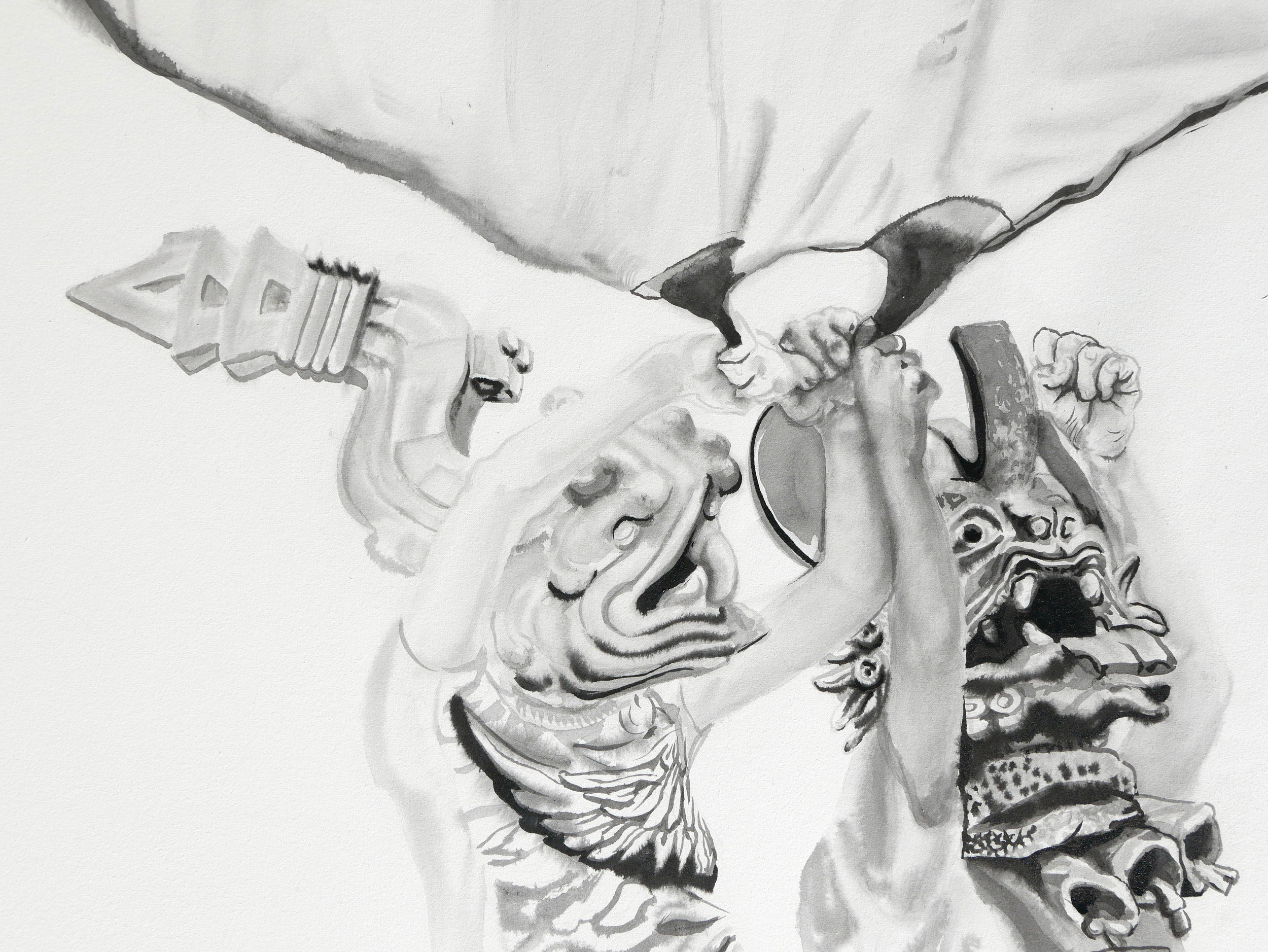
SOMEWHERE OVER THE BORDER 2018
Detail
Heavy children
tugged, then didn’t,
along the way.
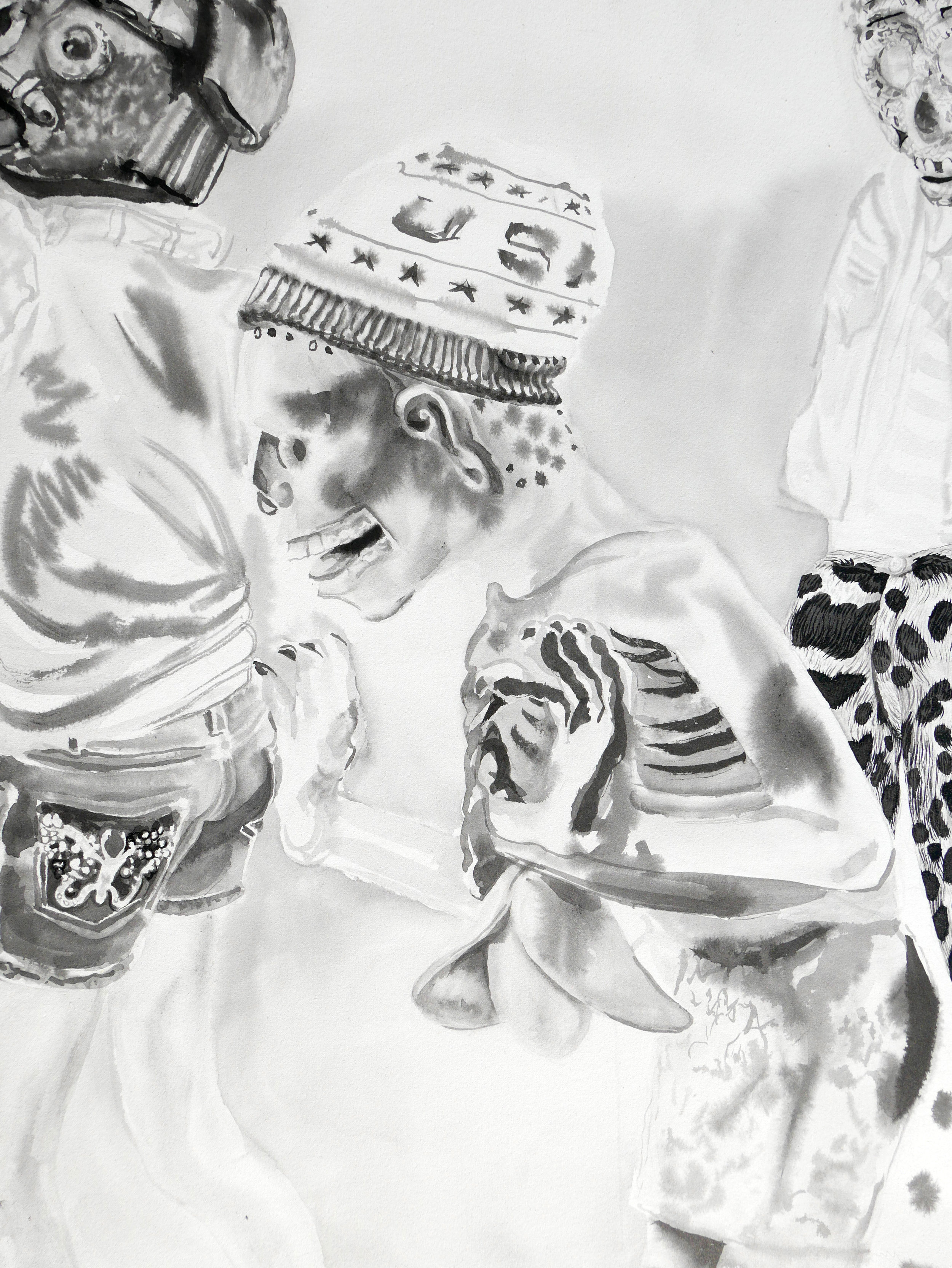
SOMEWHERE OVER THE BORDER 2018
Detail
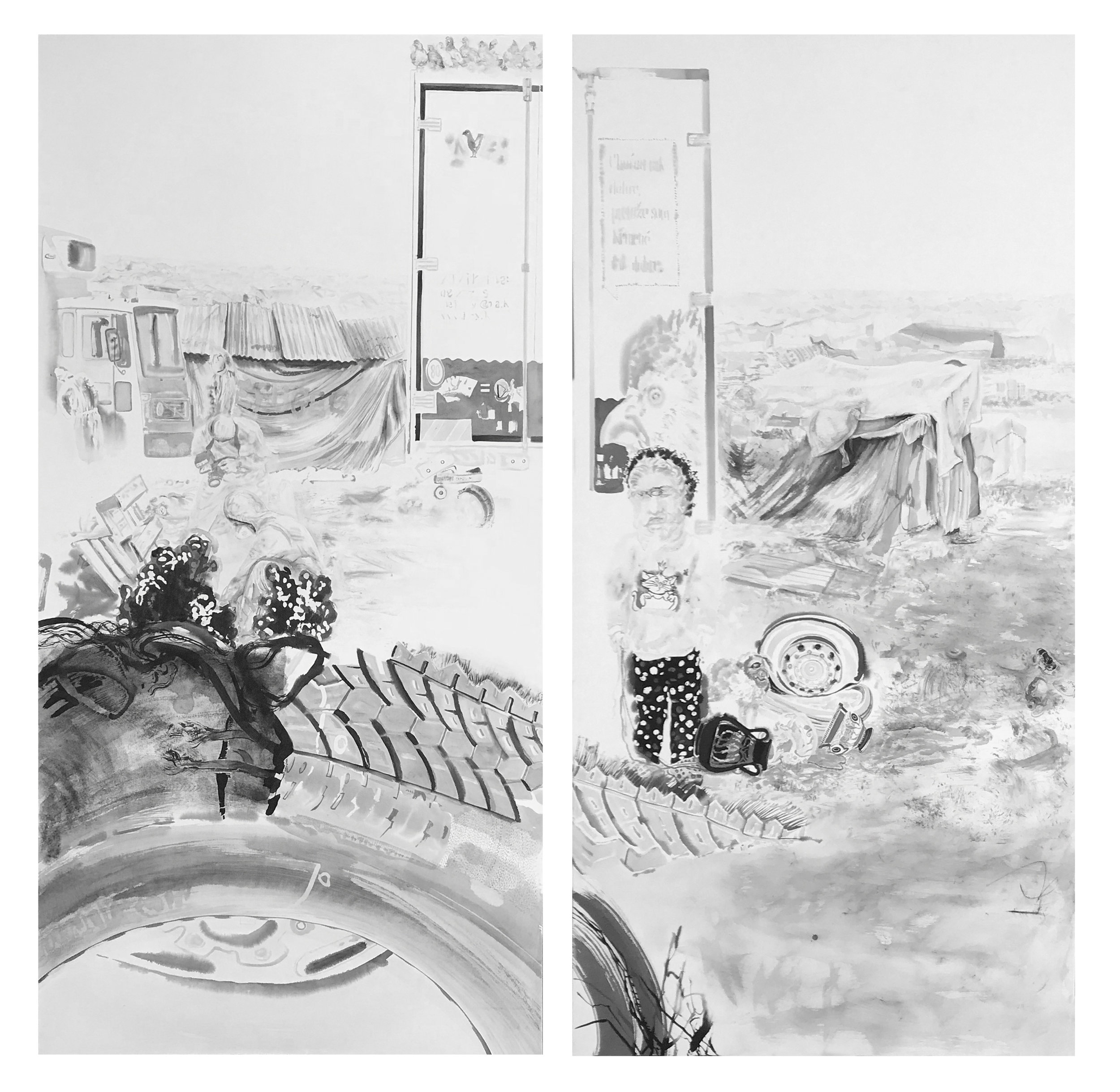
FUGUE, 2017
Ink and soluble graphite on paper, two panels, 84 x 42 inches each
One eye saw
monstrosities.
______________
Another quizzical find
was a cartoon cat
printed on a sweatshirt.
Its hair sprouts tied
by an elastic band;
its paws raised in submission.
The status of statelessness that defines ‘refugee’ is not bestowed, earned or desired; its costs are dear. Rather, statelessness is a branding that burns as it takes what was given at birth. It separates, distances, and makes ‘other’. The protection sought in flight is fraught, if secured at all. Integration into a host country is mostly a prolonged trial, typically thwarted, seldom achieved, and almost never satisfactory. In the meantime, so many are suspended in limbo, involuntarily residing in camps.
Only a fraction of the world’s refugees are resettled each year. Far from visibility, nearly half are confined to camps, remaining displaced for an average of seventeen years. Glimpses of refugee experience conveyed through the media are just that; they fail to reveal the depth of loss and longing for family, home and self-sufficiency. As in ancient myths and epics, novels like Jenny Erpenbeck's Go, Went, Gone and the Refugee Tales collection, modeled on Chaucer's Canterbury Tales, tell fuller stories of the perils of flight and return. Odysseus, himself, escaped from the Cyclops by clinging to and hiding under the belly of a sheep. Migrants today cling to tops of trains and undersides of trucks, risking their lives as they try to save their lives.
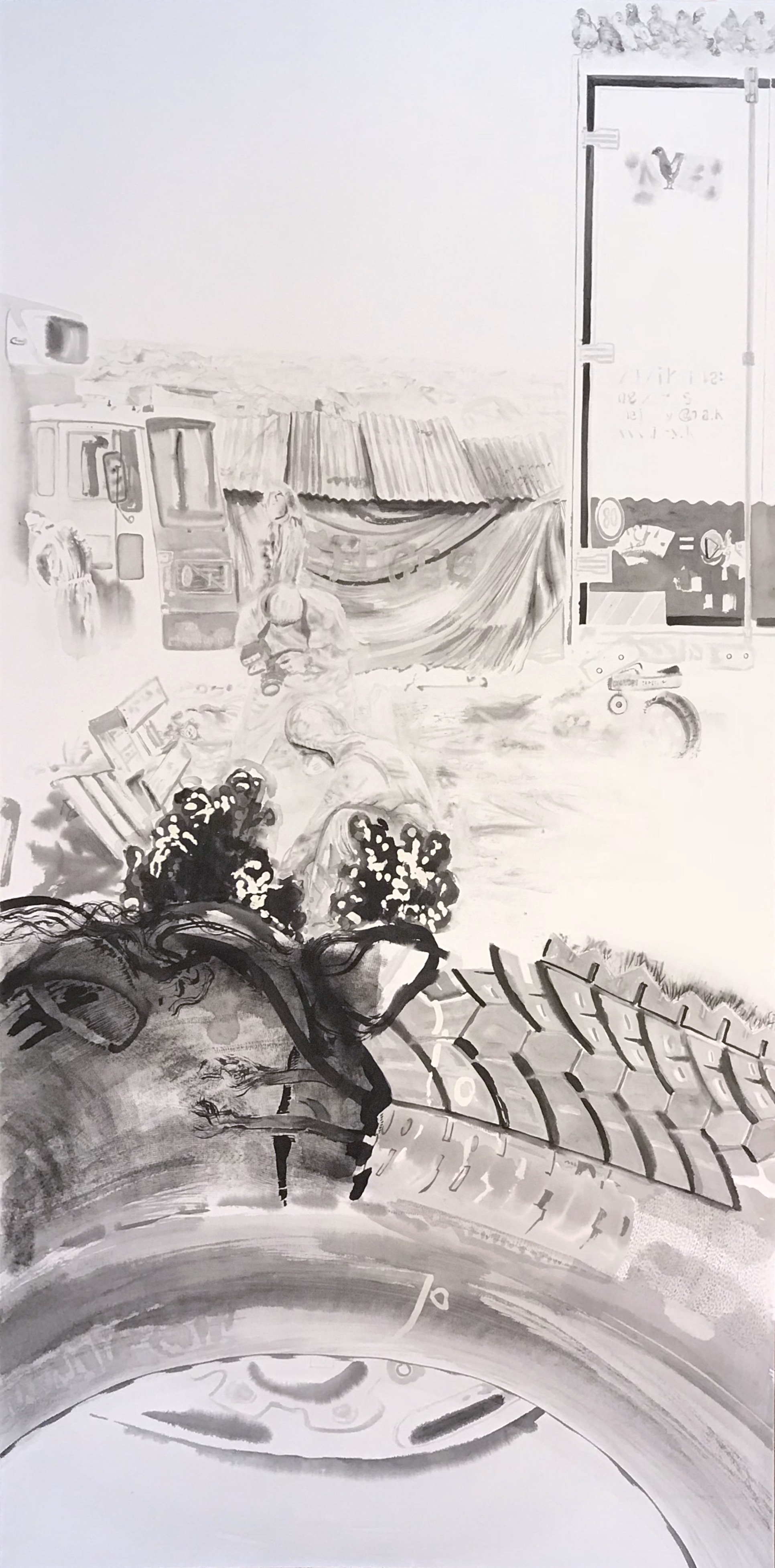
FUGUE, 2017
Left panel, Ink and soluble graphite on paper, two panels, 84 x 42 inches
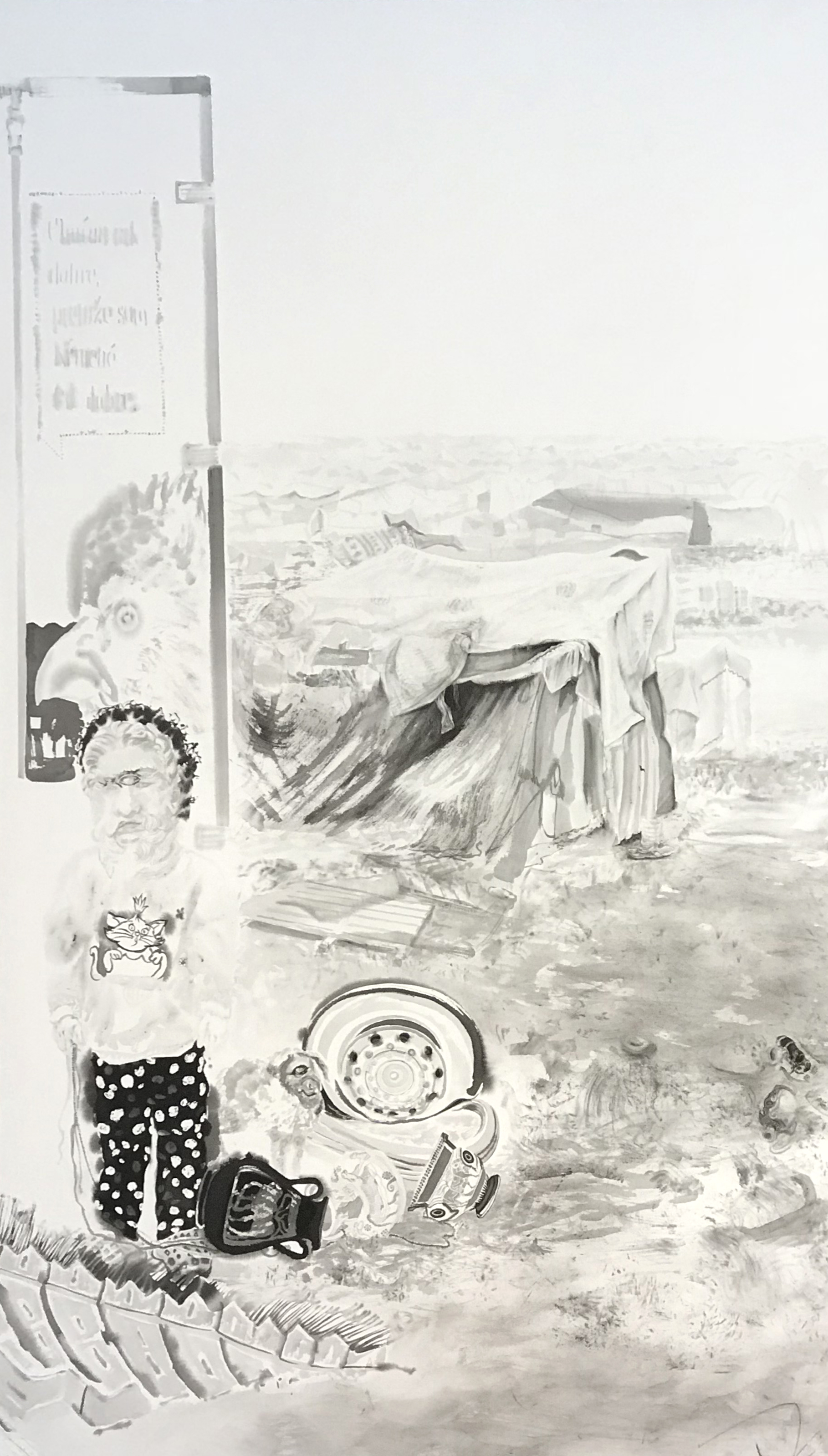
Detail of FUGUE
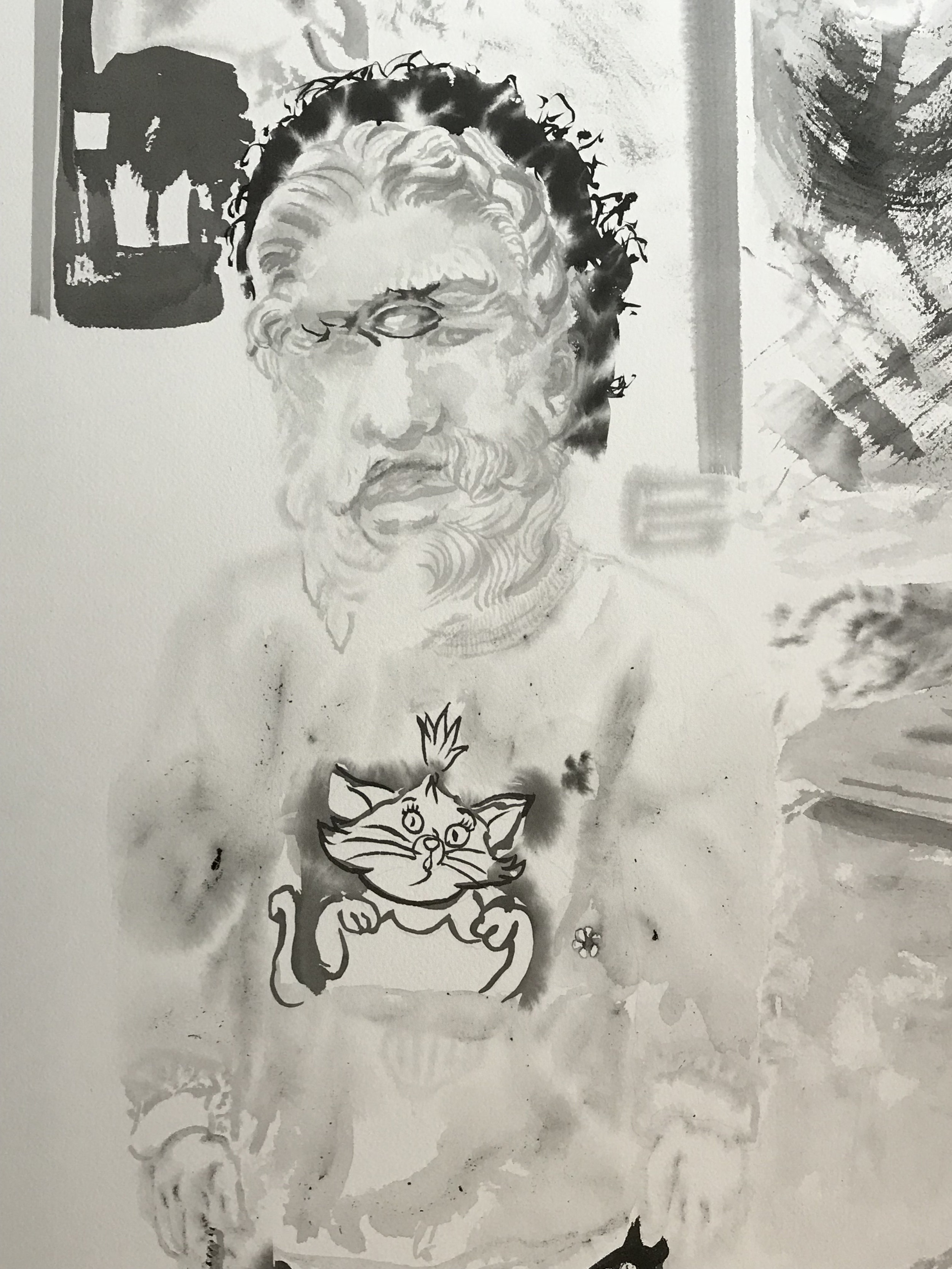
Detail of FUGUE
Another quizzical find
was a cartoon cat
printed on a sweatshirt.
Its hair sprouts tied
by an elastic band;
its paws raised in submission.
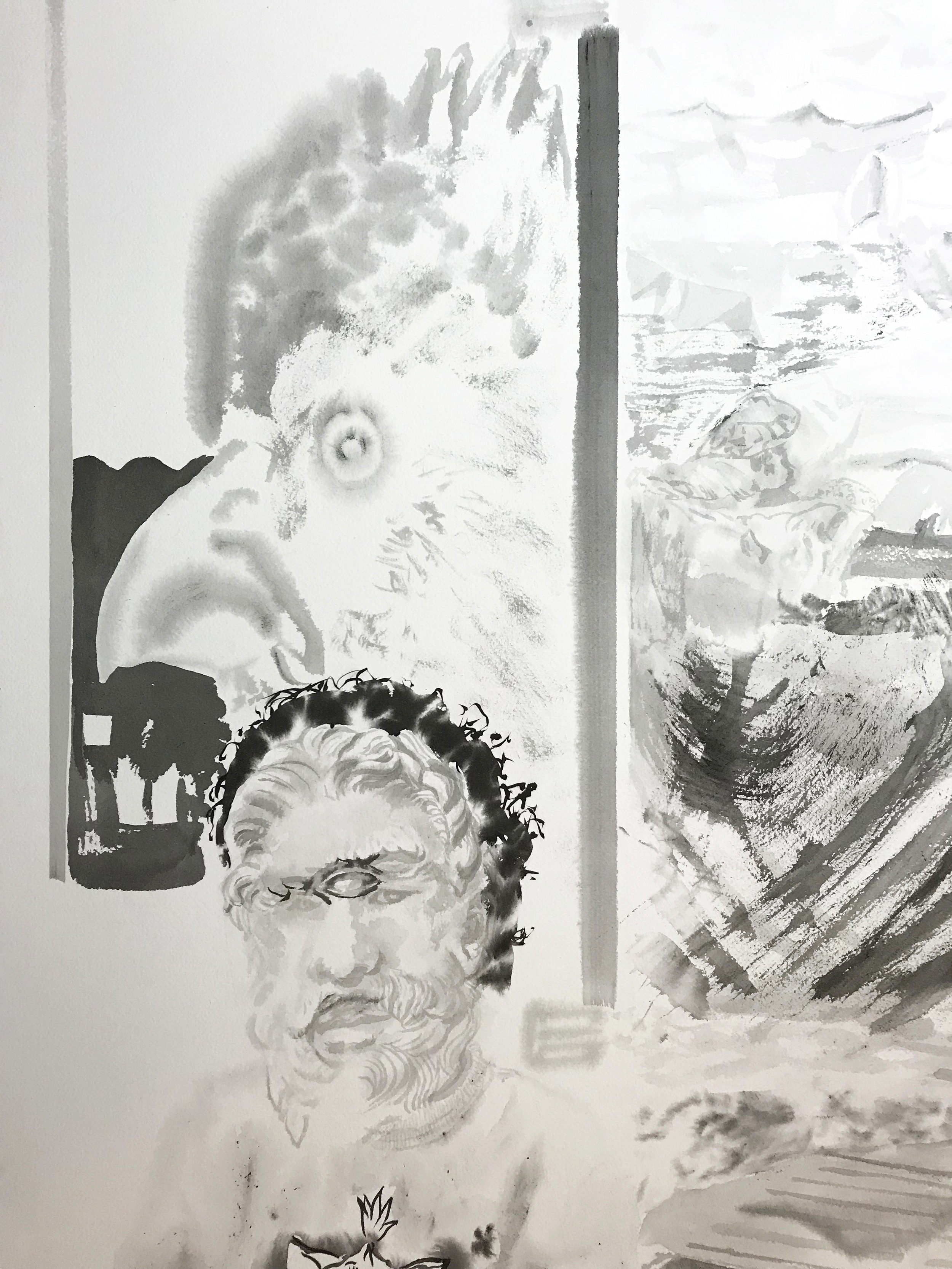
Detail of FUGUE
One eye saw
monstrosities.
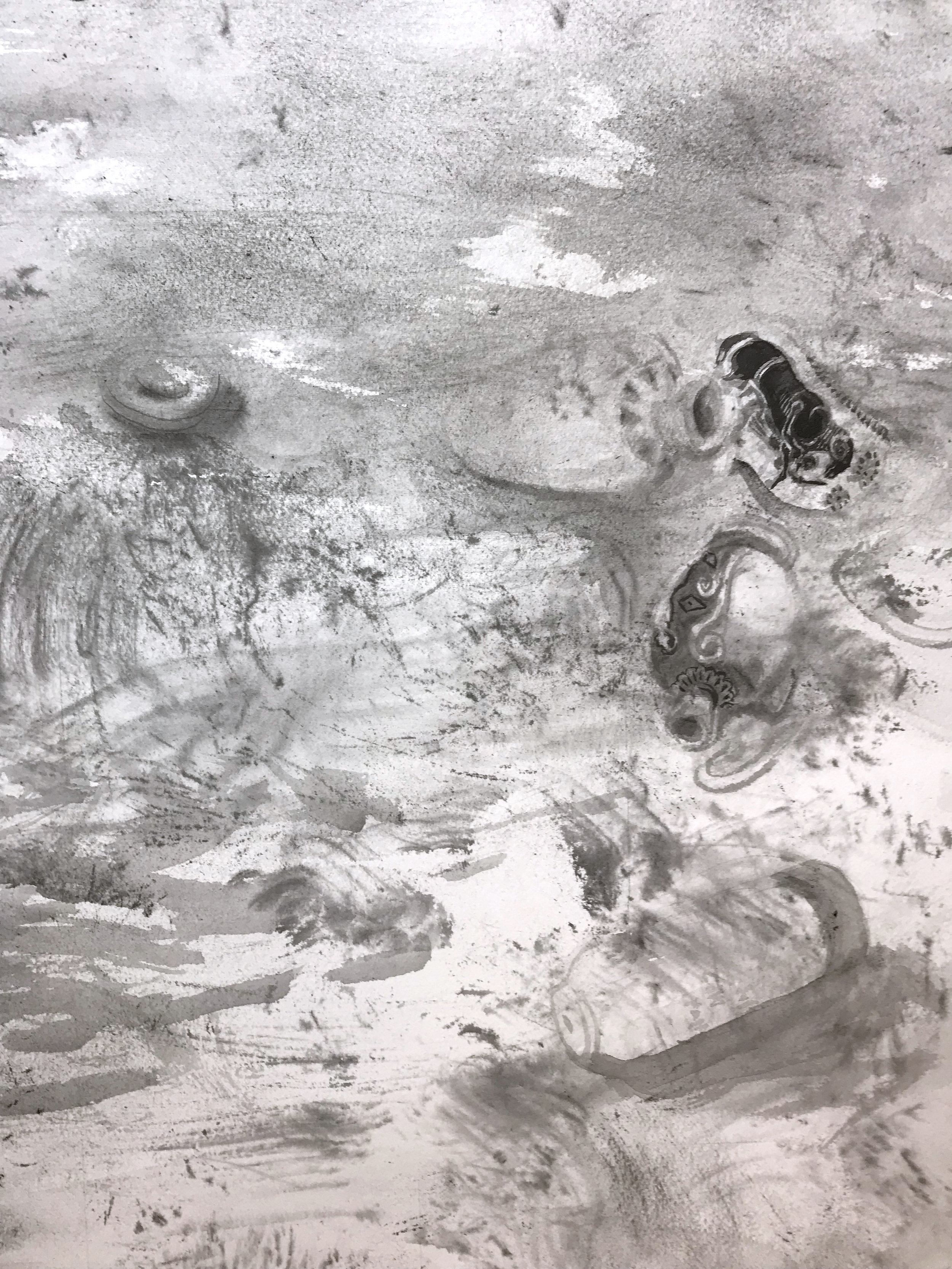
Detail of FUGUE
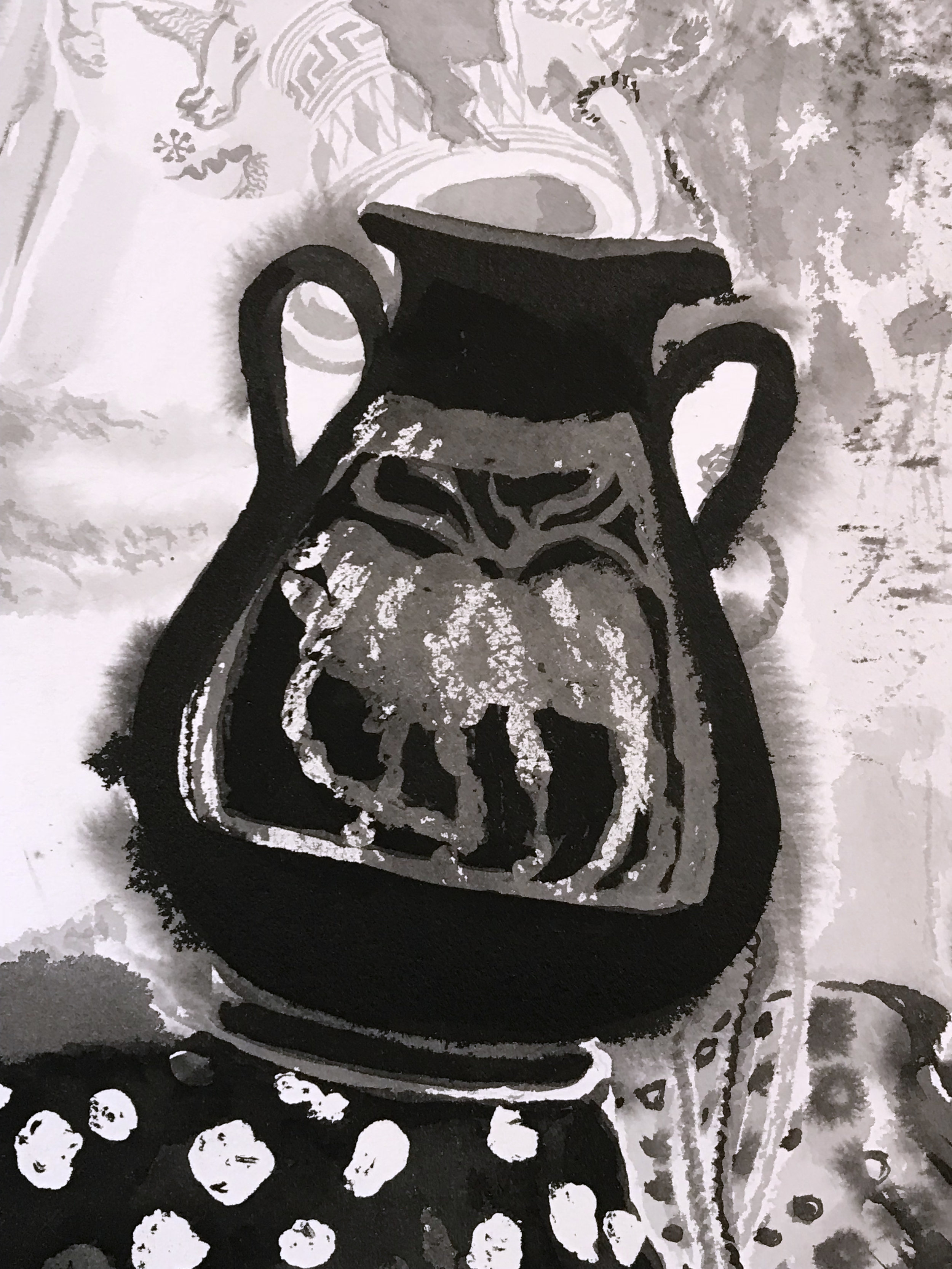
Detail of FUGUE
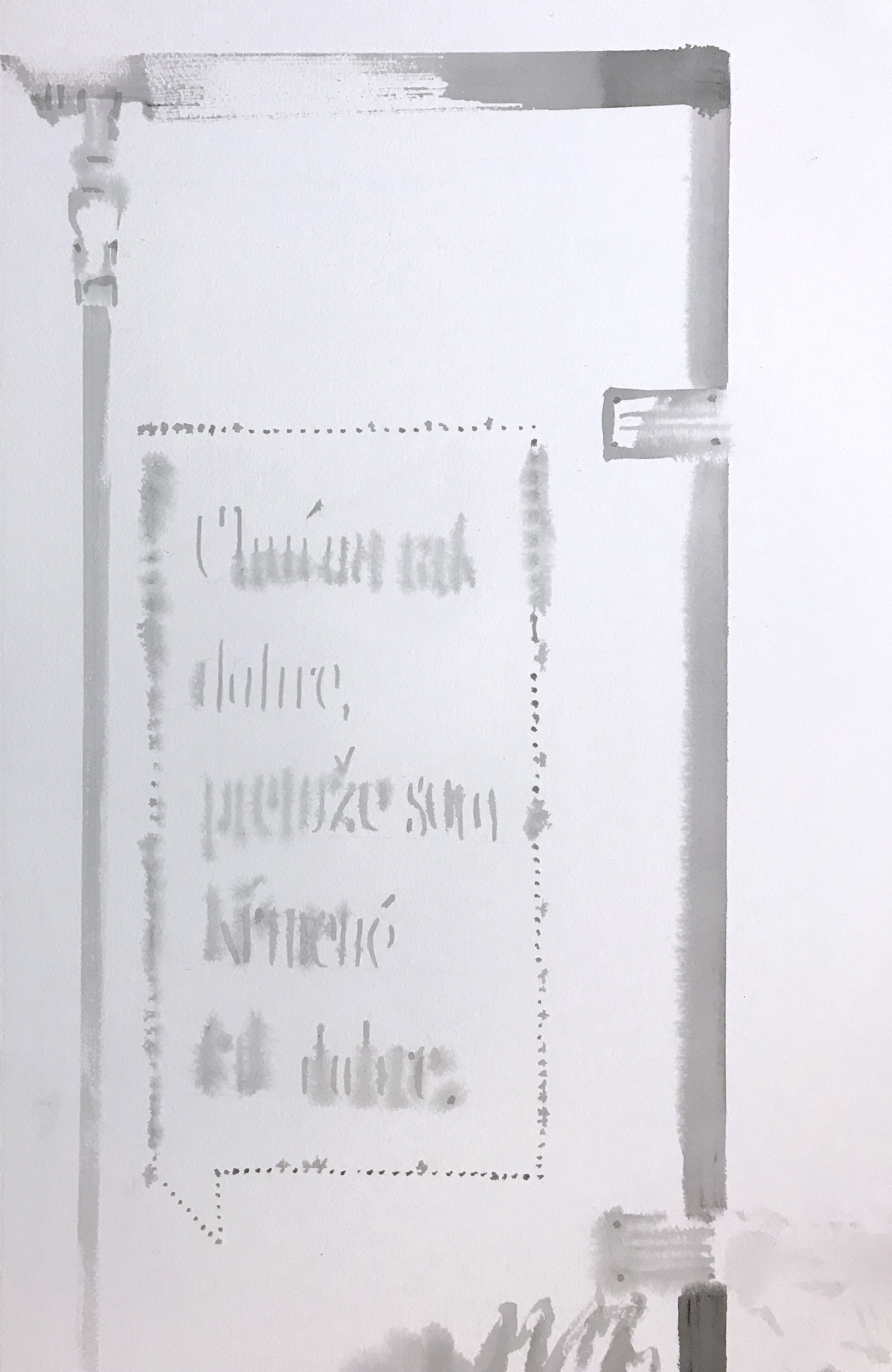
Detail of Fugue (truck door)
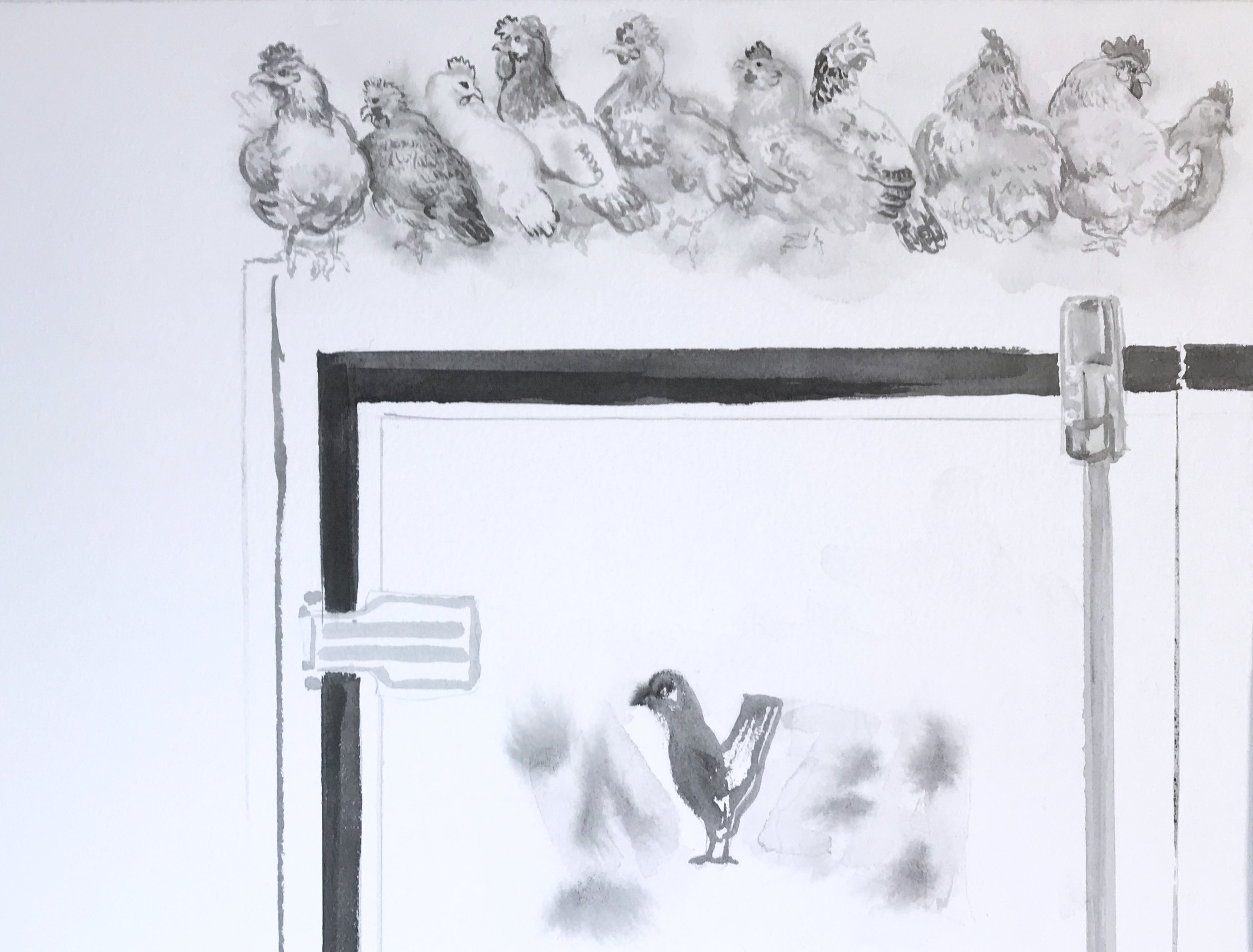
Detail of FUGUE
(birds on top of truck)
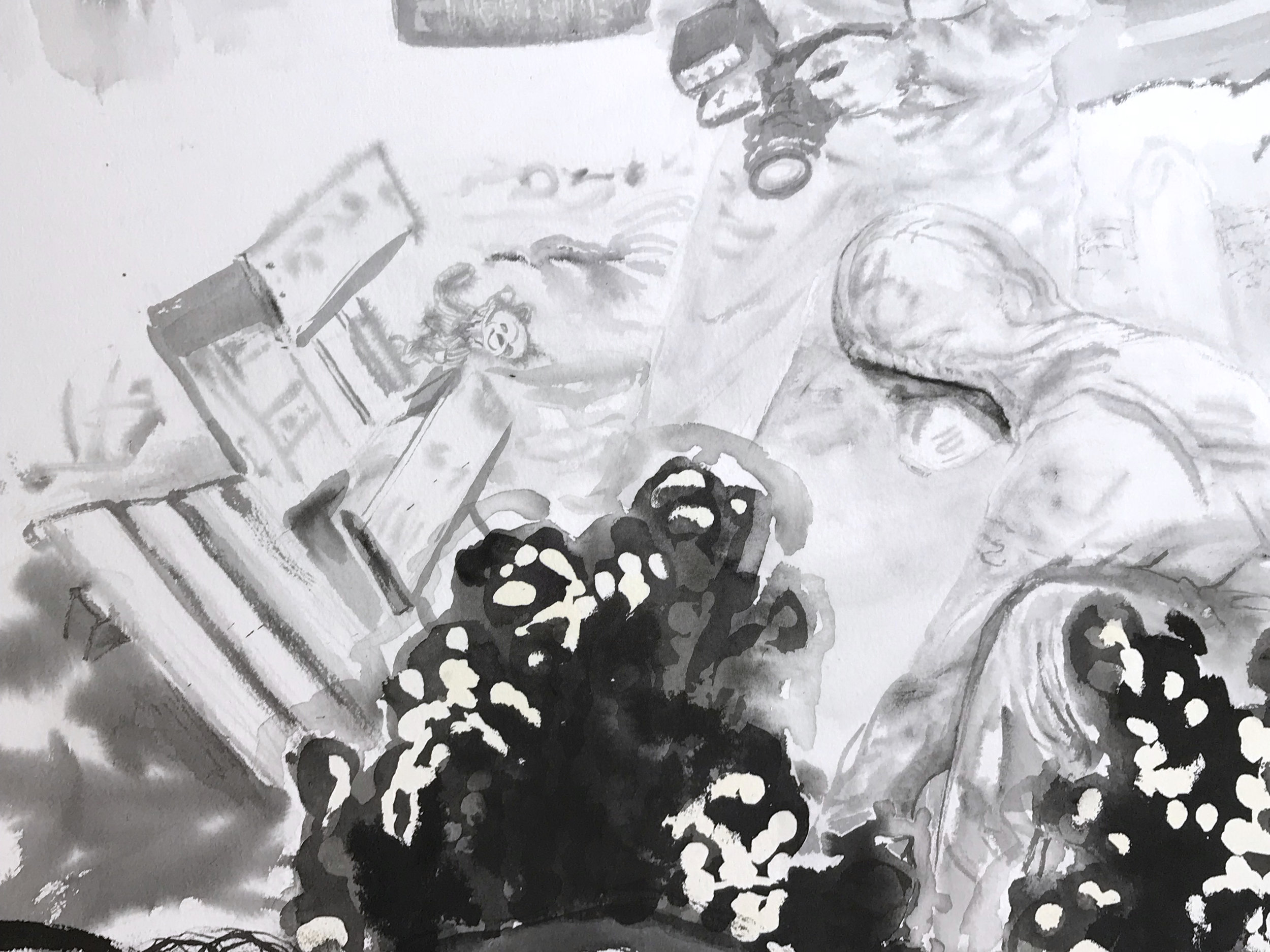
Detail of FUGUE
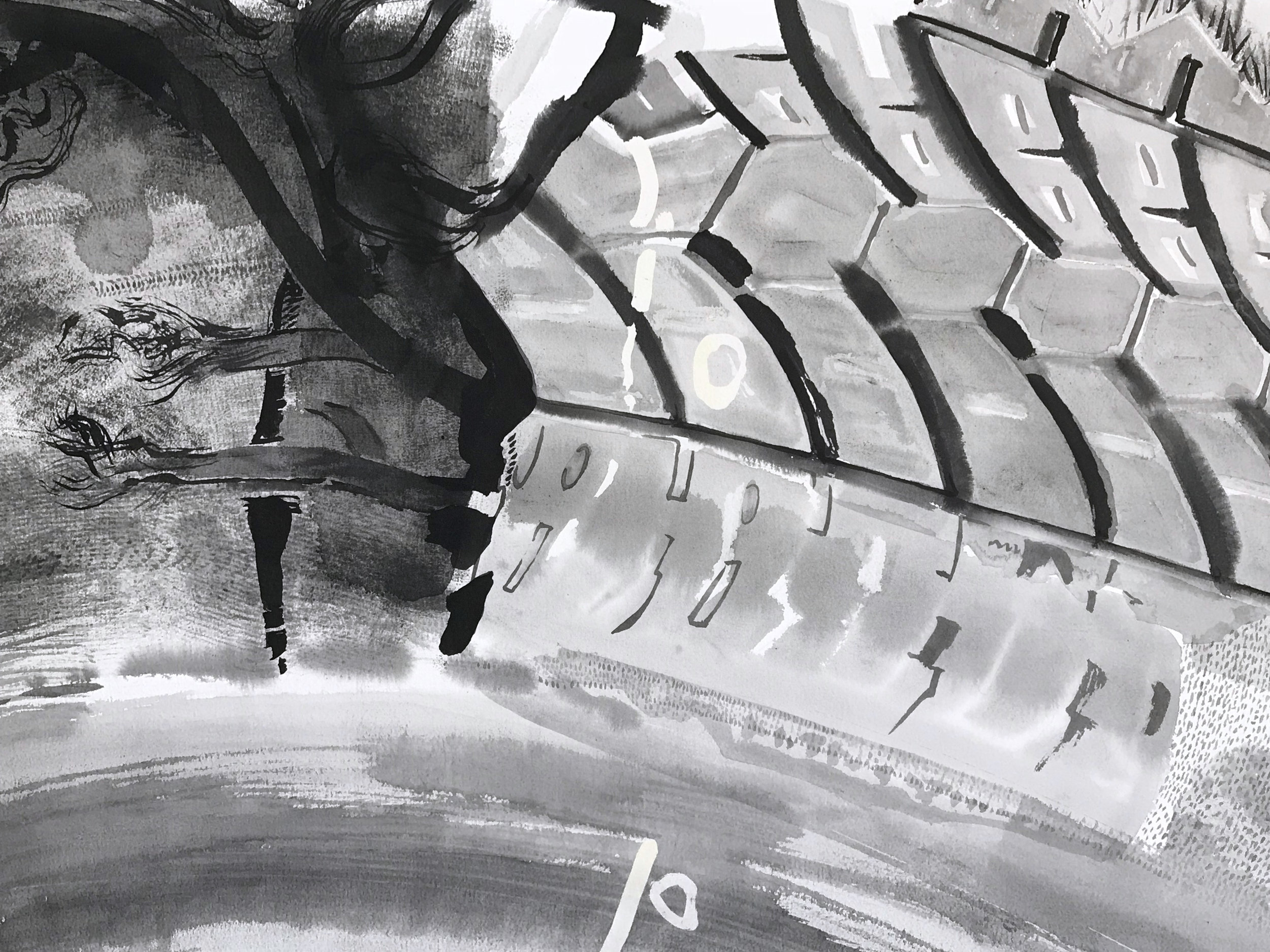
Detail of FUGUE (tire)
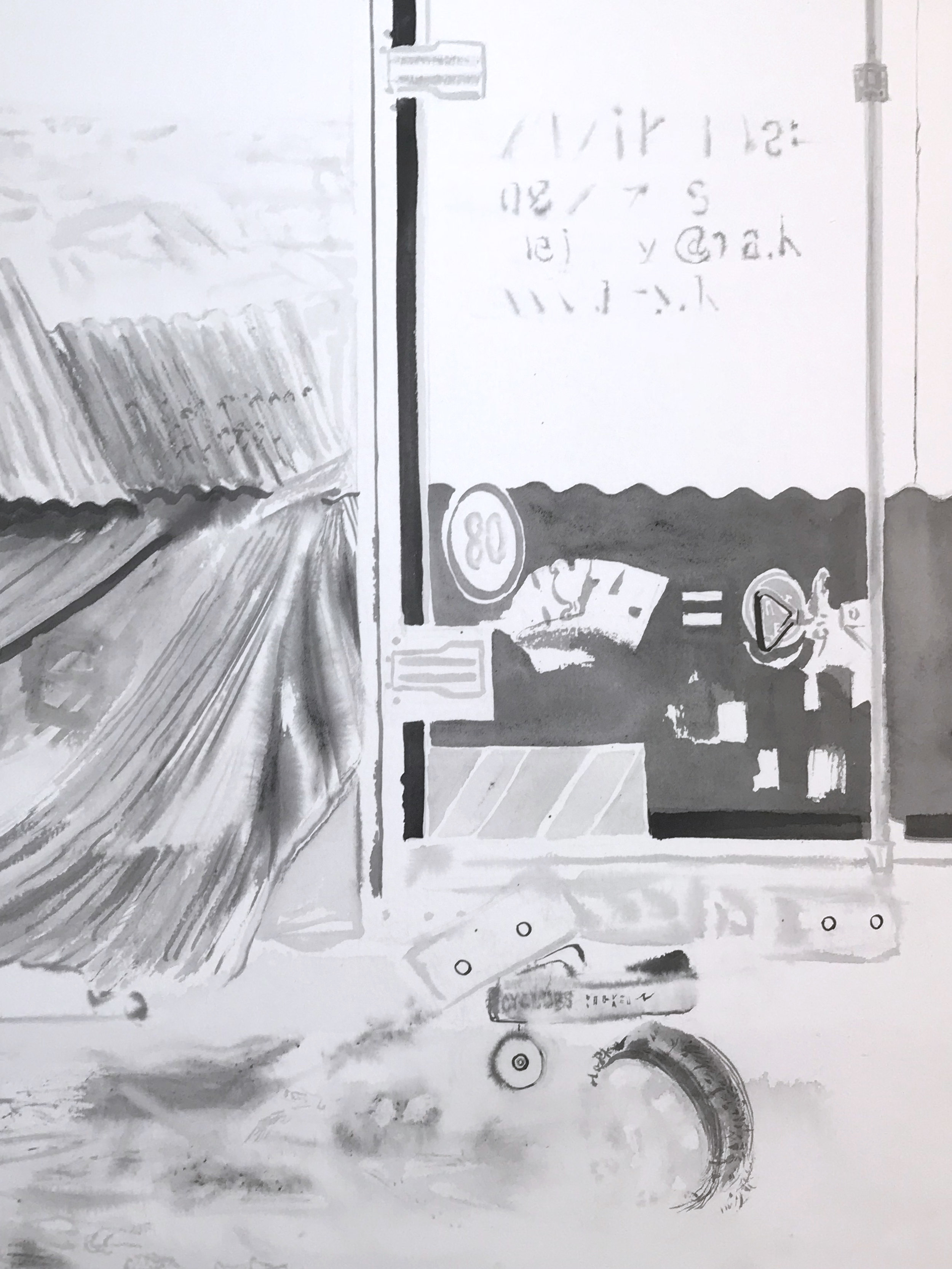
Detail of FUGUE
Numbers, letters,
ascribed.
Coming, going,
proscribed.
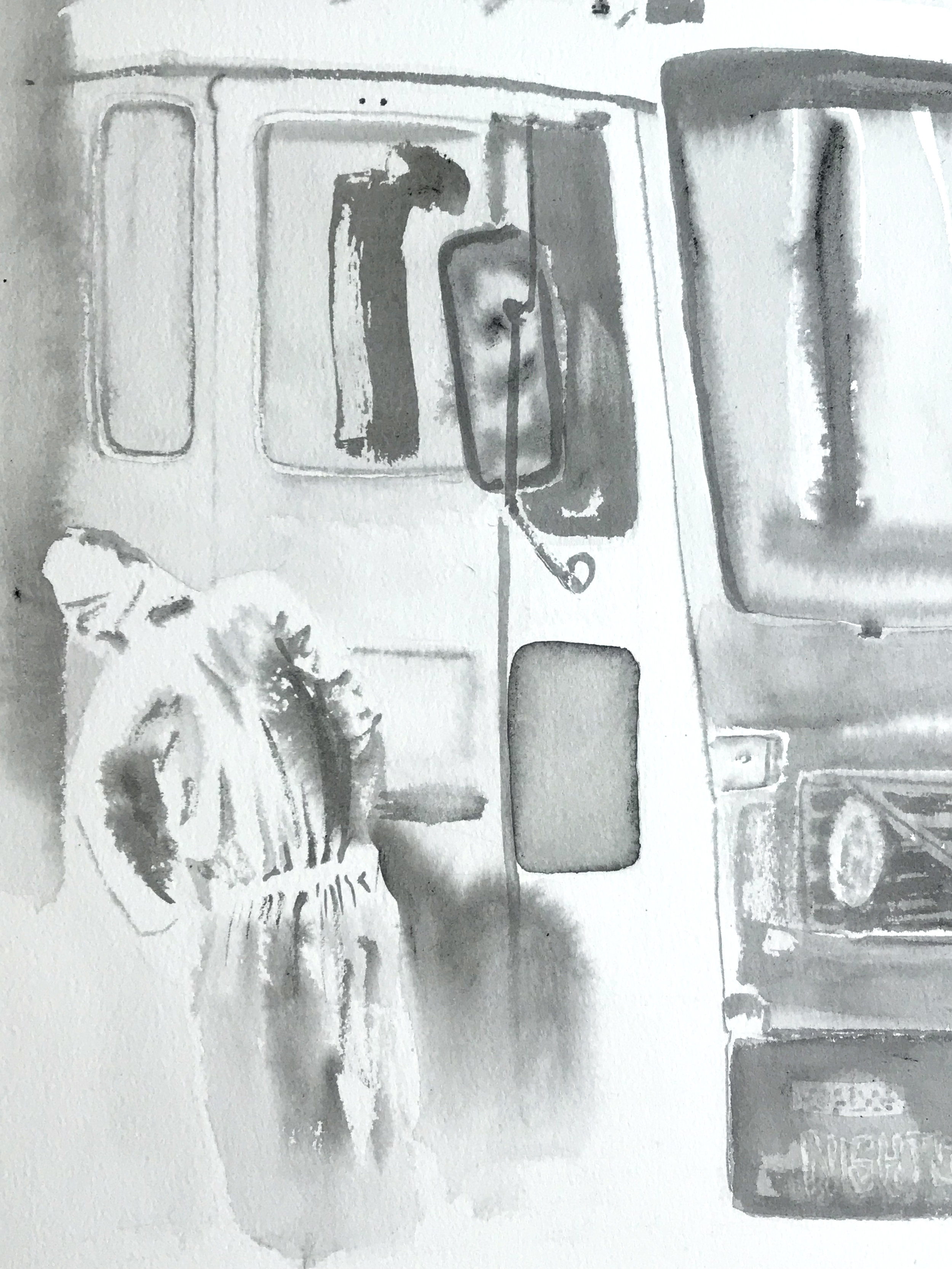
Detail of FUGUE
Holding their breath,
photographers
unlatched the door.
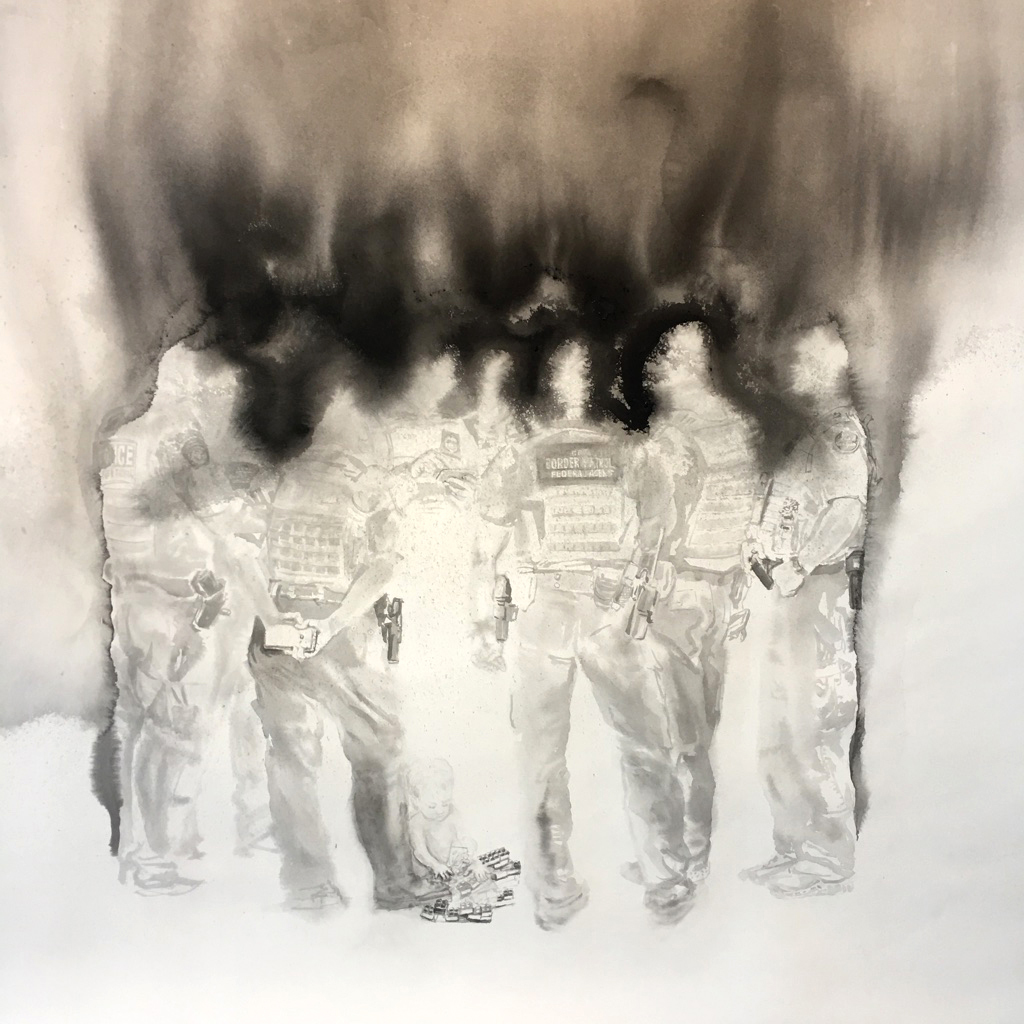
NATIVITY 2019
Detail
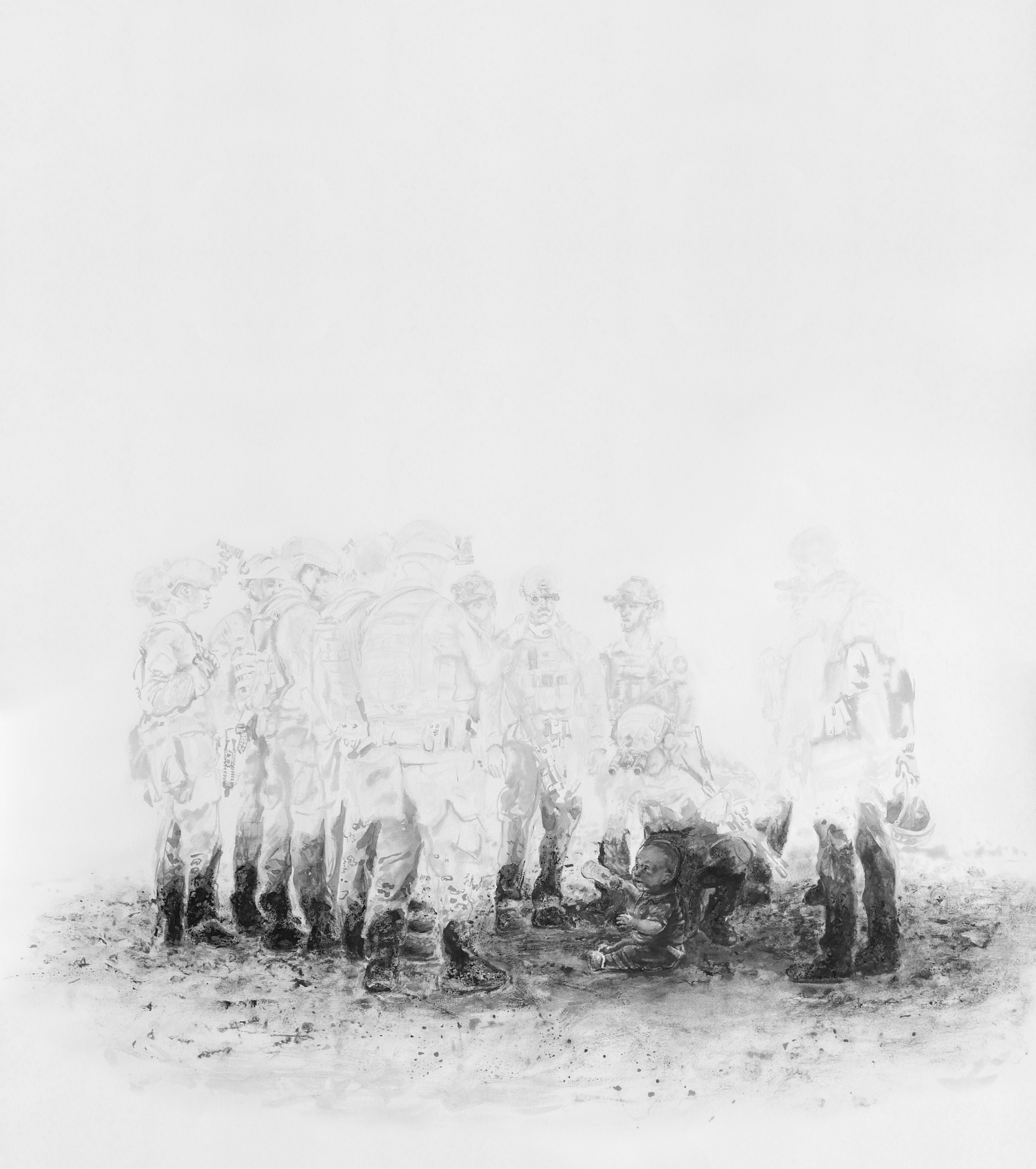
NATIVITY II, 2019
ink and wax on paper, 43 x 38 inches
The wise men
traveled by starlight.
They didn’t offer
toothbrushes,
soap or food.
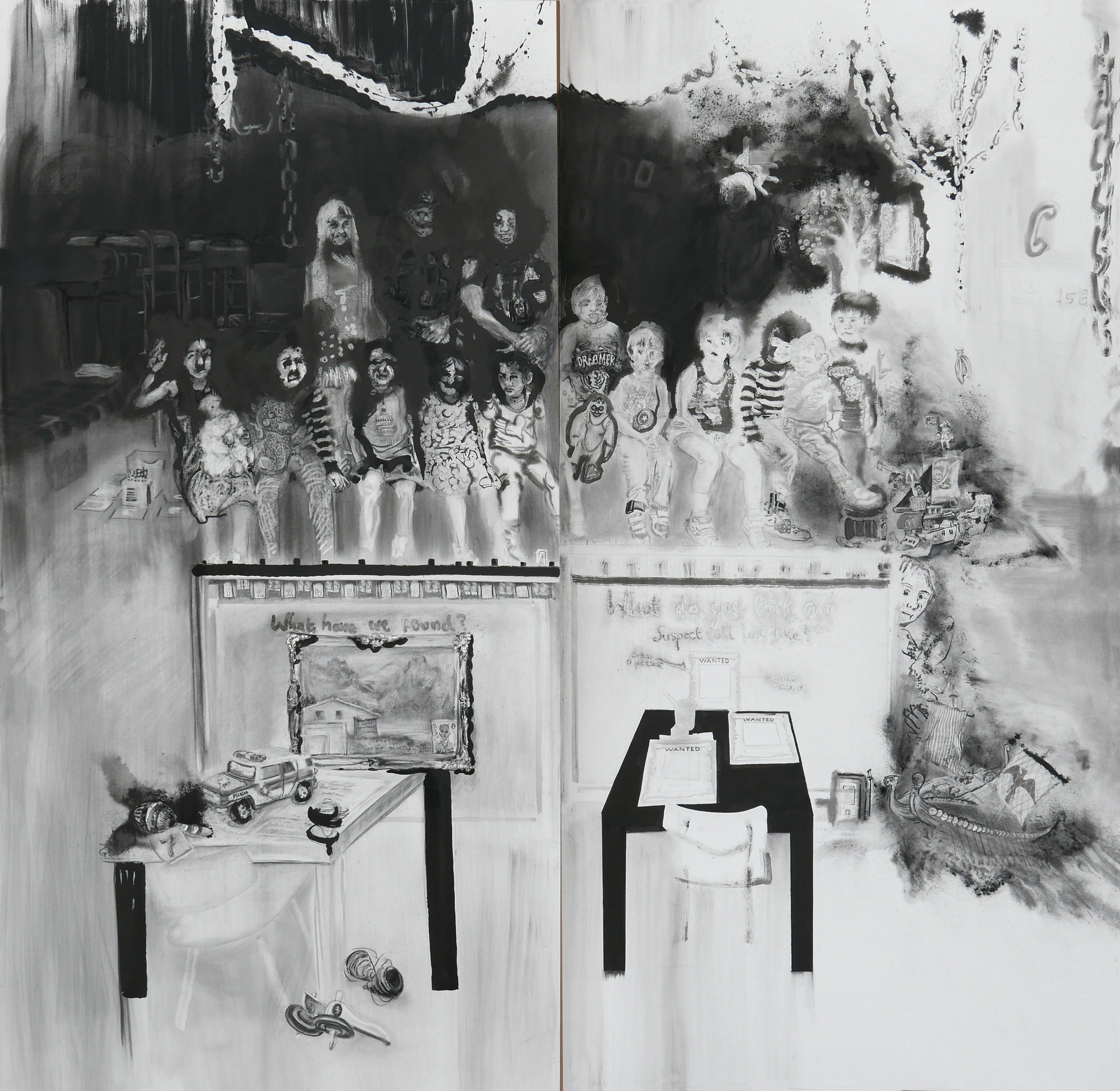
The ICEman Cometh 2018
Ink, charcoal, wax, graphite, 84 x 84 inches
They donated to inaugural balls and political action committees and further expanded their contracts for private for-profit prison chains.
In 2016, Deputy Attorney General Sally Yates announced the end of the Federal Bureau of Prisons’ use of private prisons.
They decorated big box chain stores with Pokemon posters to make “family-friendly facilities.”
Before April 2018, asylum seekers were generally not prosecuted. Neither were people who came to the US with their children.
They downplayed the cages for migrant children, comparing them to chain-link fences “around playgrounds all over America.”
On June 18, Attorney General Jeff Sessions claimed family separation was ‘necessary’ to keep the country from being ‘overwhelmed.’
They held hands and linked arms in human chains to prevent the placement of children in detention centers, until the police arrived. They were handcuffed as they were arrested.
As of June 26, 2018, non-violent civil disobedience remains a punishable exercise of First Amendment rights.
They tried to weaken a link in the authoritarian chain.
On June 26, 2018, an injunction at the request of the ACLU was granted to reunite children with their parents within 30 days, but the government has no clear process to comply.
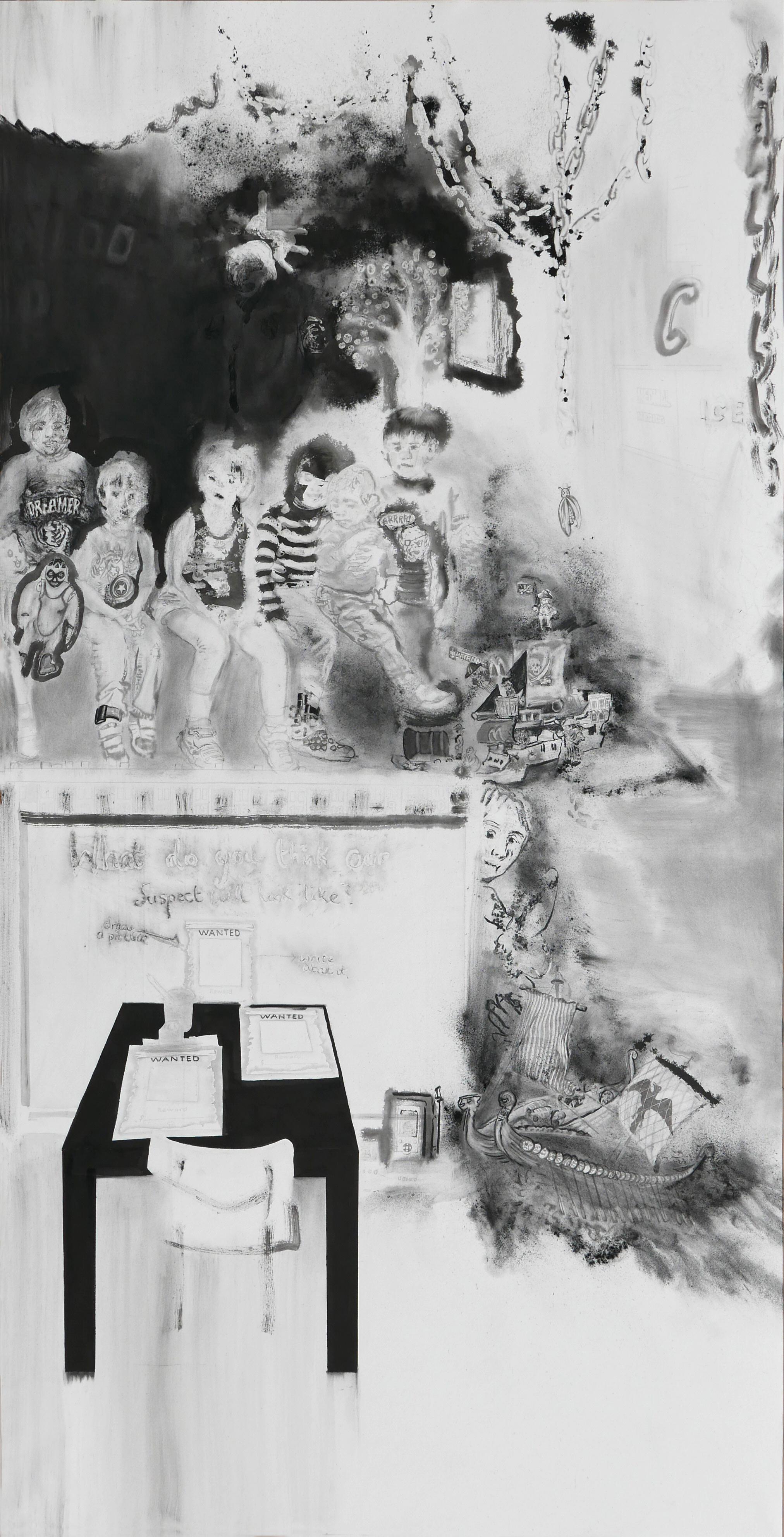
The ICEman Cometh, 2018 right panel
Ink, charcoal, wax, graphite, 84 x 84 inches
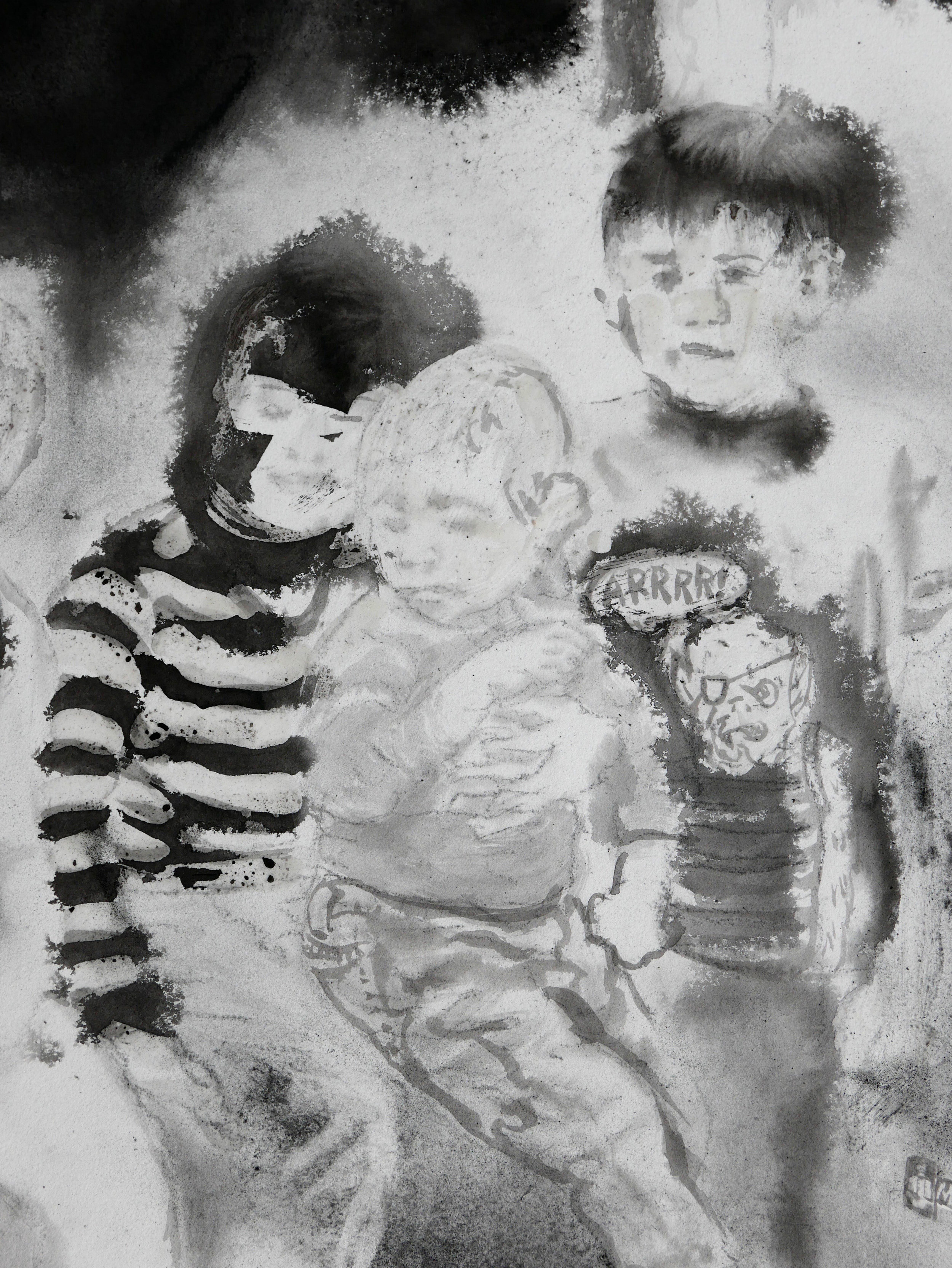
Detail The ICEman Cometh

Detail, The ICEman Cometh
The happier narratives of immigration that we tell our children….
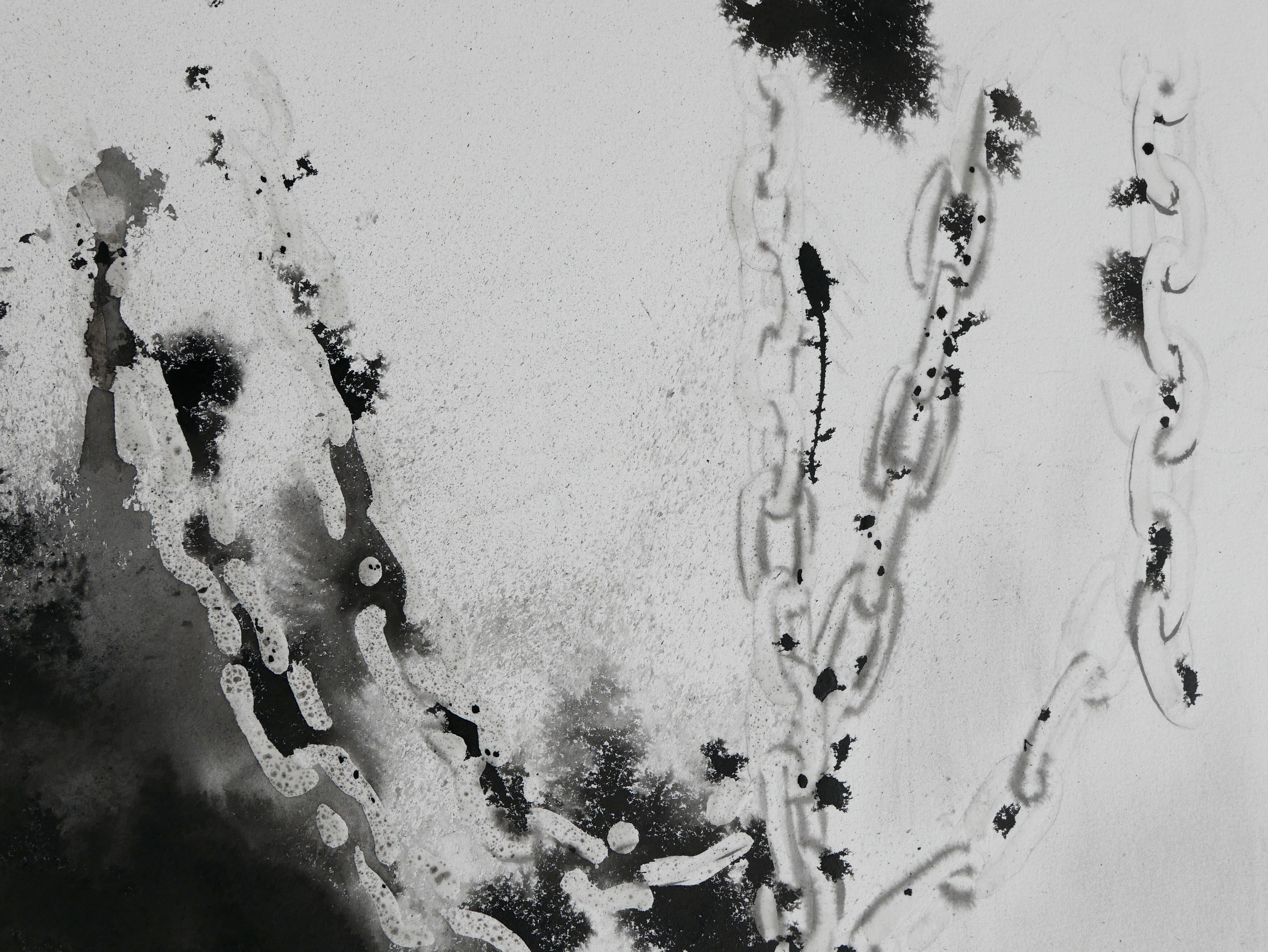
Detail The ICEman Cometh, 2018
Festive decorations for detention centers….
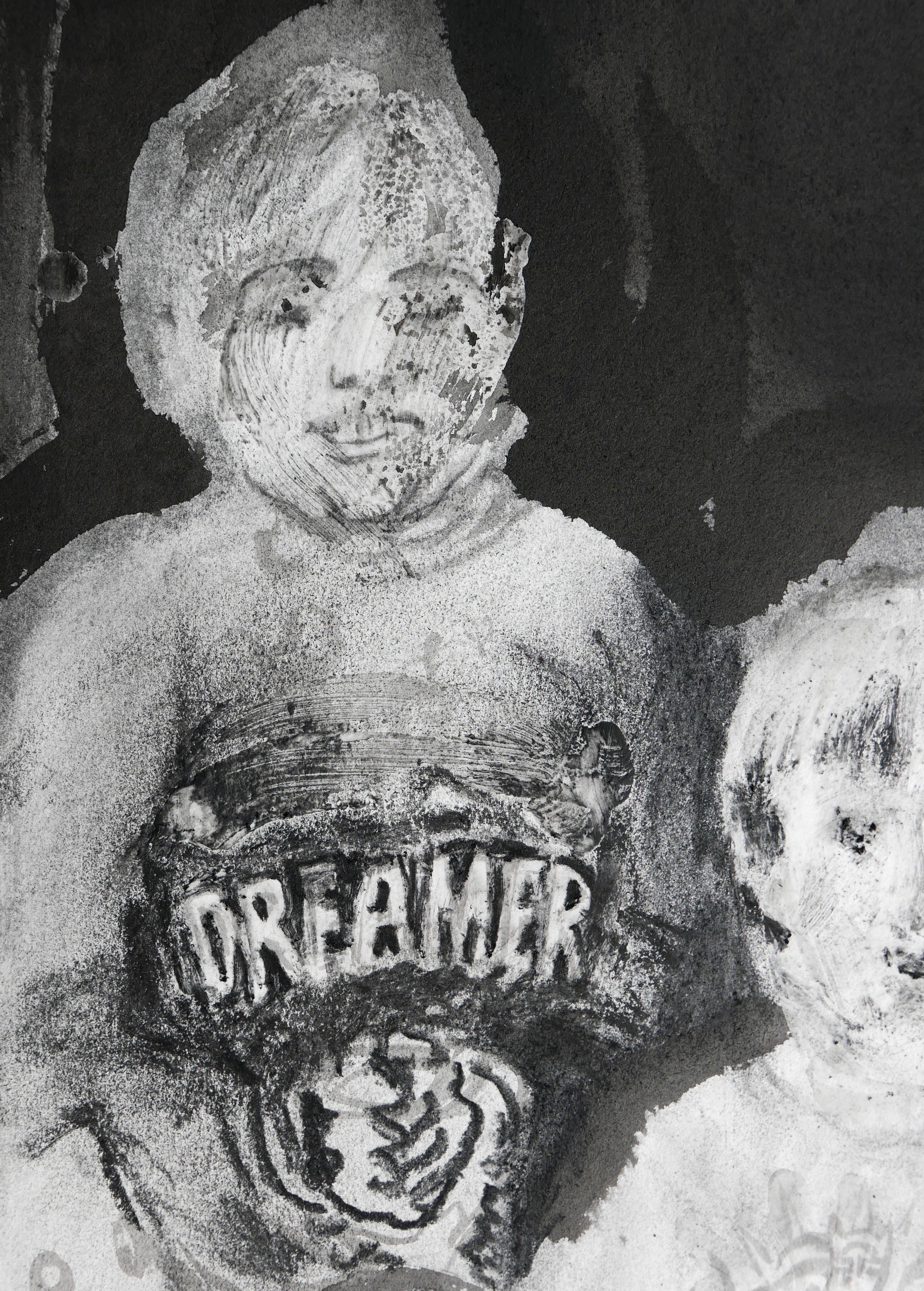
Detail The ICEman Cometh, 2018
Dreamers
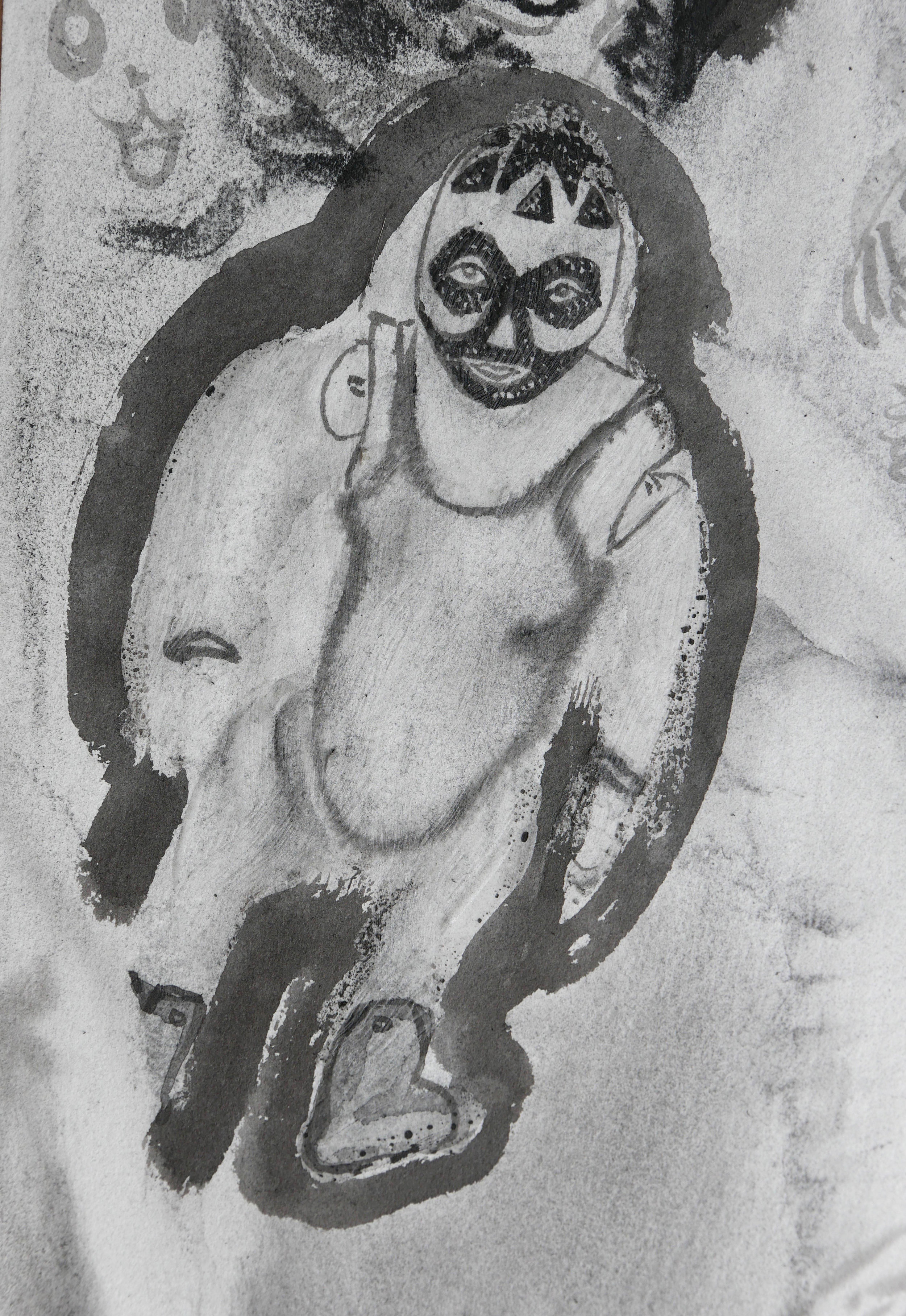
Detail The ICEman Cometh, 2018
Lucha Libre toy (the term used in Mexico for professional wrestling)

Detail The ICEman Cometh, 2018
Commercialization of emigration narratives via fast food toys
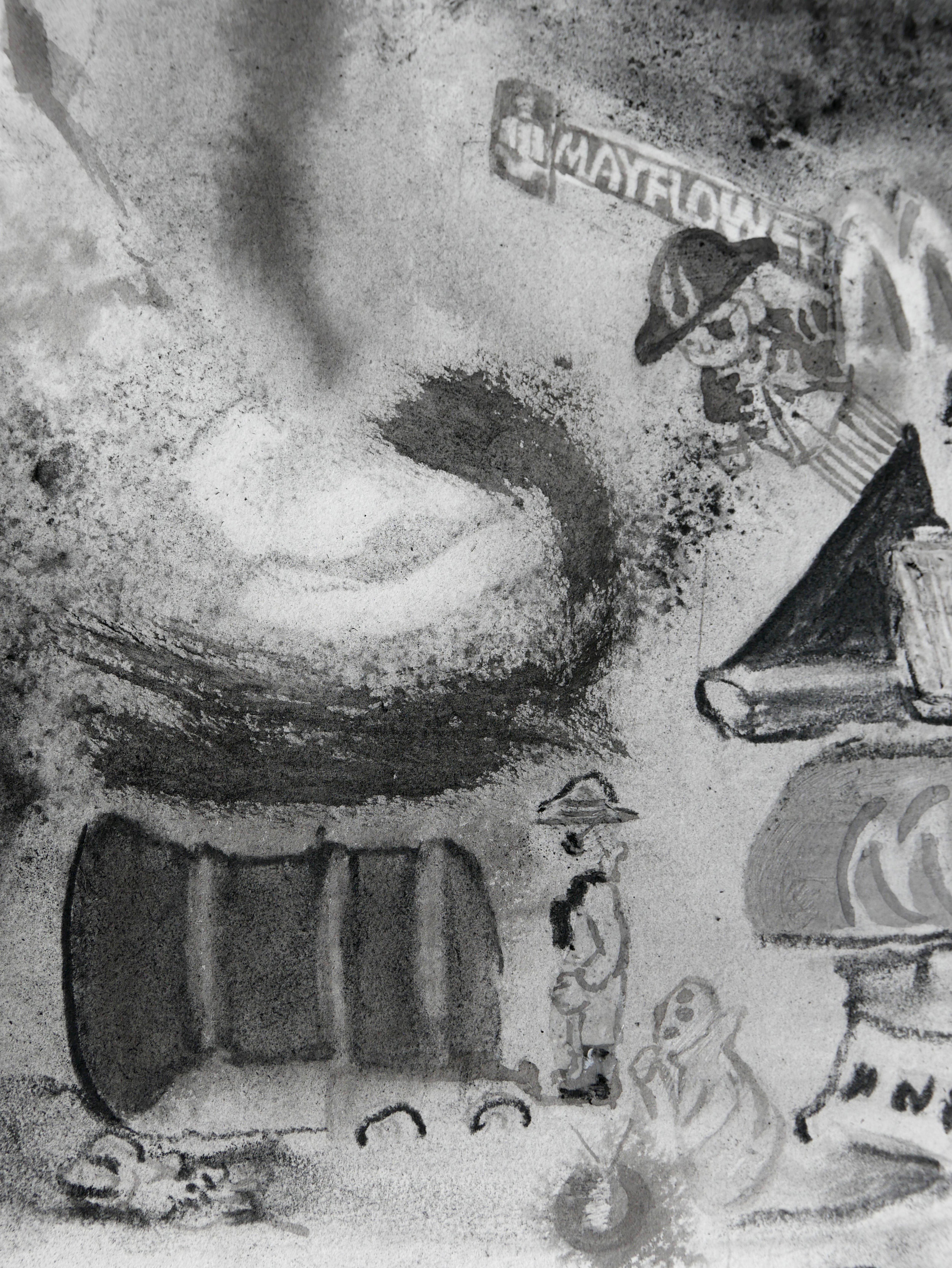
Detail The ICEman Cometh, 2018
Commercialization of emigration narratives via fast food toys
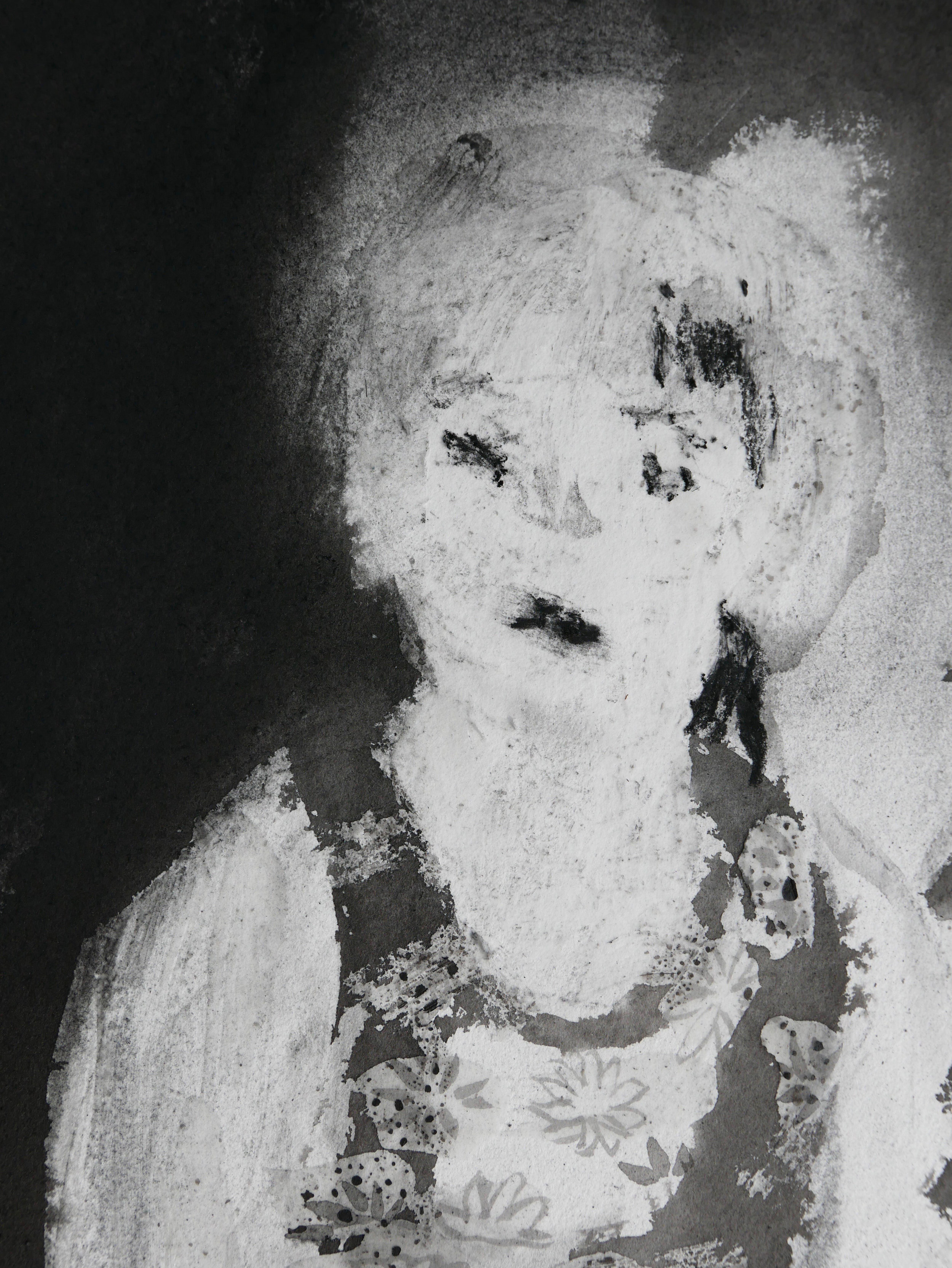
Detail The ICEman Cometh, 2018
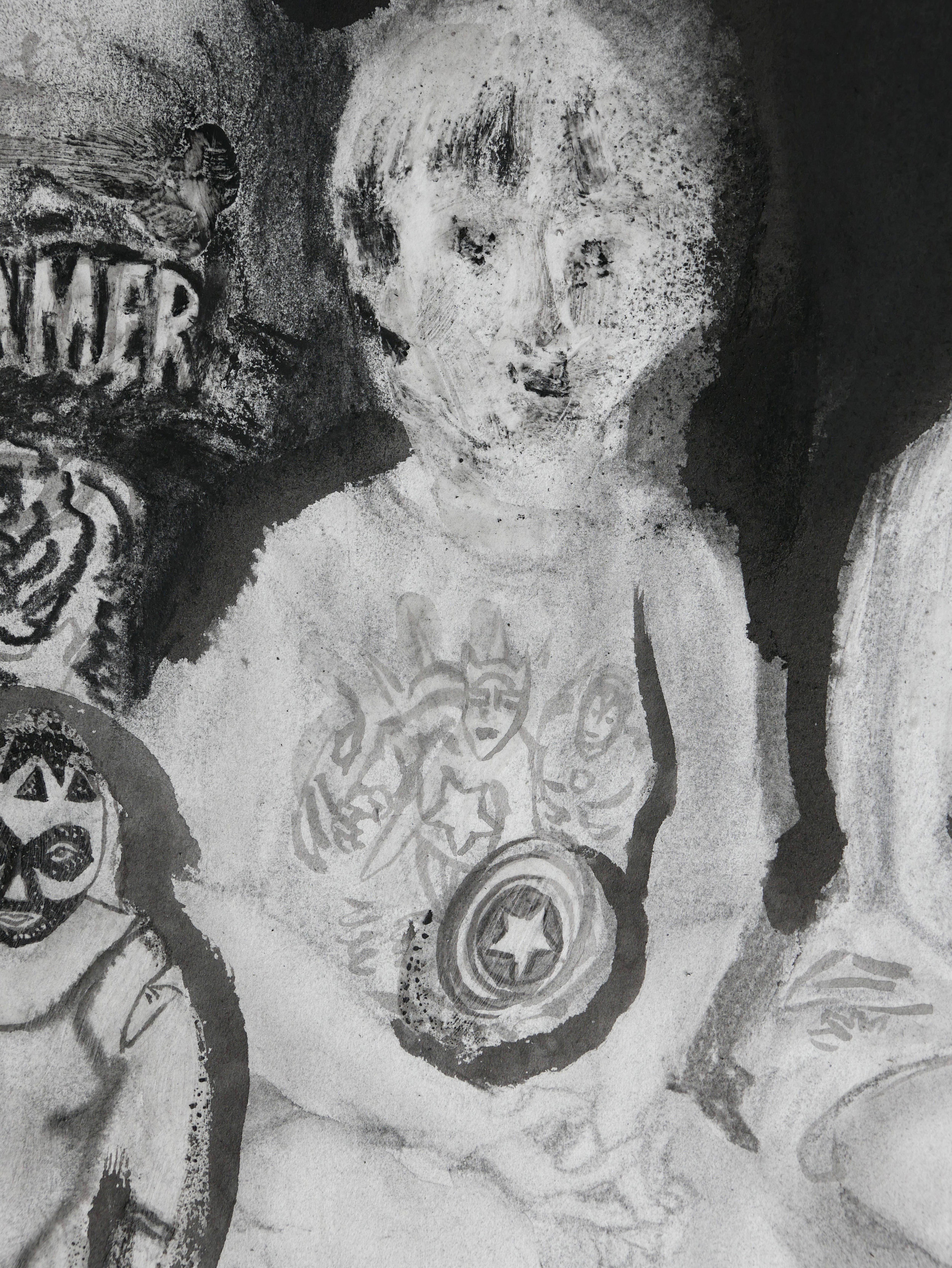
Detail The ICEman Cometh, 2018
Dreamer with Captain America T-shirt
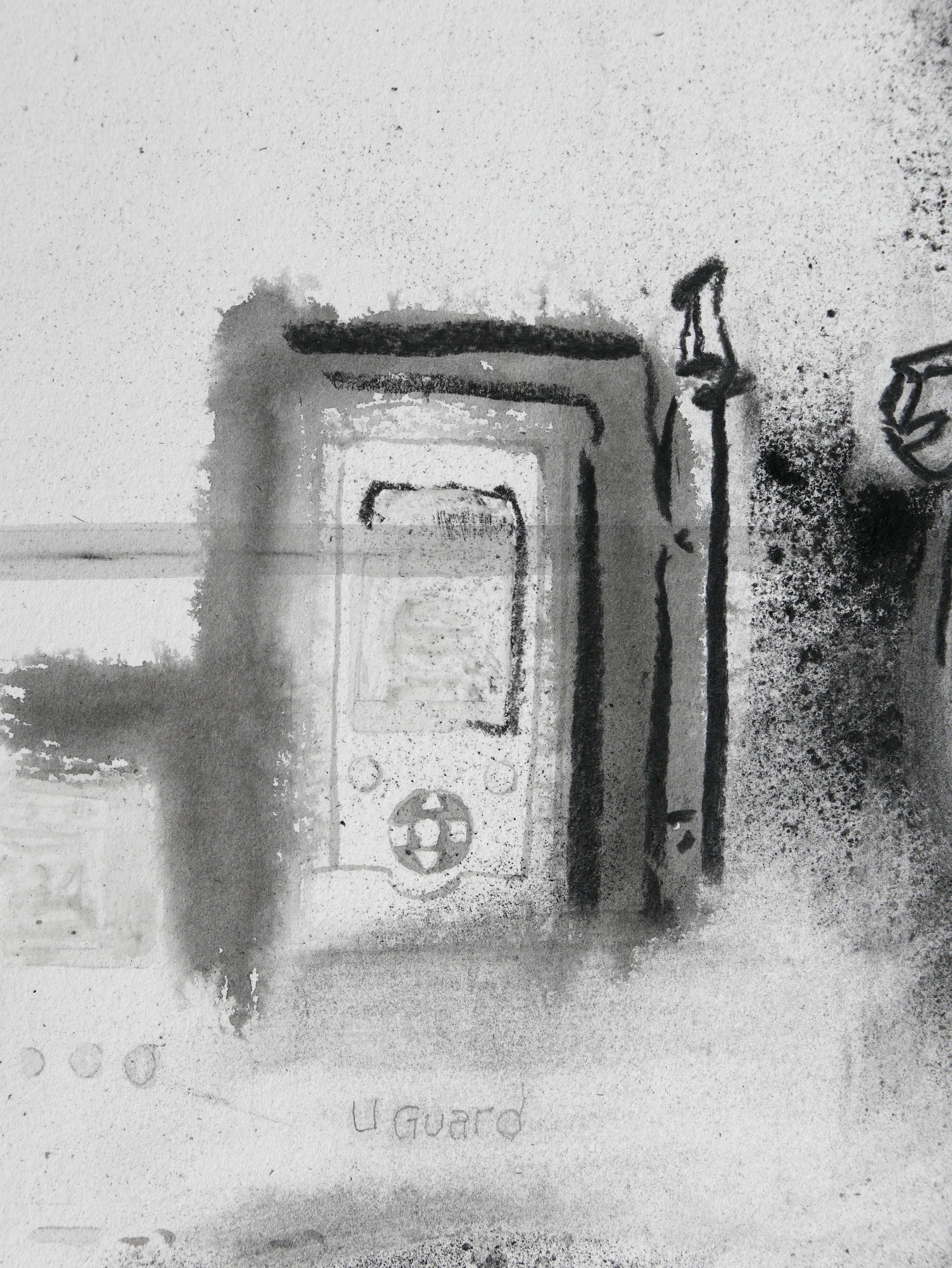
Detail The ICEman Cometh, 2018
Detention center tracking device

Detail COMETH 2018
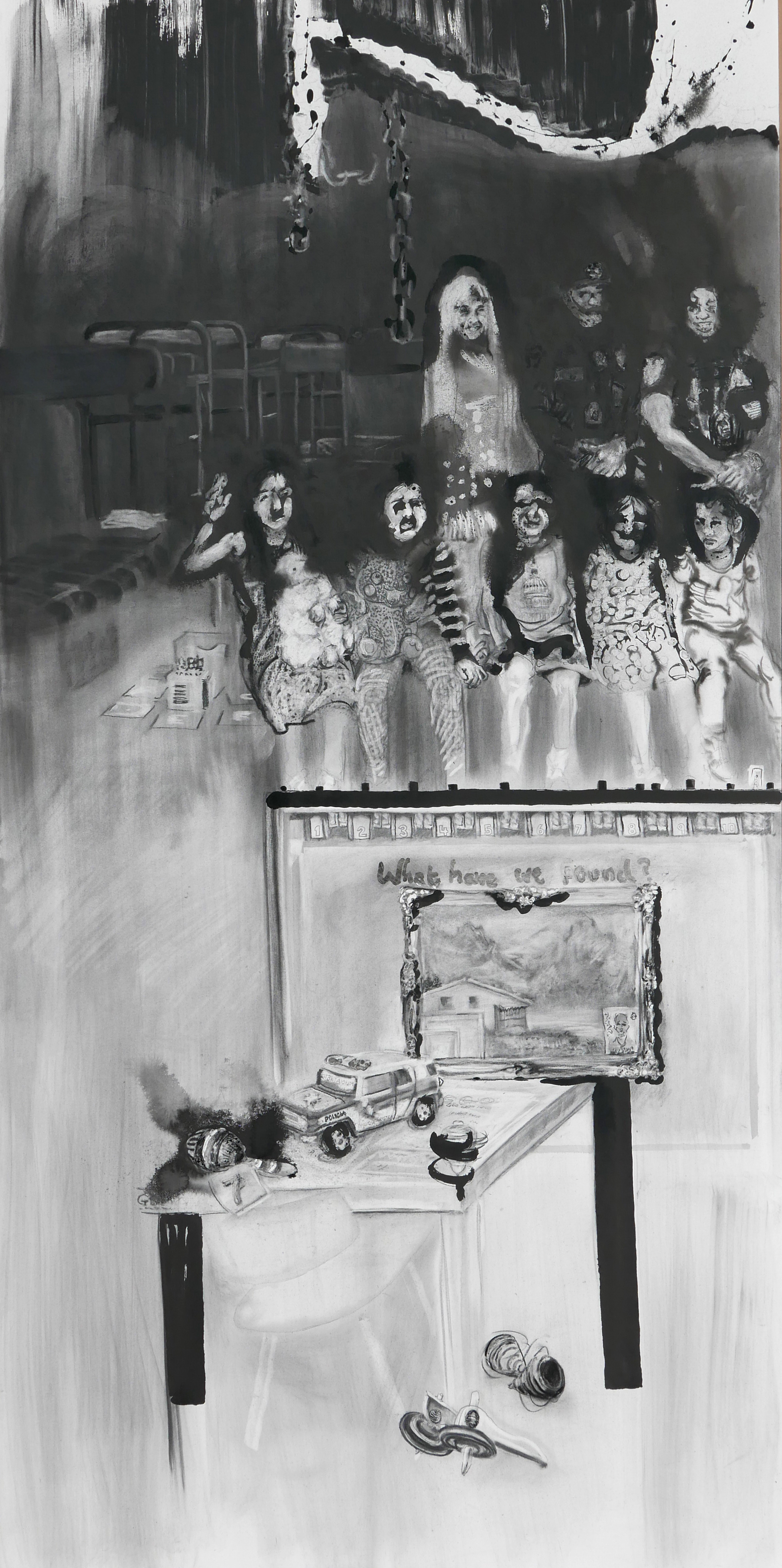
The ICEman Cometh, 2018
Left panel
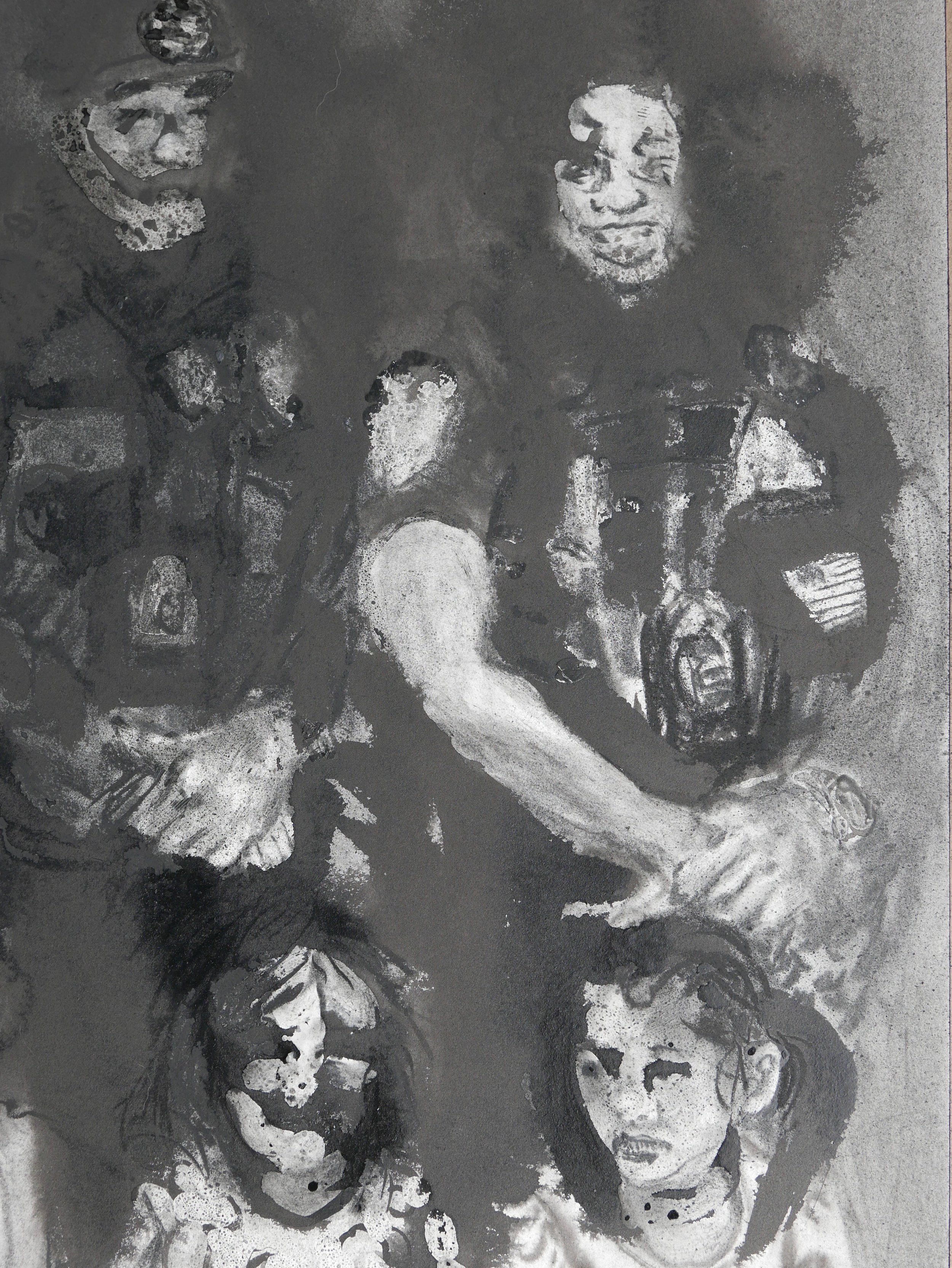
The ICEman Cometh 2018
Left panel detail: ICE enforcers
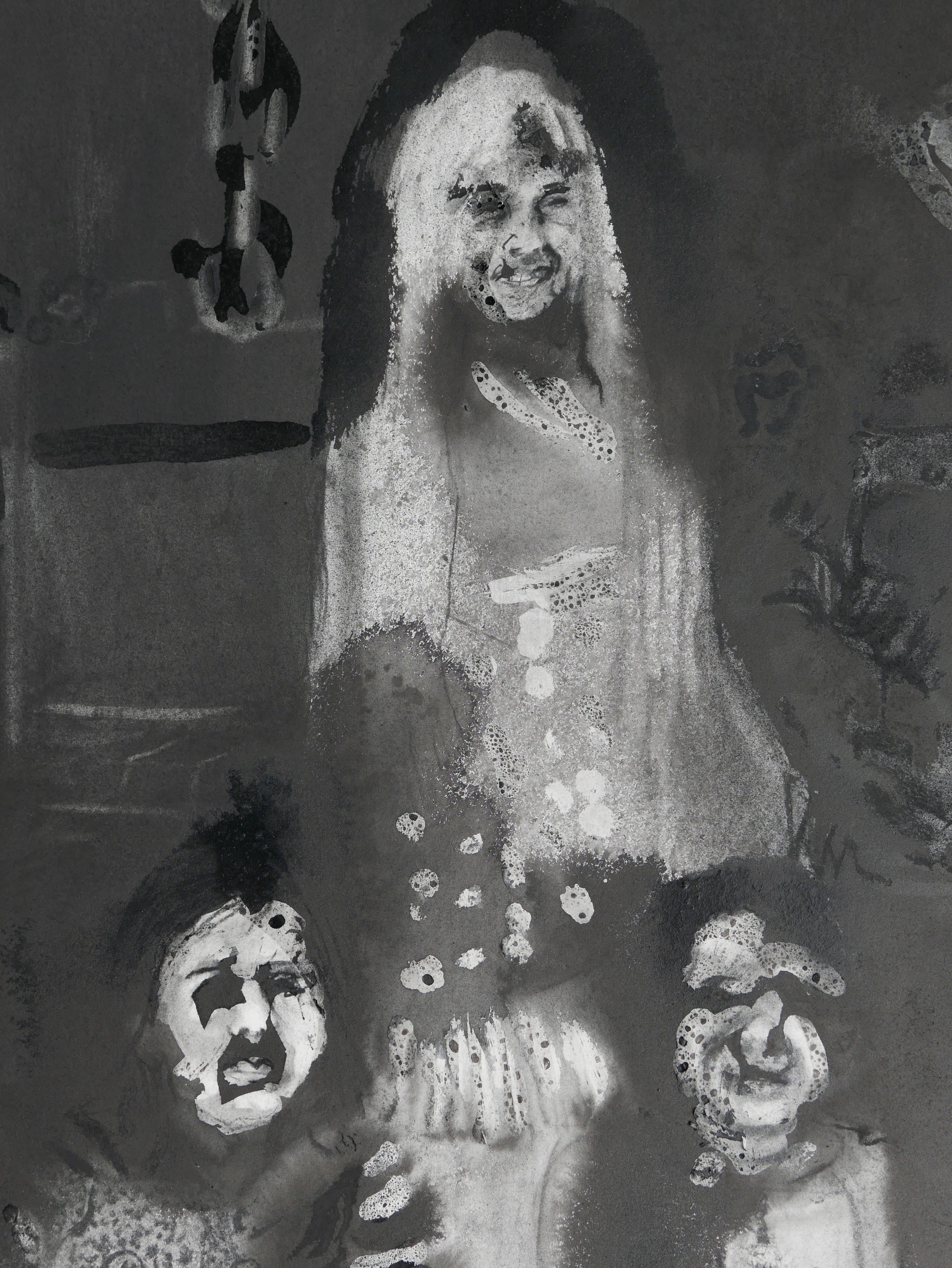
The ICEman Cometh 2018
Detail left panel: Girl dressed for her Quinceañera
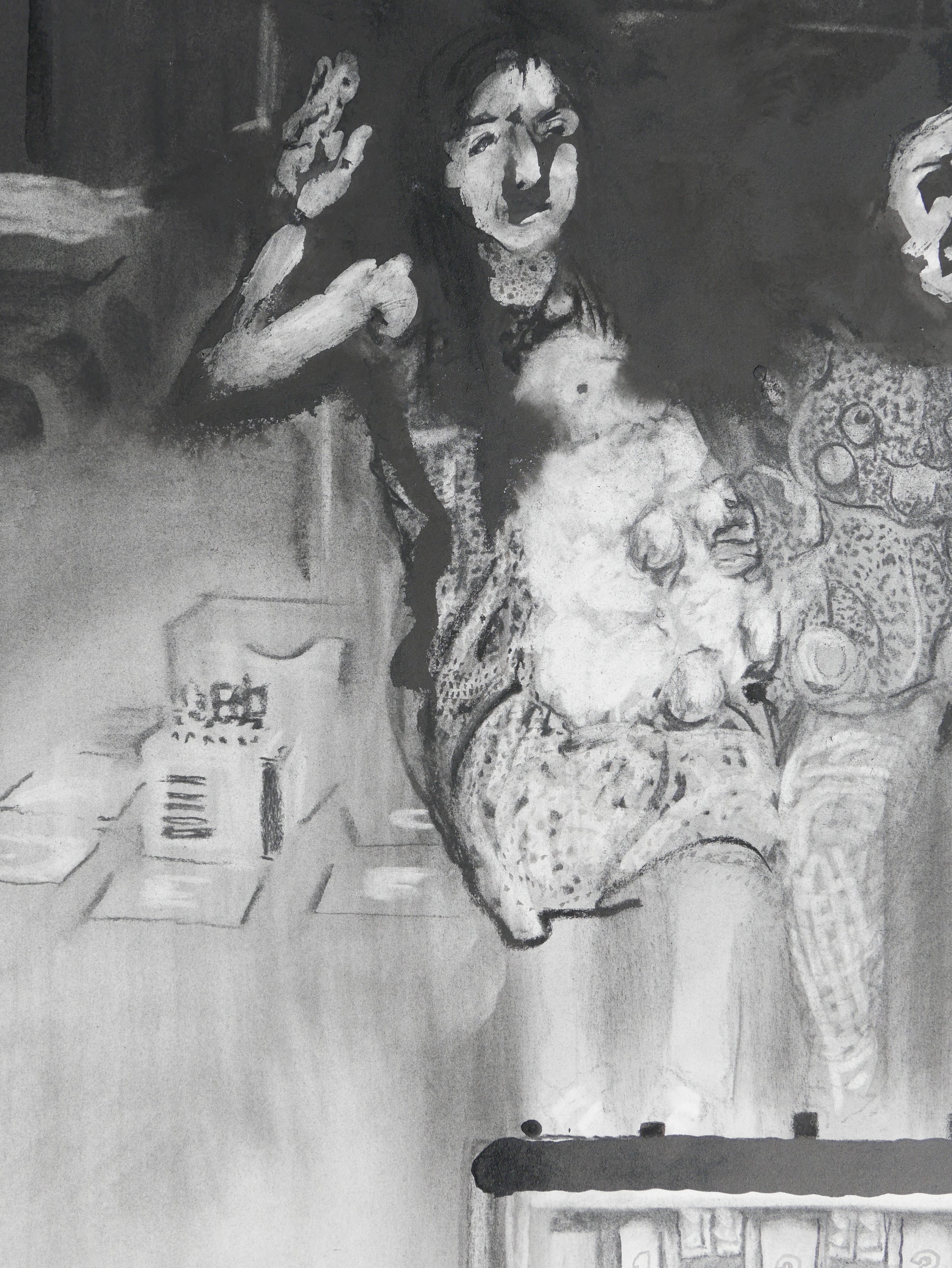
The ICEman Cometh 2018
Detail left panel: inquiry
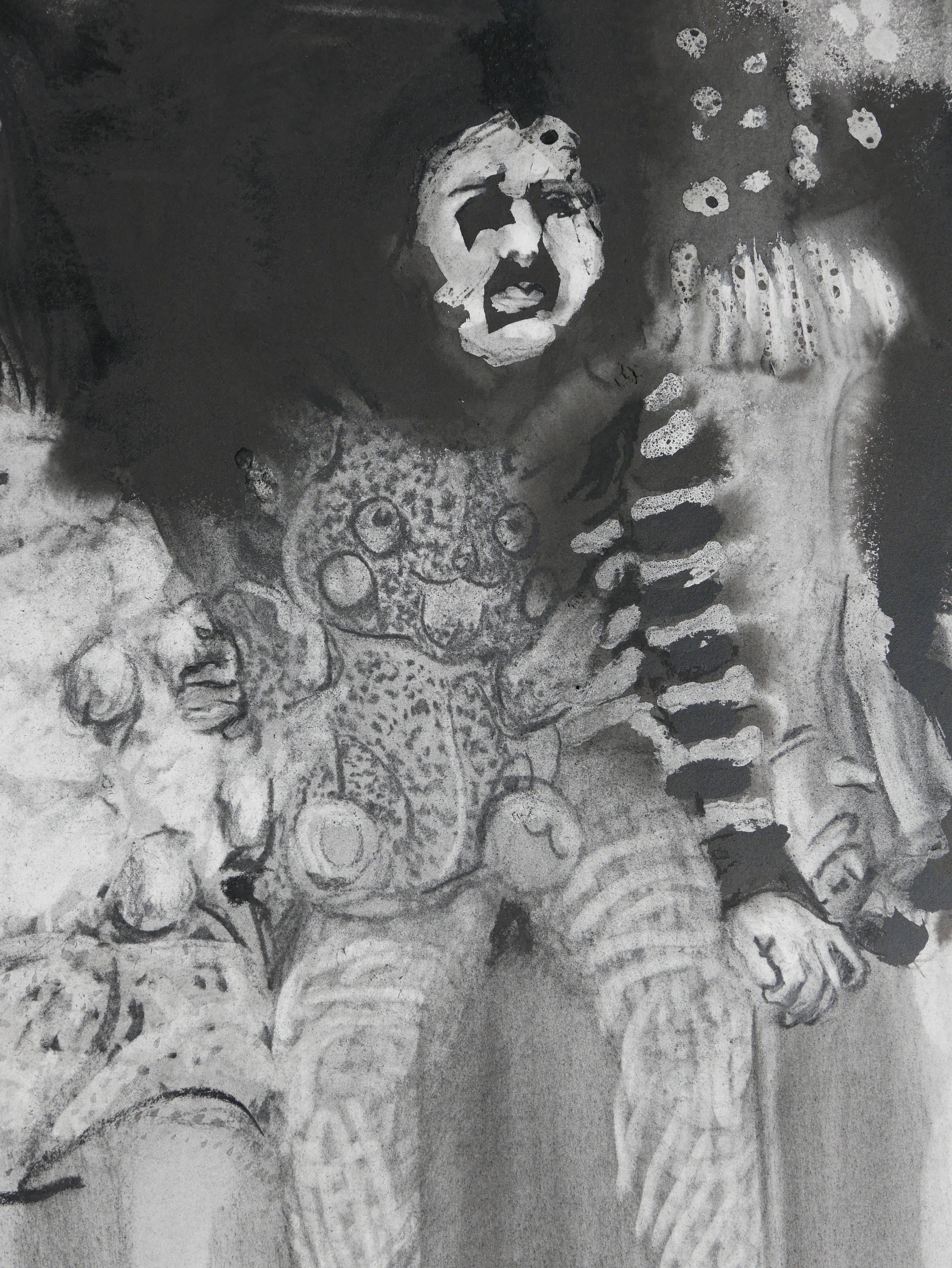
The ICEman Cometh 2018
Detail left panel: stuffed Pokemon toy
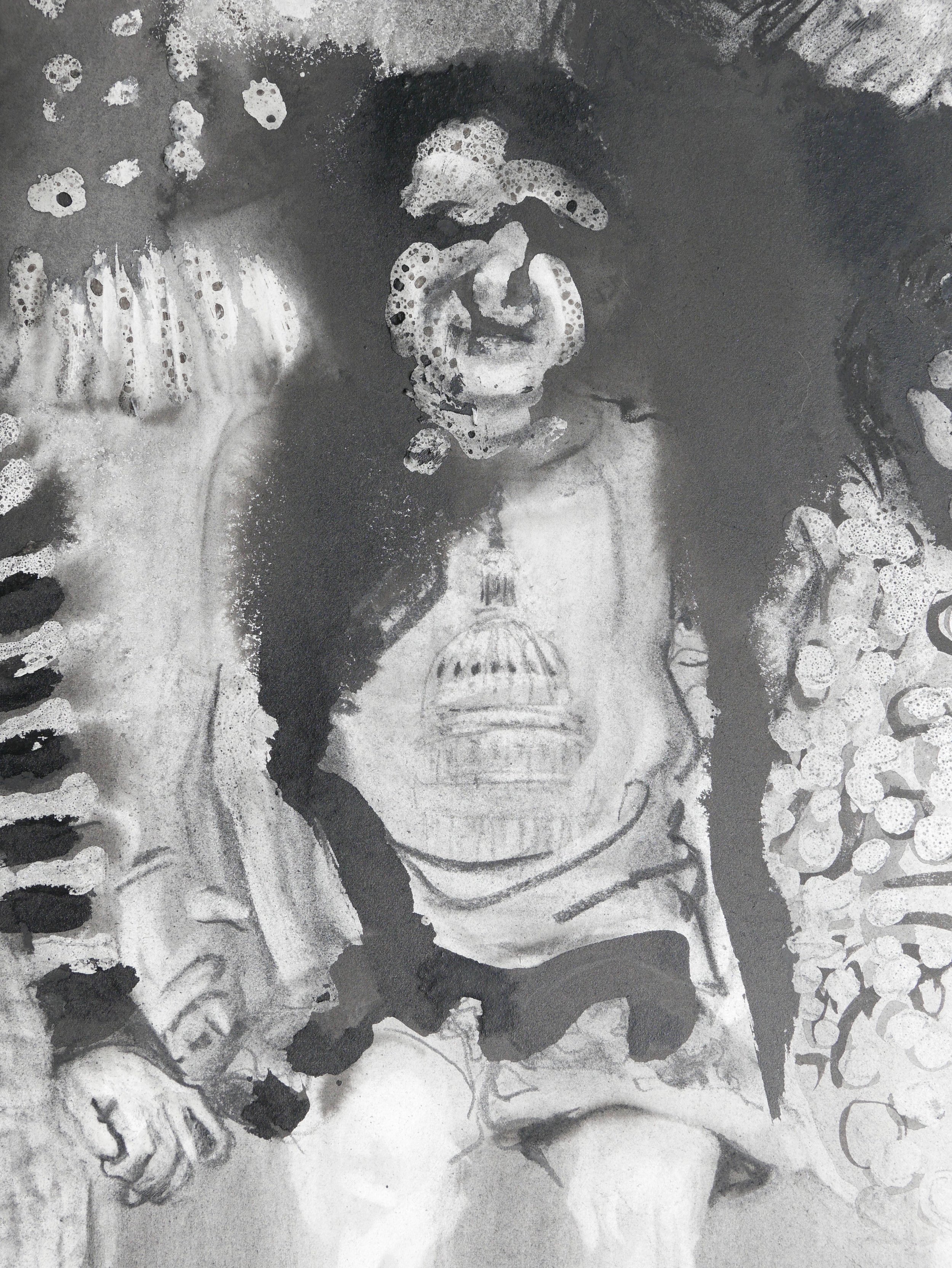
The ICEman Cometh 2018
Detail left panel: U.S. Capitol T-shirt
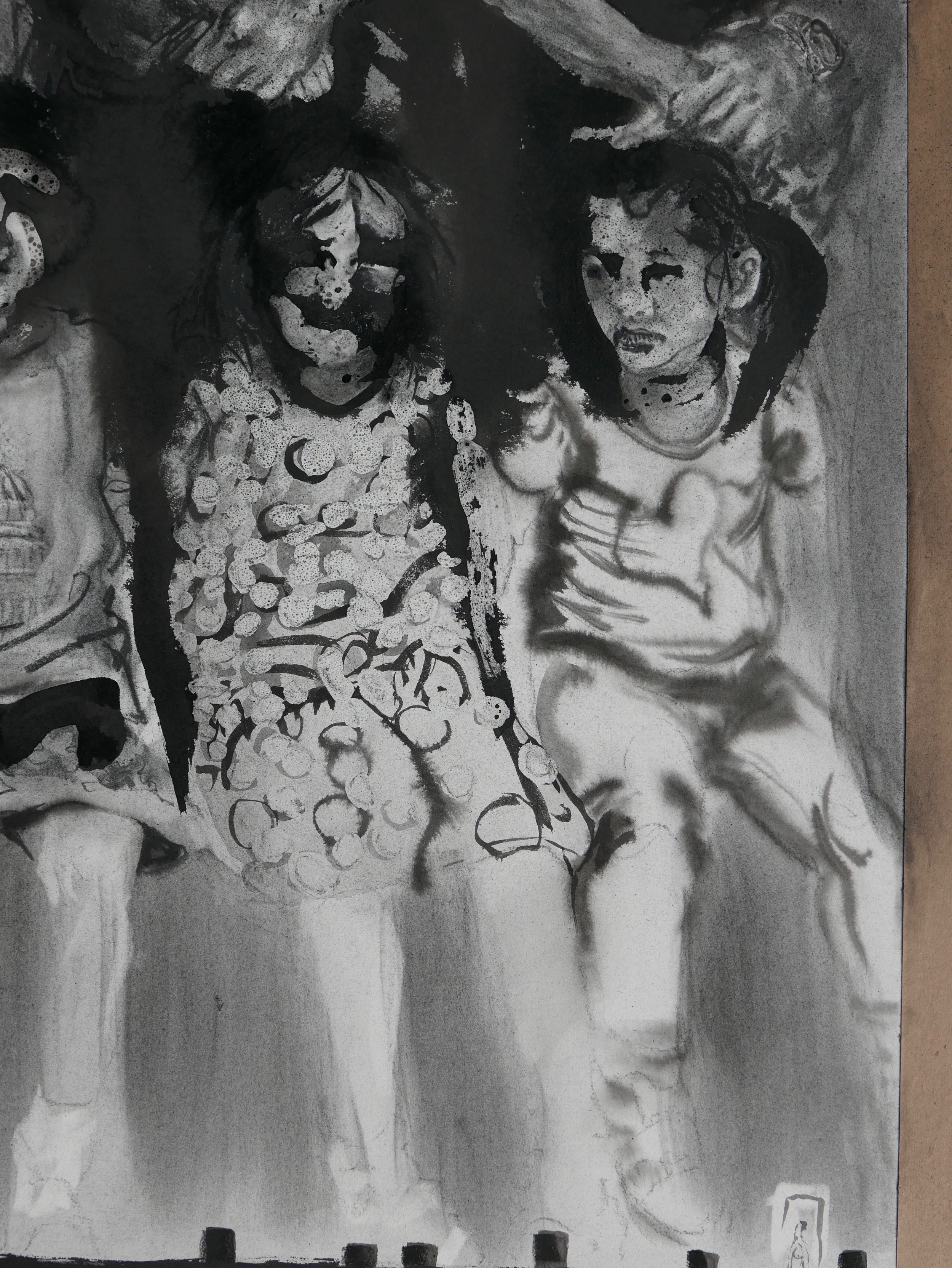
The ICEman Cometh 2018
Detail left panel
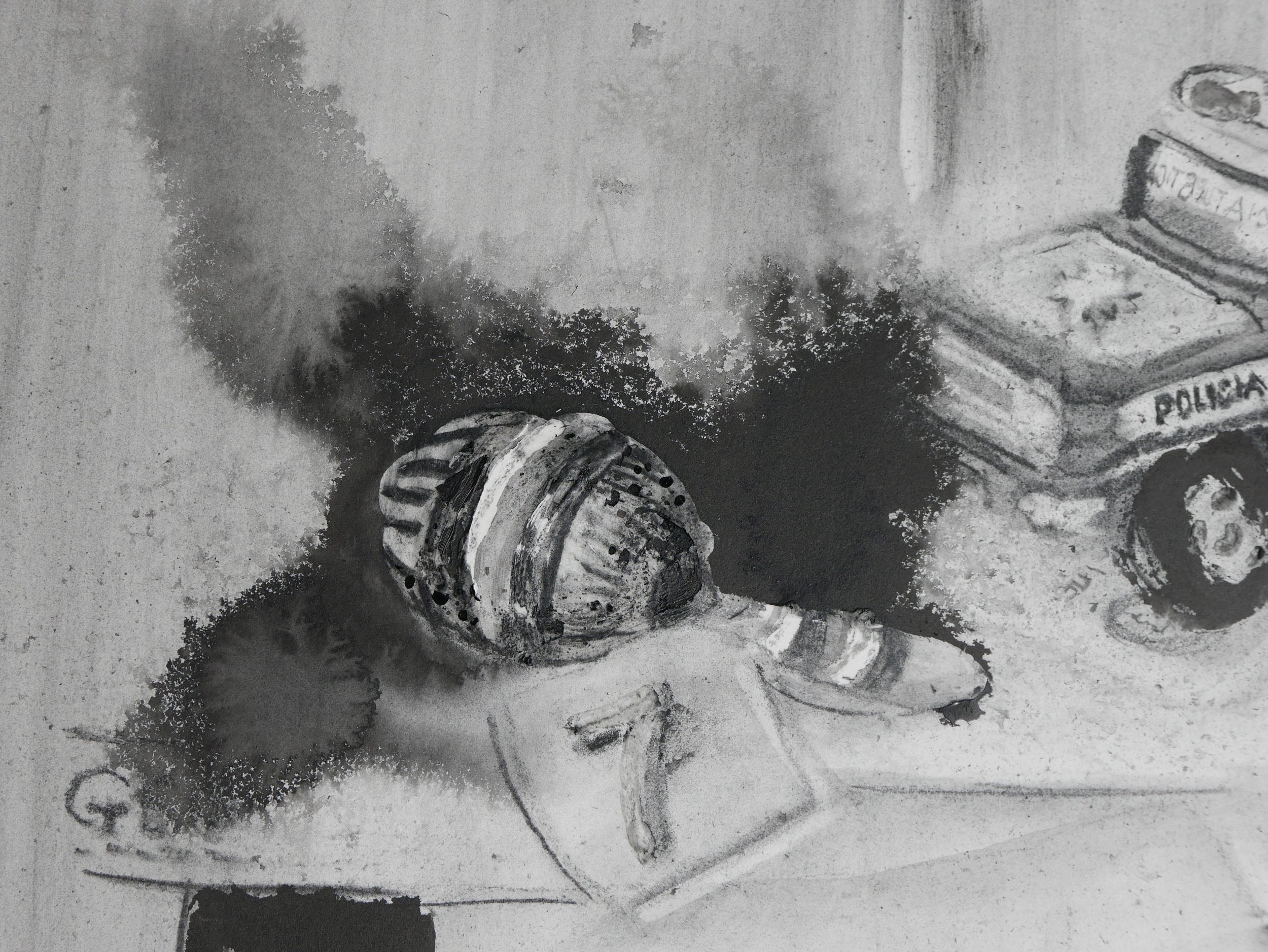
The ICEman Cometh 2018
Detail left panel: maraca with toy Policia car
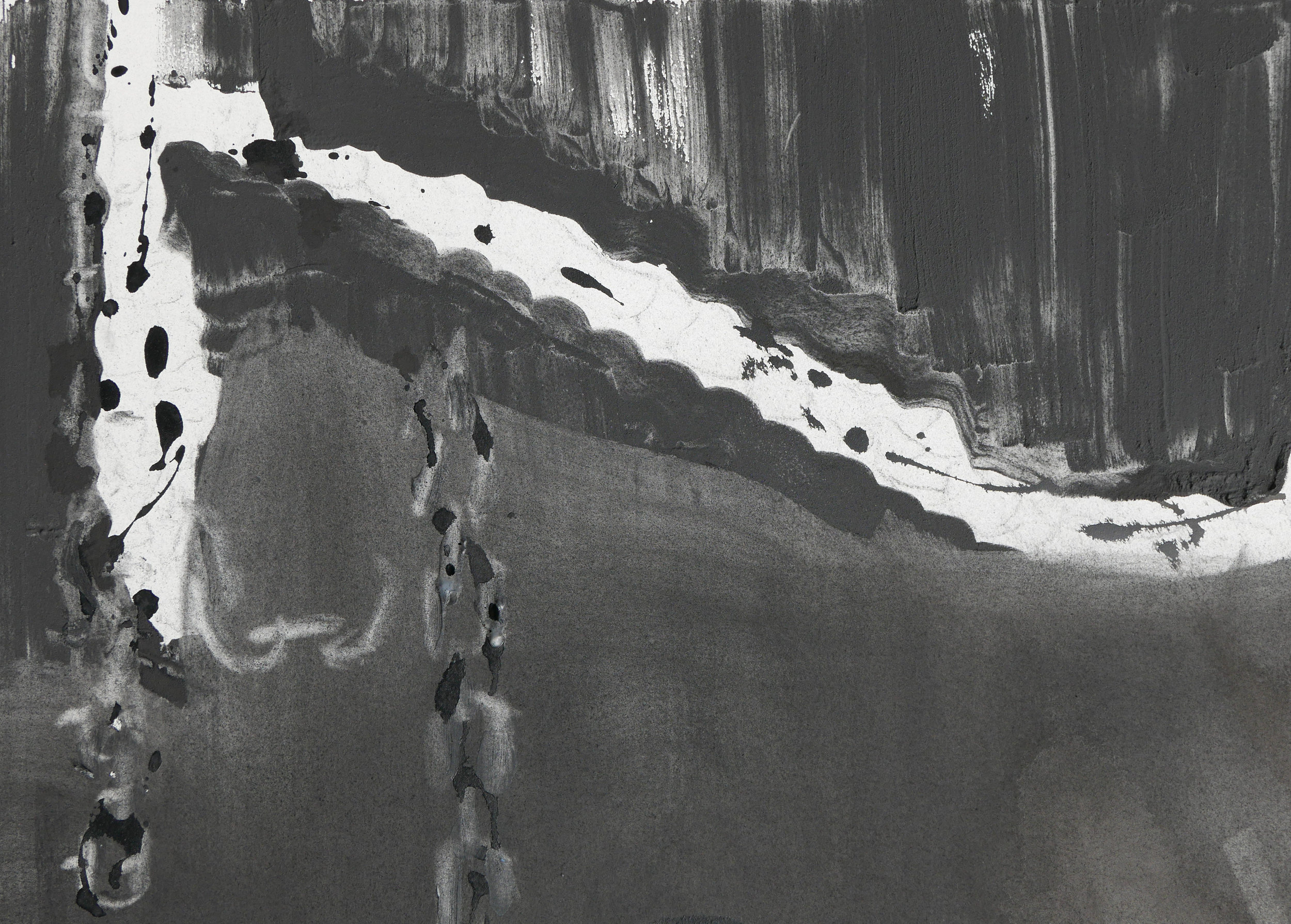
The ICEman Cometh 2018
Detail left panel: festive chains
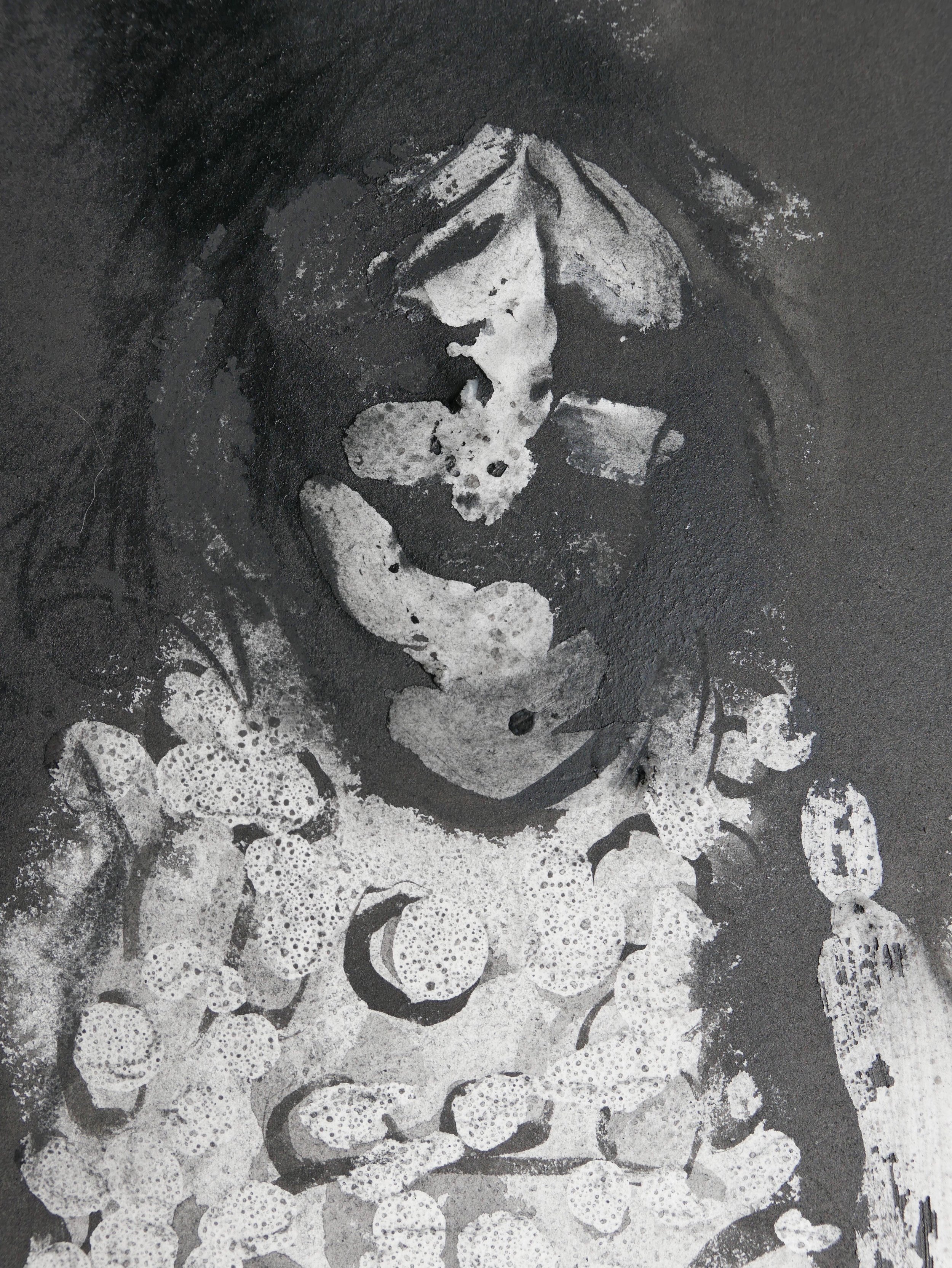
The ICEman Cometh 2018
Detail of left panel
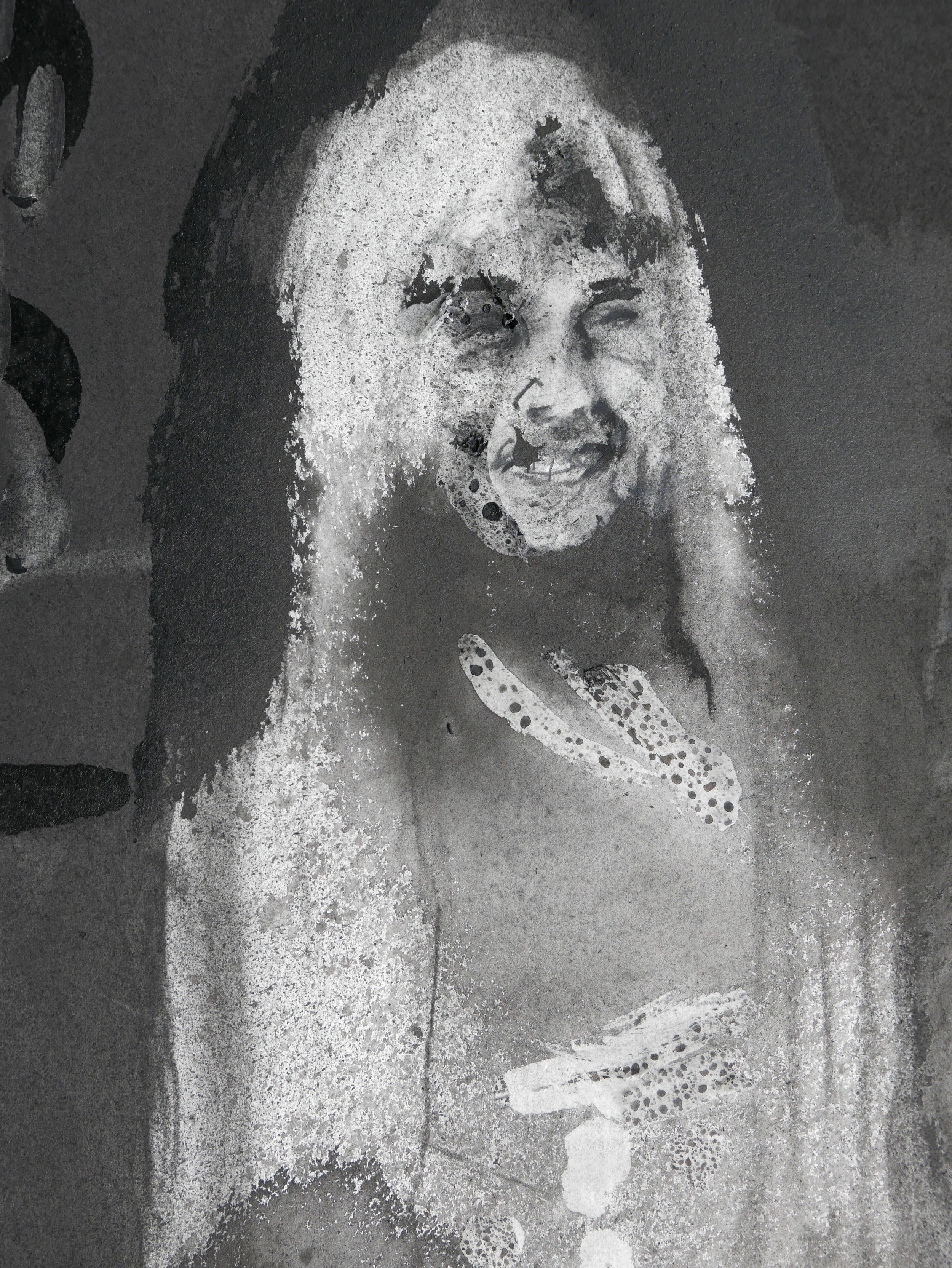
The ICEman Cometh 2018
Detail of left panel: Girl dressed for her Quinceañera
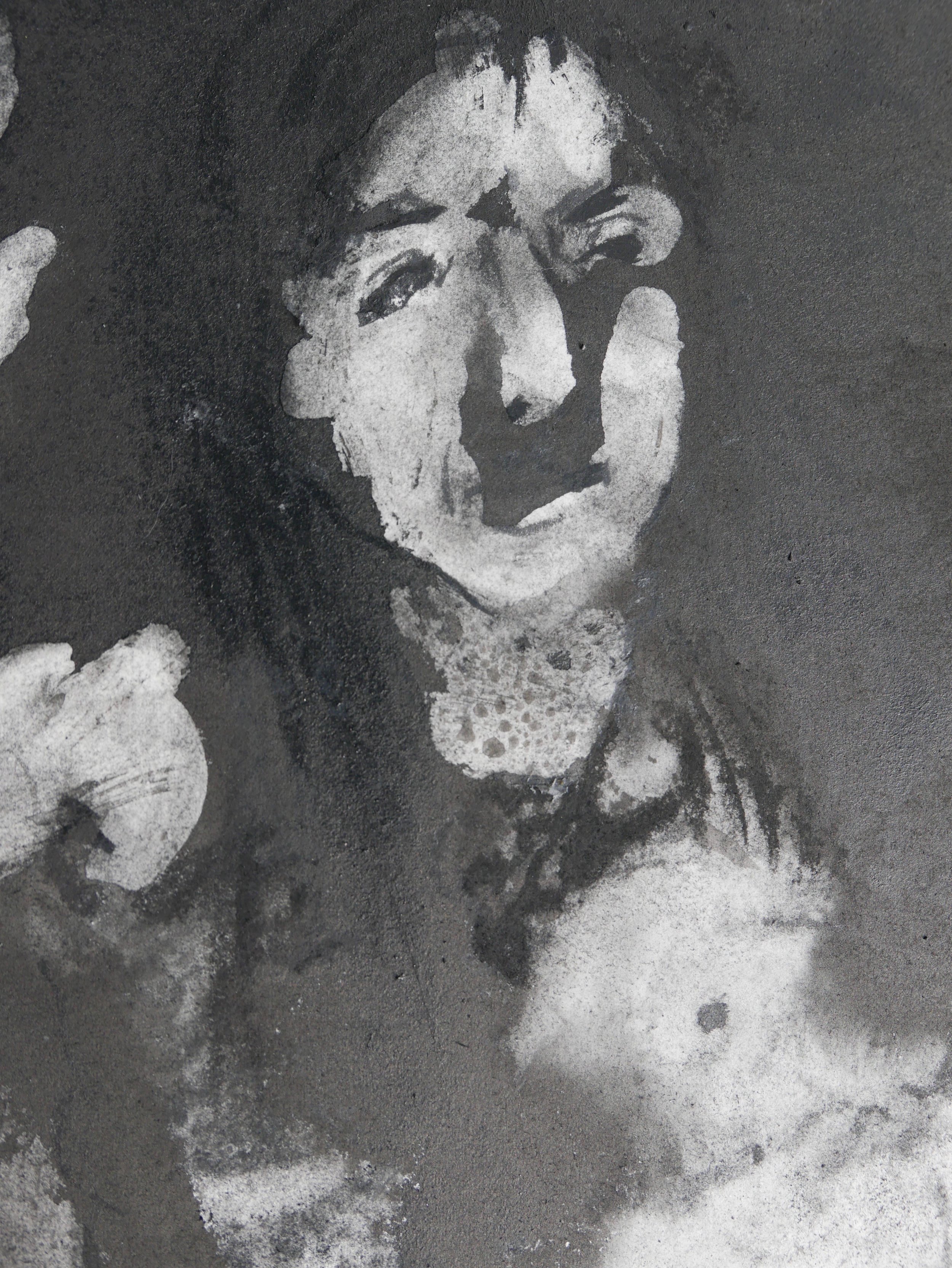
The ICEman Cometh 2018
Detail of left panel: Girl with stuffed sheep toy
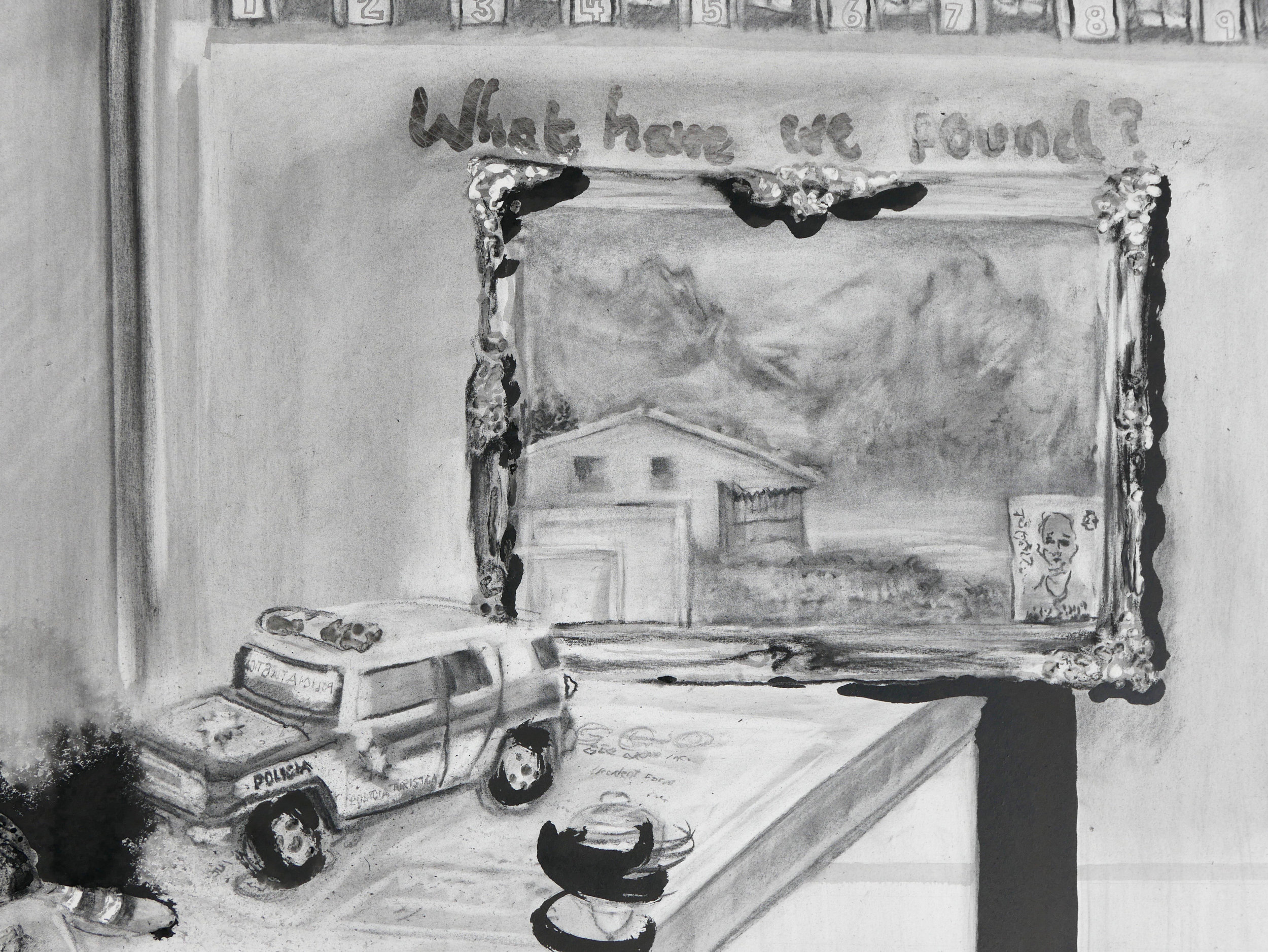
The ICEman Cometh 2018
Detail left panel: Photograph of relative attached to painting of home
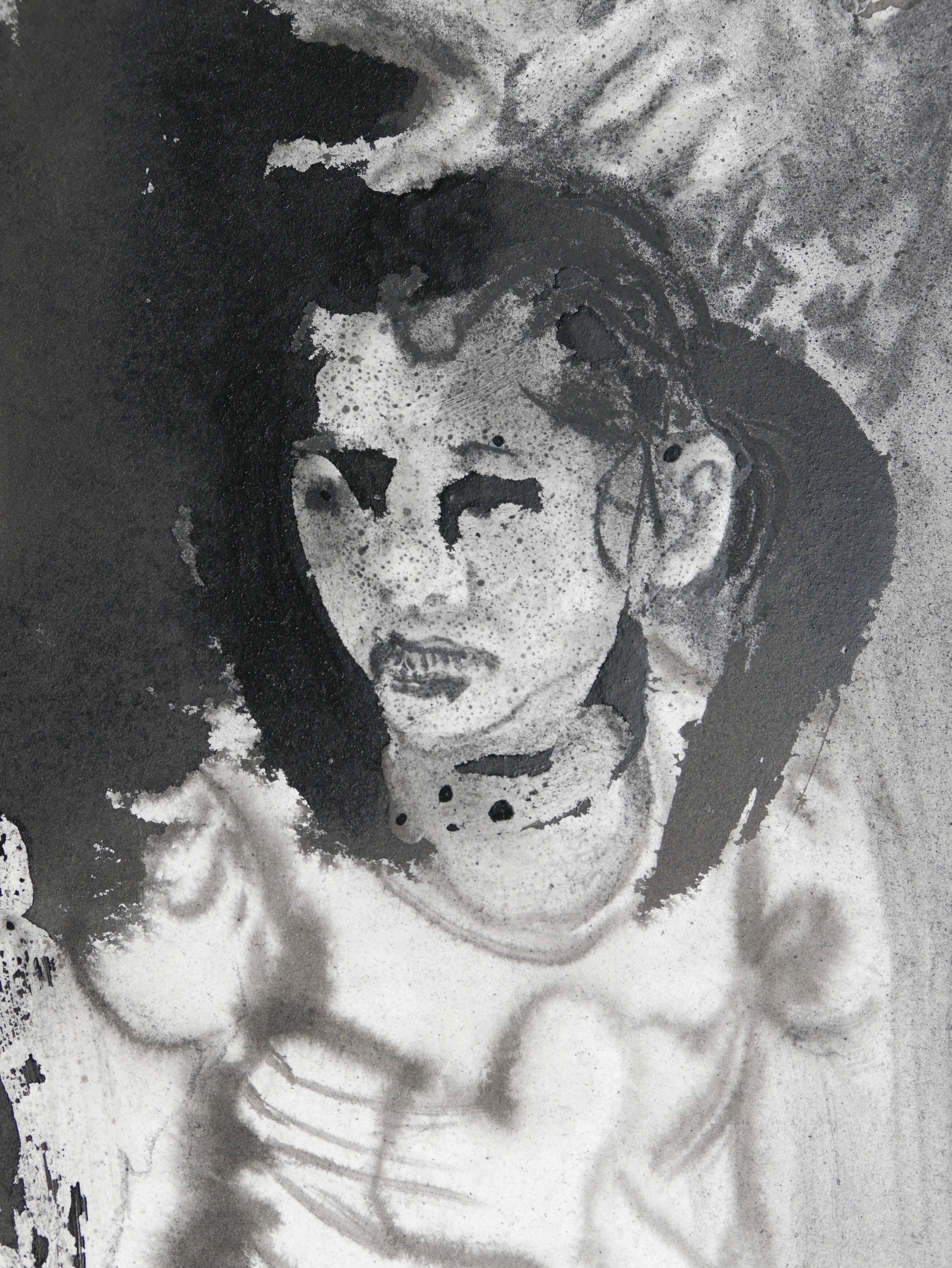
The ICEman Cometh 2018
Detail left panel
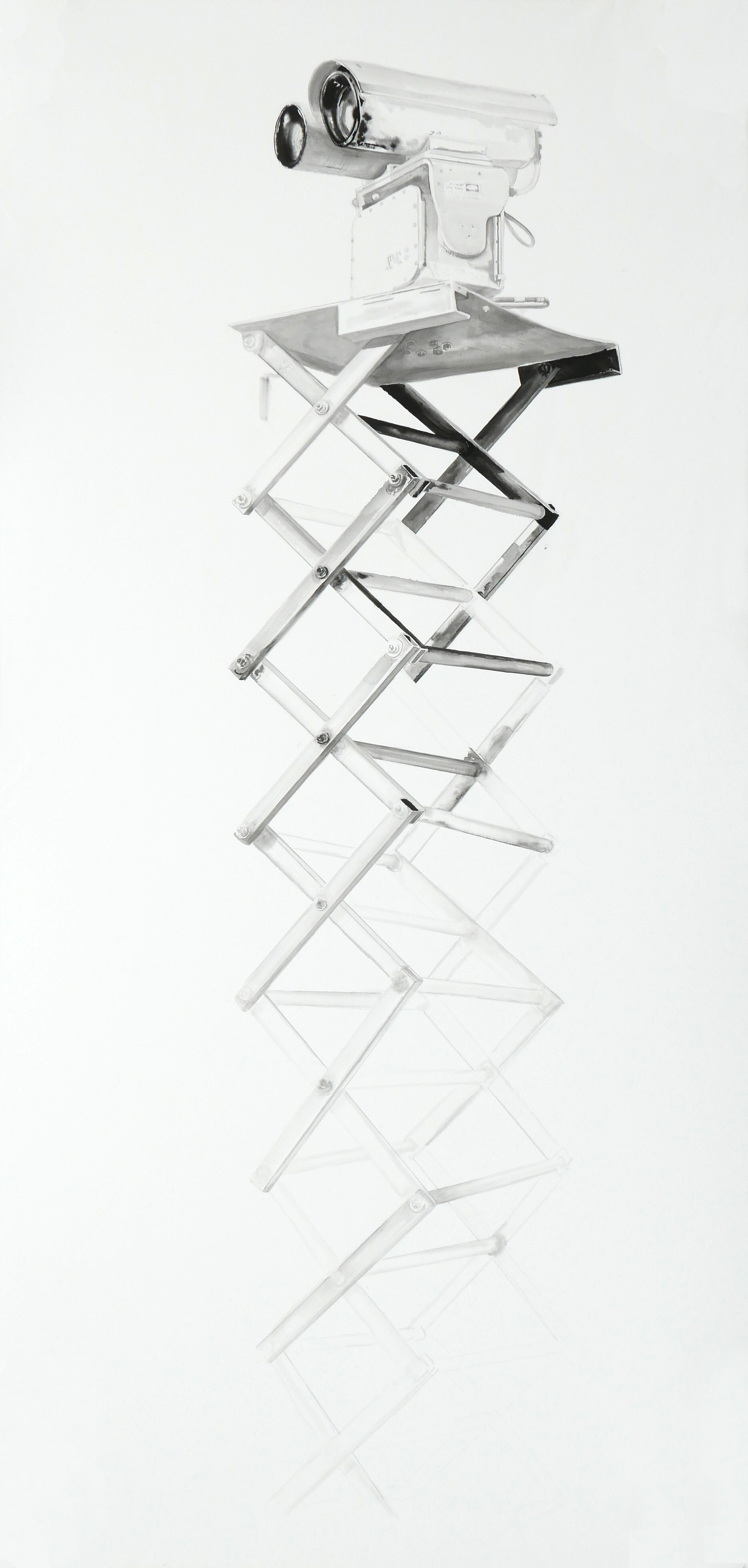
DREAMCATCHER 2018
Ink on paper, 90 x 42.5 inches
The tour moves on, and we see many more gadgets that the Border Patrol relies on to ‘gain situational awareness to better detect, identify, monitor, and respond to threats to the Nation’s borders.’ It’s a dizzying list of mechanical hoodoo: ‘Biometrecis, Thermal Hand-Held Imaging Devices, Mobile Surveillance Systems[s],… Remote Video Surveillance System[s],… Vehicle and Cargo Inspection System[s],… Night Vision Devices… Integrated Fixed Towers.’ Don’t forget assault rifles, drones, four-wheelers, horses, handcuffs, stun guns, and the old-fashioned combat boot to the neck.
…
In 1989,…the annual budget for the US. Border Patrol totaled $232 million. By fiscal year 2010, that annual budget had increased to $3.8 billion[.] As astonishing as this current annual boundary enforcement budget is, it still does not include the billions of dollars allotted to other agencies such as immigration, Customs and Enforcement that police ports of entry or those responsible for fence construction and maintenance. Based on rough estimates derived from a recent congressional report, $14.8 billion were spent on boundary security in fiscal year 2012.
Excerpts from The Land of Open Graves: Living and Dying on the Migrant Trail by Jason De Leon who cites the United States Border Patrol Strategic Plan. The Mission: Protect America 2015

DREAMCATCHER
Camera detail
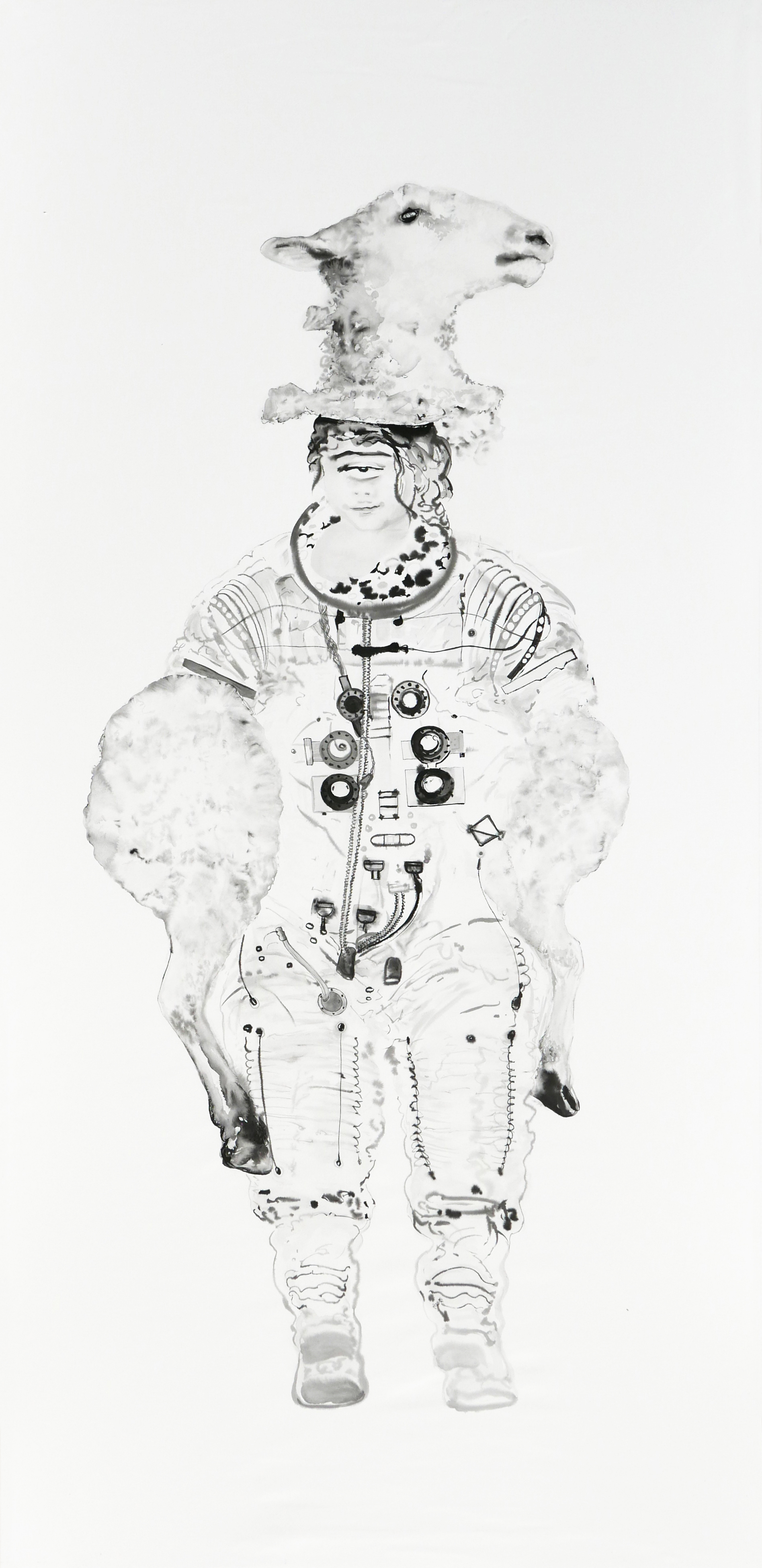
TRANSPORT II 2018
People don’t turn into refugees overnight.
Ink on paper, 90 x 43 inches
Becoming a refugee is a gradual process, a bleaching out, a transition into a ghostly existence.
…
What matters is that a thousand little anchors once moored you to the world. Becoming a refugee means watching as those anchors are severed, one by one, until at last you’re floating outside of society, an untethered phantom in need of a new life.
Excerpts from Guests of the Holy Roman Empress Maria Theresa by Lev Golinkin in The Displaced: Refugee Writers on Refugee Lives, edited by Viet Thanh Nguyen

TRANSPORT II 2018
Detail of heads
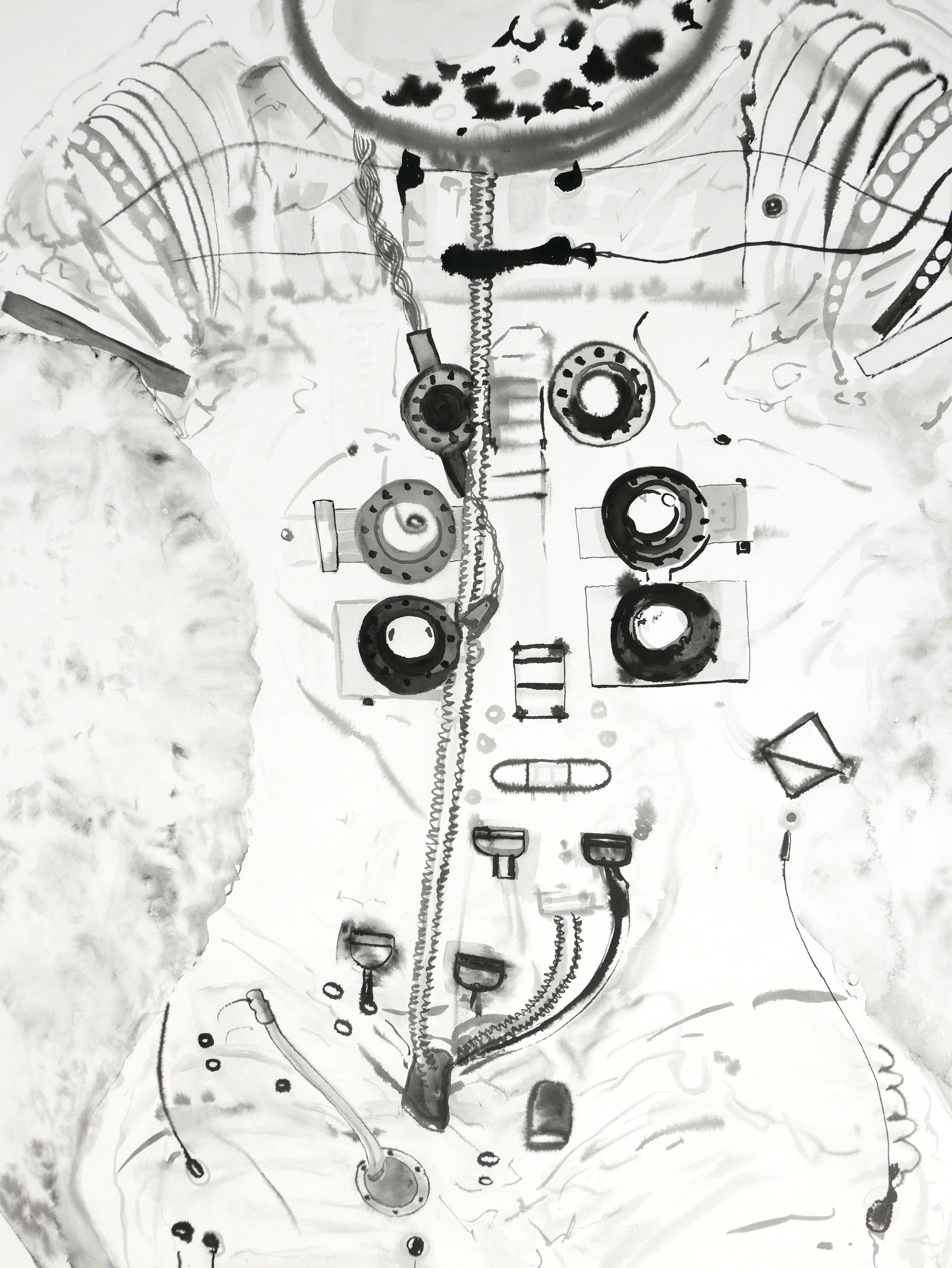
Transport II
Detail
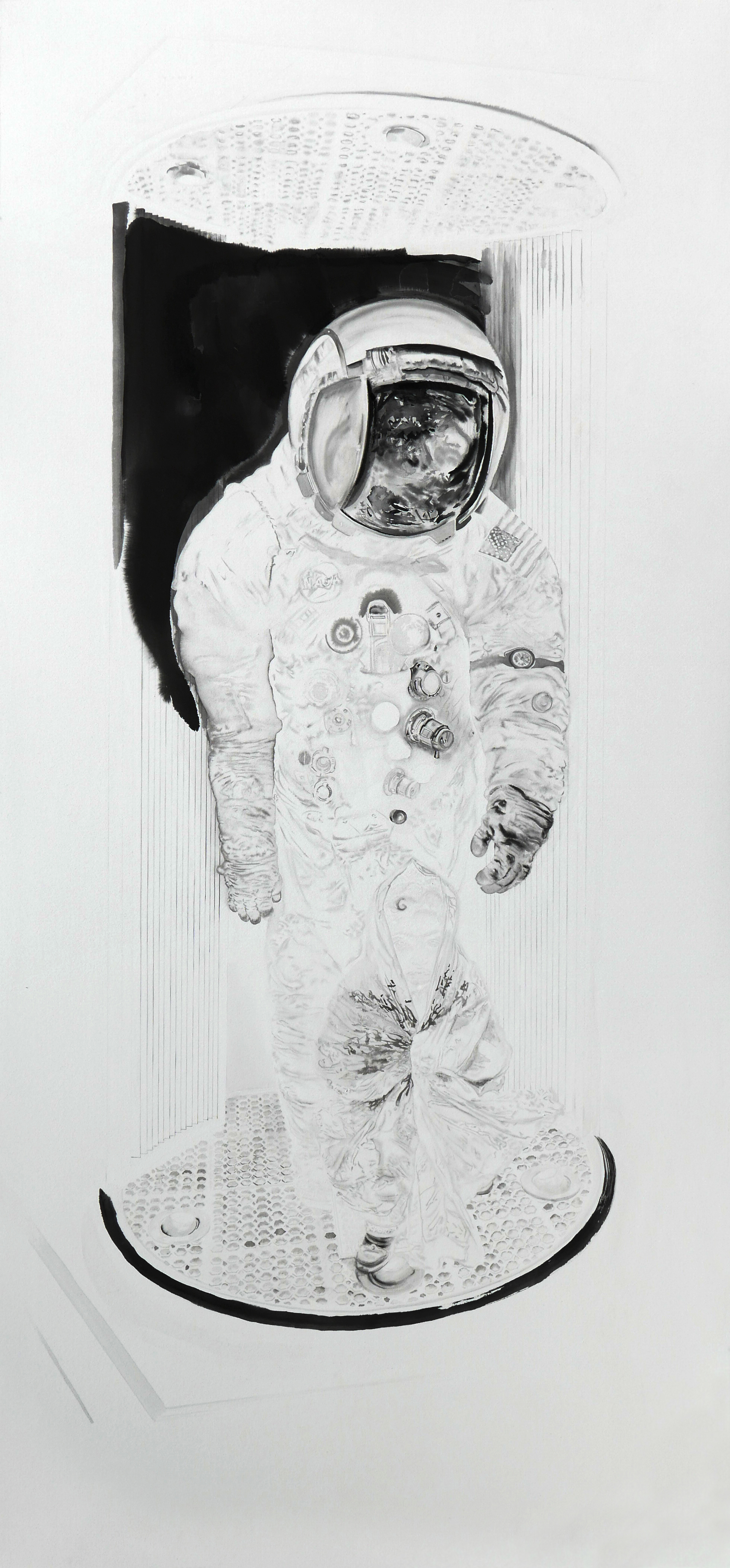
TRANSPORT 2018
Ink on paper, 91.25 x 42.25 inches
People don’t turn into refugees overnight.
“Becoming a refugee is a gradual process, a bleaching out, a transition into a ghostly existence. With the exception of those born in refugee camps, every refugee used to have a life.
…
What matters is that a thousand little anchors once moored you to the world. Becoming a refuge means watching as those anchors are severed, one by one, until at last you’re floating outside of society, an untethered phantom in need of a new life.”
Excerpts from Guests of the Holy Roman Empress Maria Theresa by Lev Golinkin in The Displaced: Refugee Writers on Refugee Lives, edited by Viet Thanh Nguyen
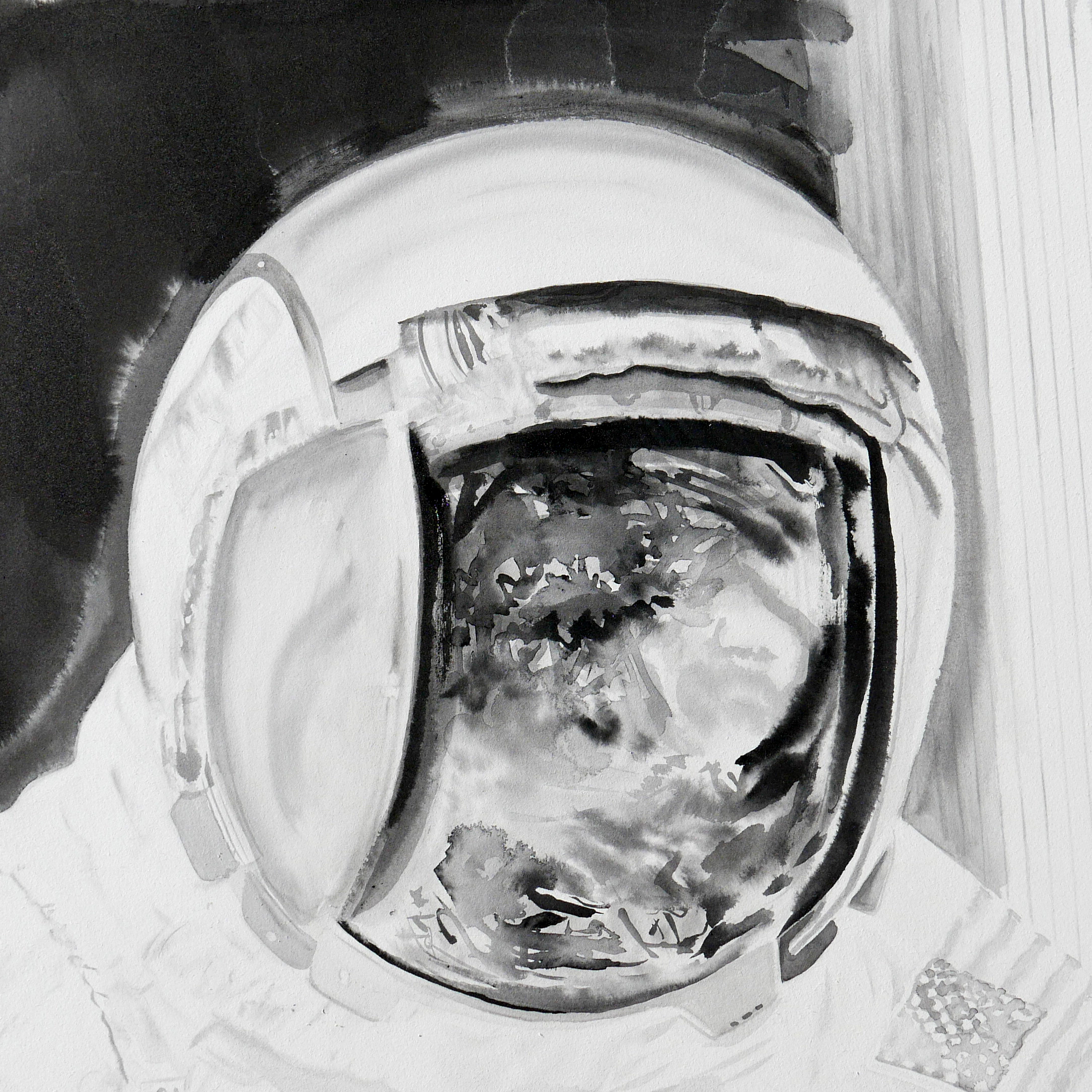
TRANSPORT 2018
Detail of astronaut helmet
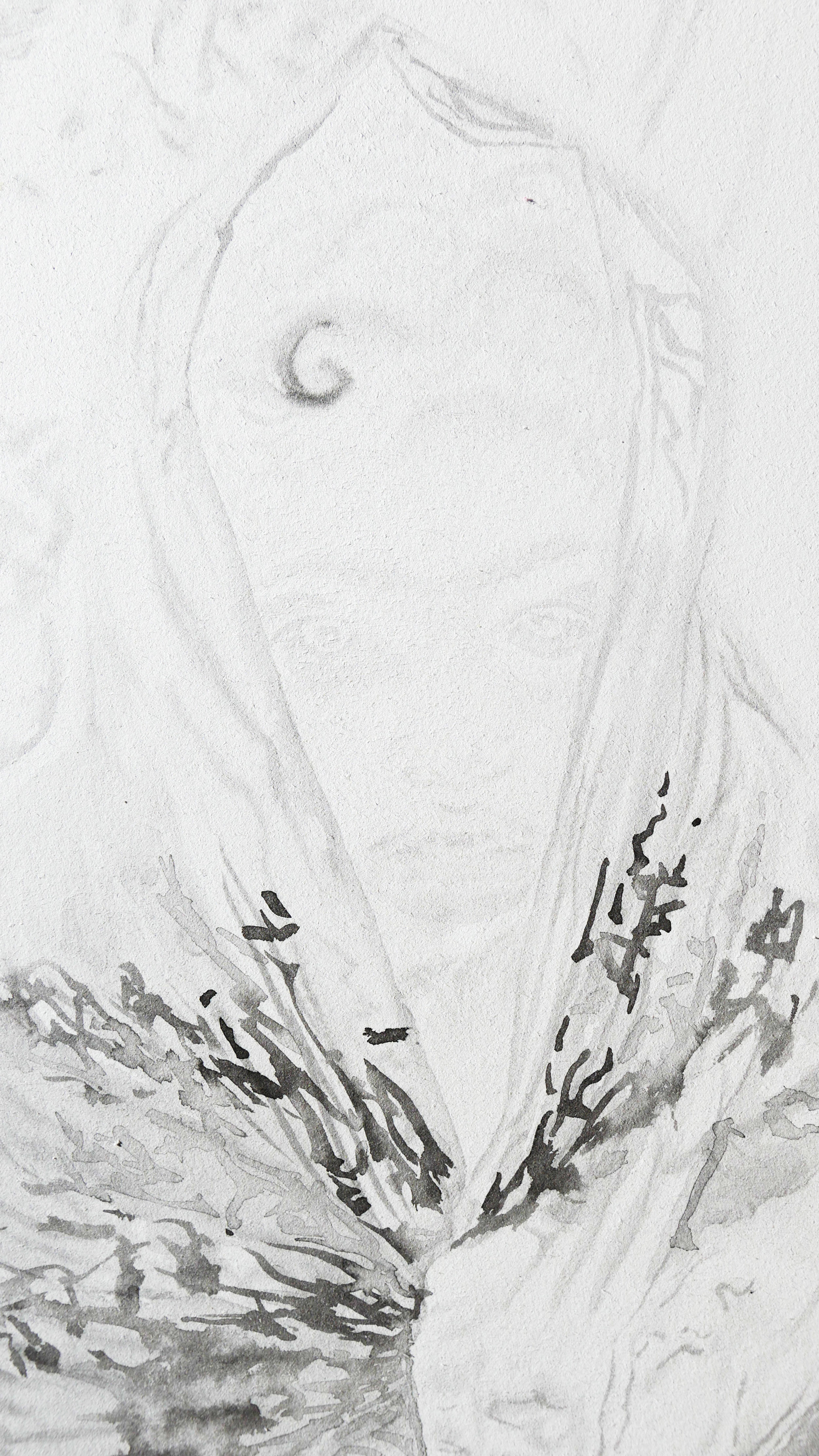
TRANSPORT 2018
Detail of child’s head
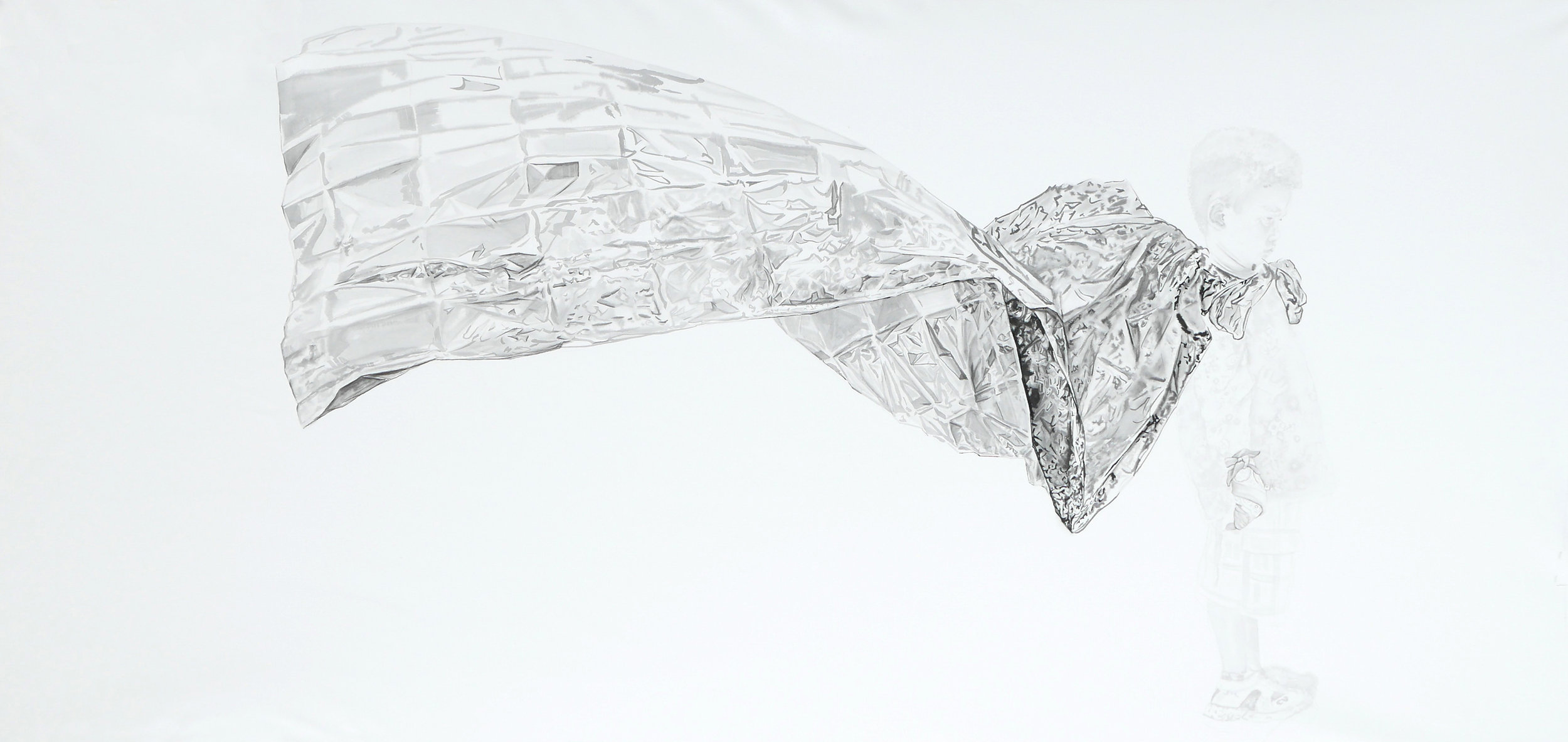
BOUND 2018
Ink on paper, 41.25 x 88.5 inches
They came effortlessly, alone, empty handed, without friends, family, culture or a past. They took off on a lark without needs, or provisions; required nothing to sustain life, neither food, water nor shelter. They traveled freely amongst strangers, without care, language or desire. They tarried and waited, unseen, without apprehension of the foretold or fear of the unforeseen. They were impervious to temperature, exposure to the elements and the creatures of the land and sea. They would not be deterred—no matter the hardships, the consequences, the threats and promises of violence, oppression and humiliation. They could not be prevented—despite barriers, surveillance, military tactics and personnel, by vigilantes, the hostiles. They were able to leap tall buildings in a single bound.
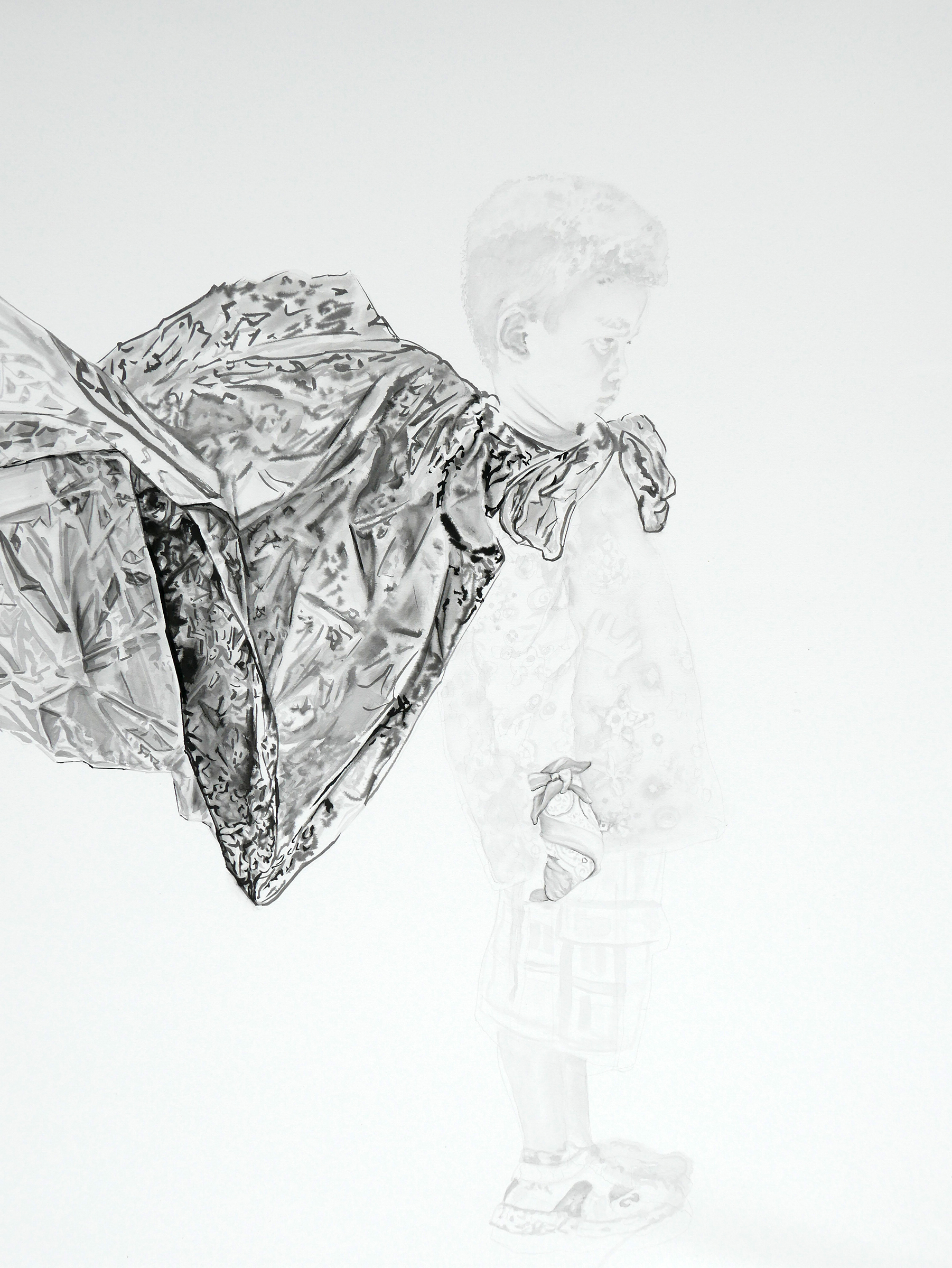
Detail of BOUND 2018
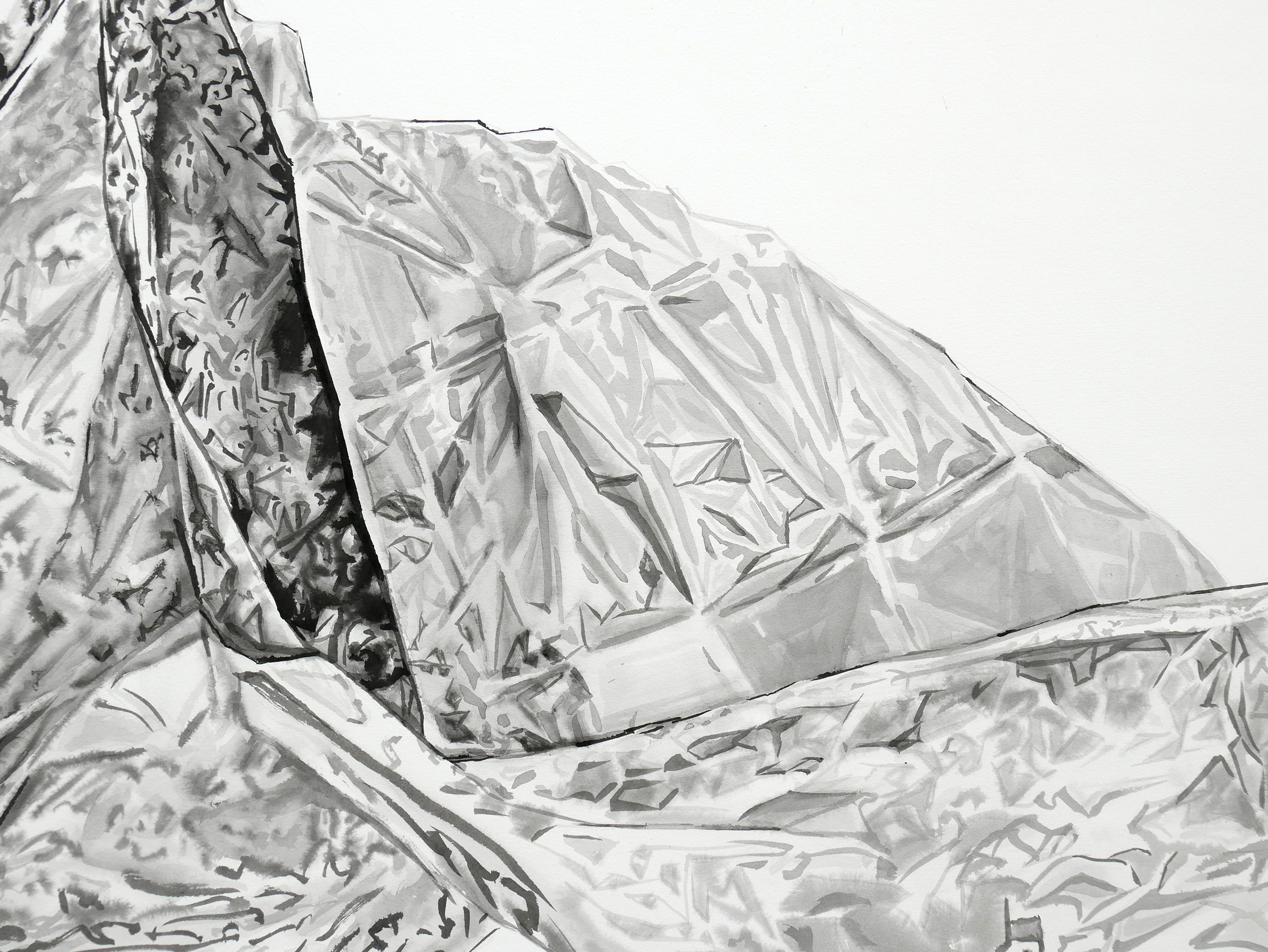
Detail of BOUND 2018
Detail of cape
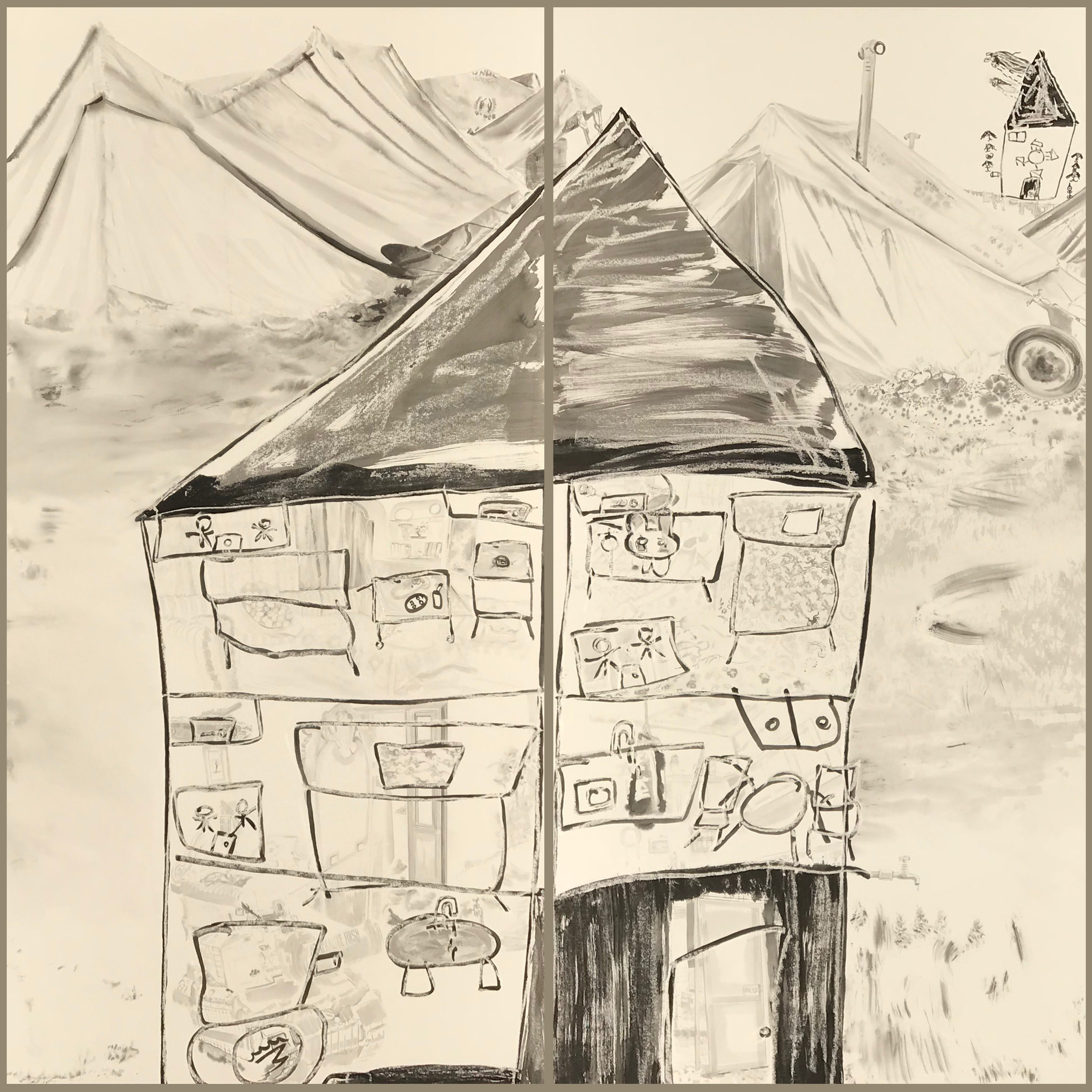
CEDE (MOTHERS HOUSE) 2017
Ink on paper, 84 x 84 inches, two panels
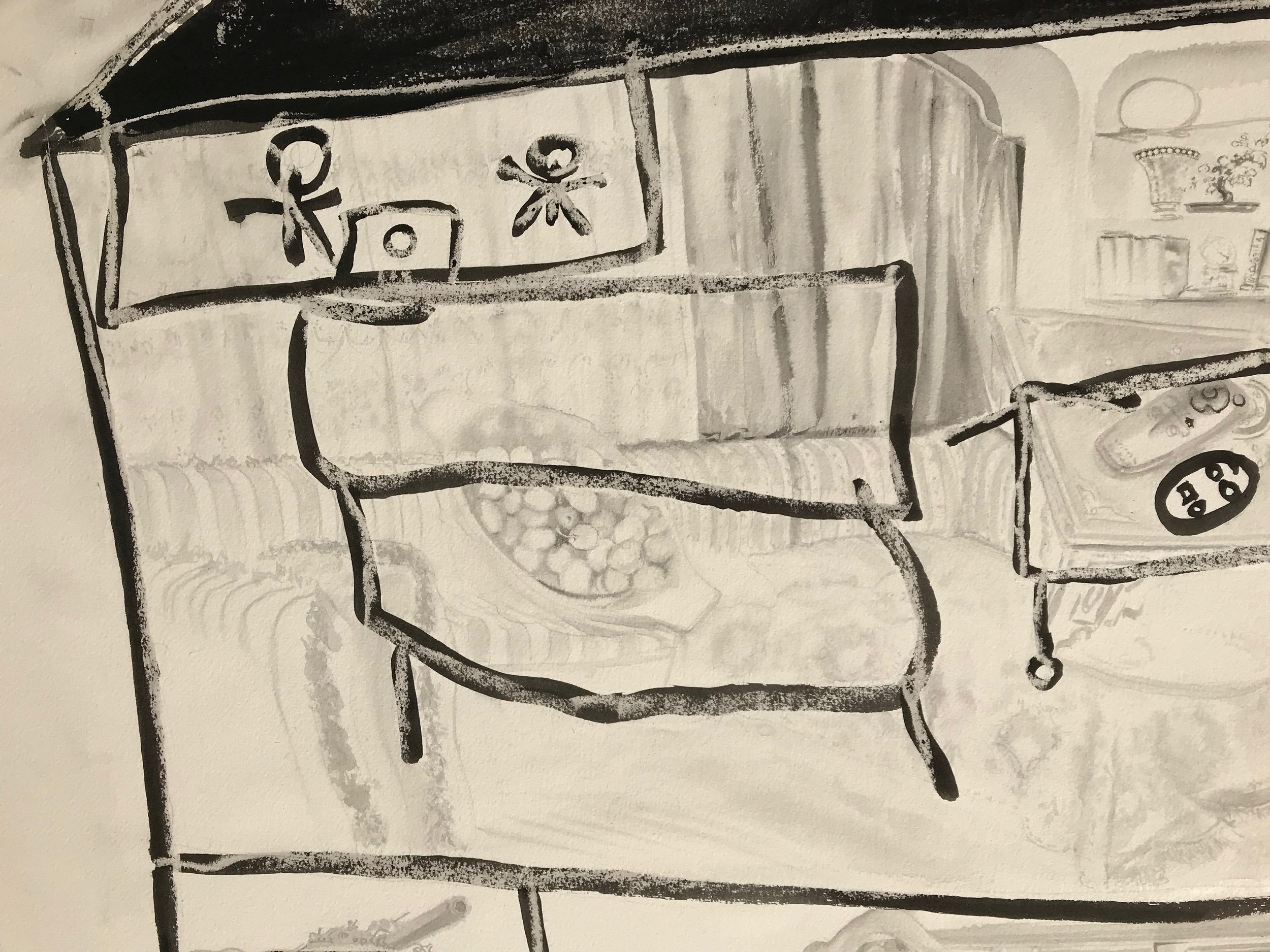
CEDE (MOTHERS HOUSE)
detail of Living Room
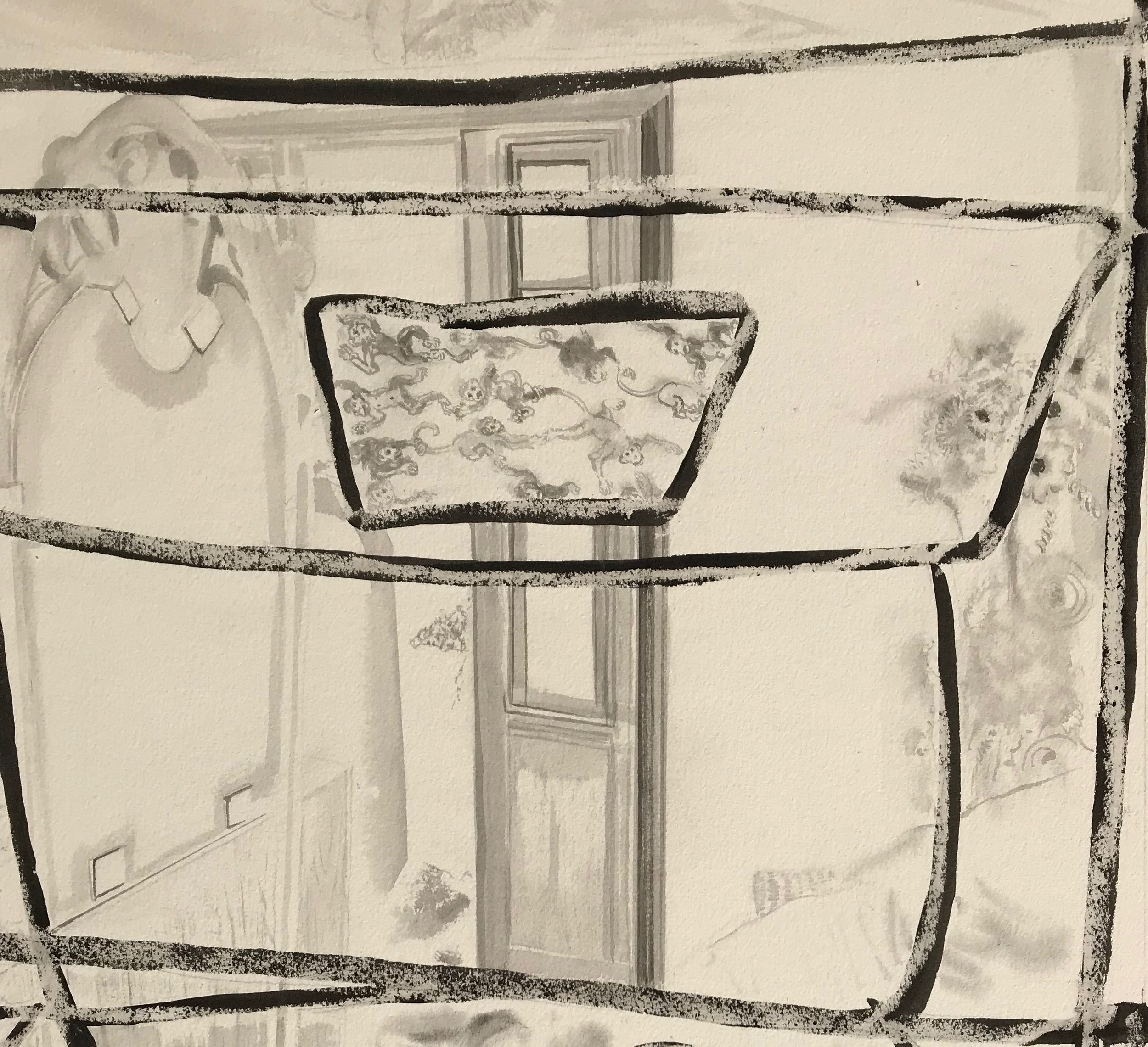
CEDE (MOTHERS HOUSE)
Detail of empty bed with monkey pillow case
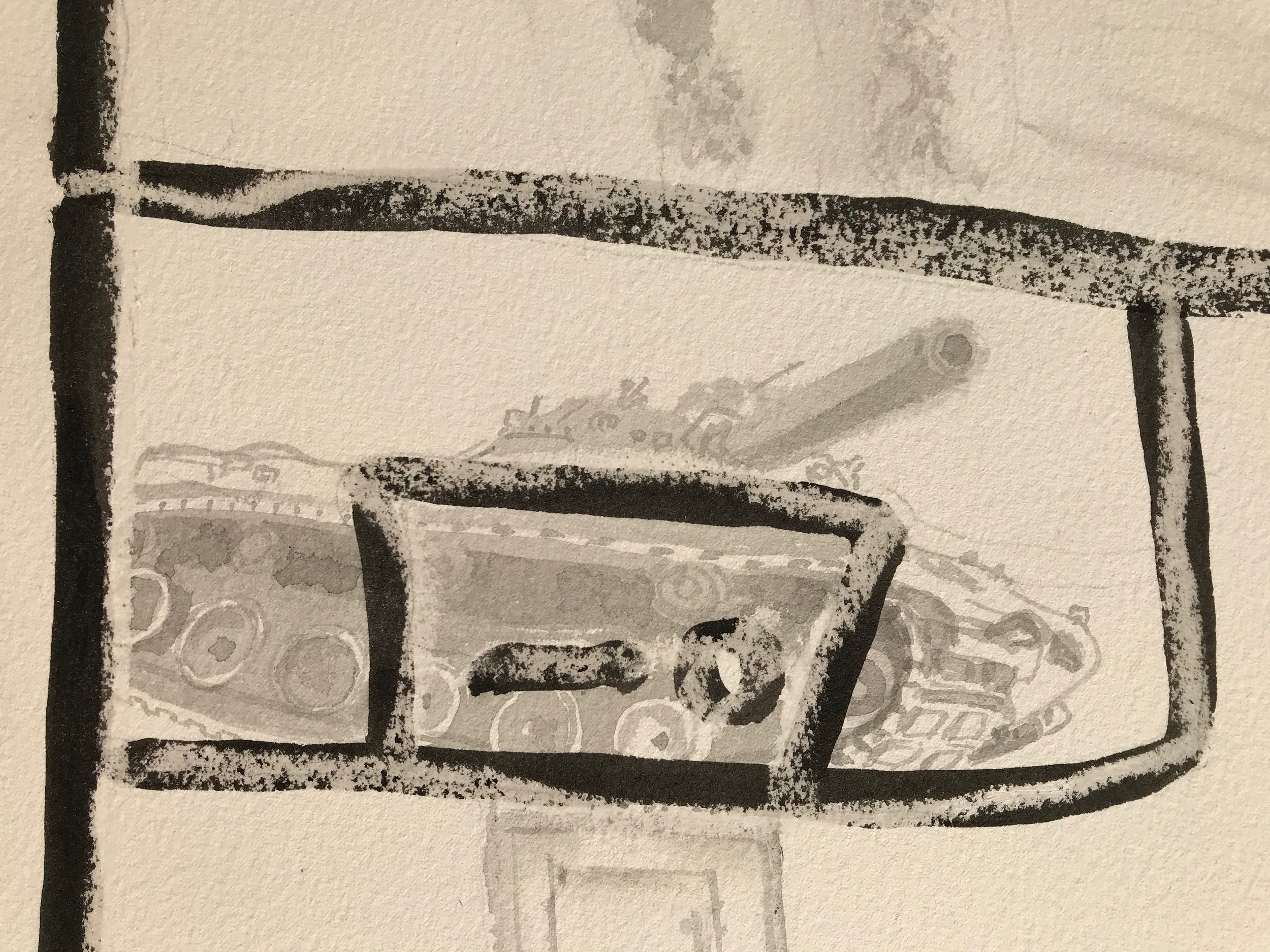
CEDE (MOTHERS HOUSE)
Tank notation detail
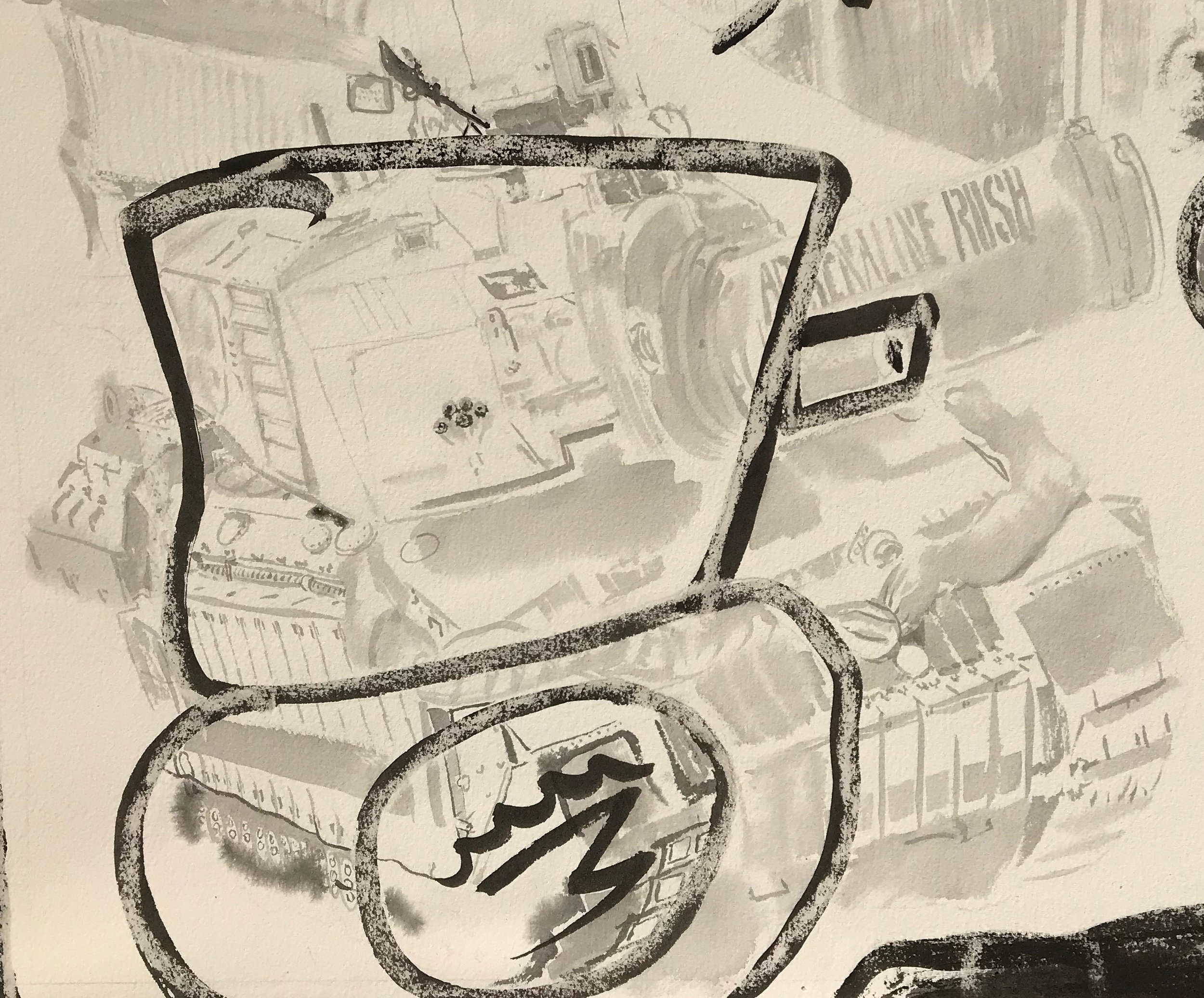
CEDE (MOTHERS HOUSE)
Detail of tank in room
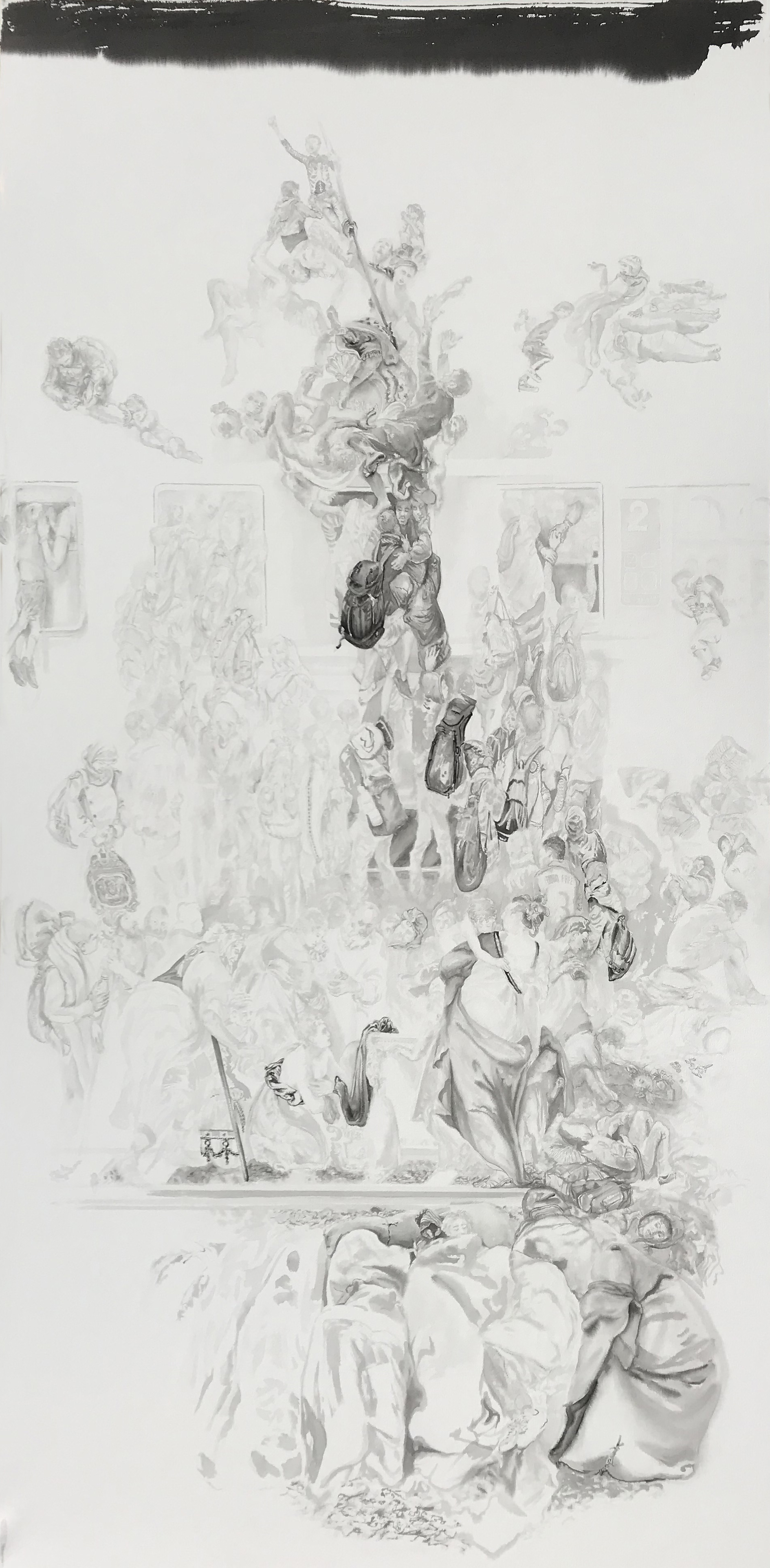
ASCENSION, 2017
Ink, 84 x 42 inches
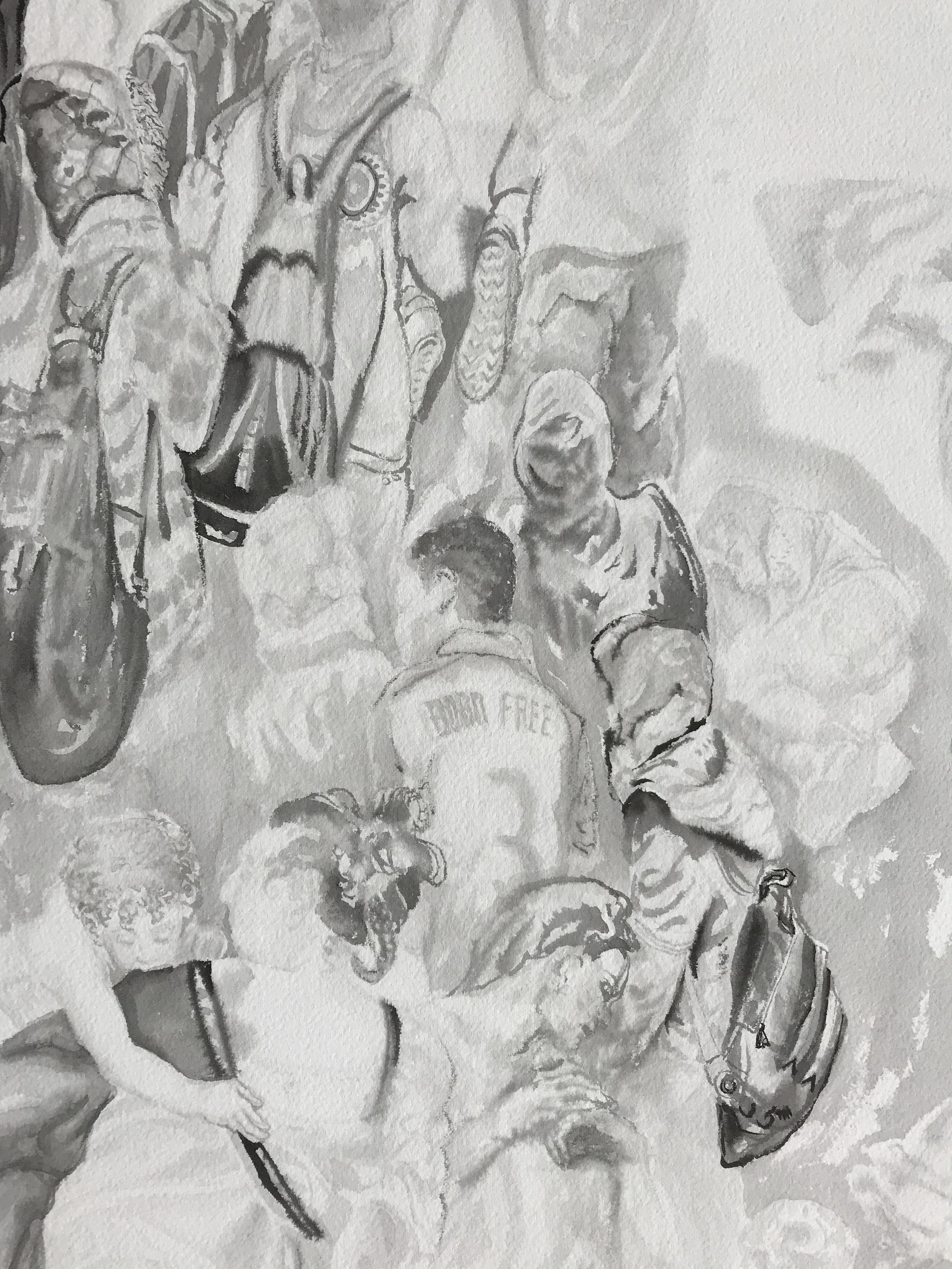
Detail of ASCENSION, 2017
Ink